May 2nd 2023

Oil and gas giant BP has reported strong profits for the beginning of the year as energy prices remain high.
Profits hit $5bn (£4bn) in the first three months of the year, although this was down from $6.2bn last year with oil prices having fallen from the peak seen after Russia’s invasion of Ukraine.
Bumper profits from energy firms have led to calls for them to pay more tax with households facing high bills.
Labour and the Liberal Democrats called for changes to the windfall tax.
Labour leader Sir Keir Starmer called for a “proper” windfall tax on energy profits.
“Of course we want BP and others to make profits so they can invest but these are profits that they didn’t expect to make, these are profits that are over and above because the world price of energy is so high,” he told BBC Breakfast.
Liberal Democrat leader Ed Davey said: “These eye-watering profits are a kick in the teeth for all those struggling to pay their energy bills.”
He added that the government had “let oil and gas giants off the hook for billions of pounds while people and businesses struggle to pay for their gas and electricity”.’
A Treasury spokesperson said: “Through the Energy Profits Levy we are ensuring excess energy profits… are being used to ease the pressure on families up and down the country.
“These funds are being used to hold down people’s energy bills and fund one of the most generous cost of living packages in the world- worth £94bn which is around £3,300 per household this year and last.”
BP reported record annual profits last year as the company – along with the rest of the energy sector – benefitted from the surge in oil and gas prices following Russia’s invasion of Ukraine.
It has led to big profits for energy companies, but also fuelled a rise in energy bills for households and businesses.
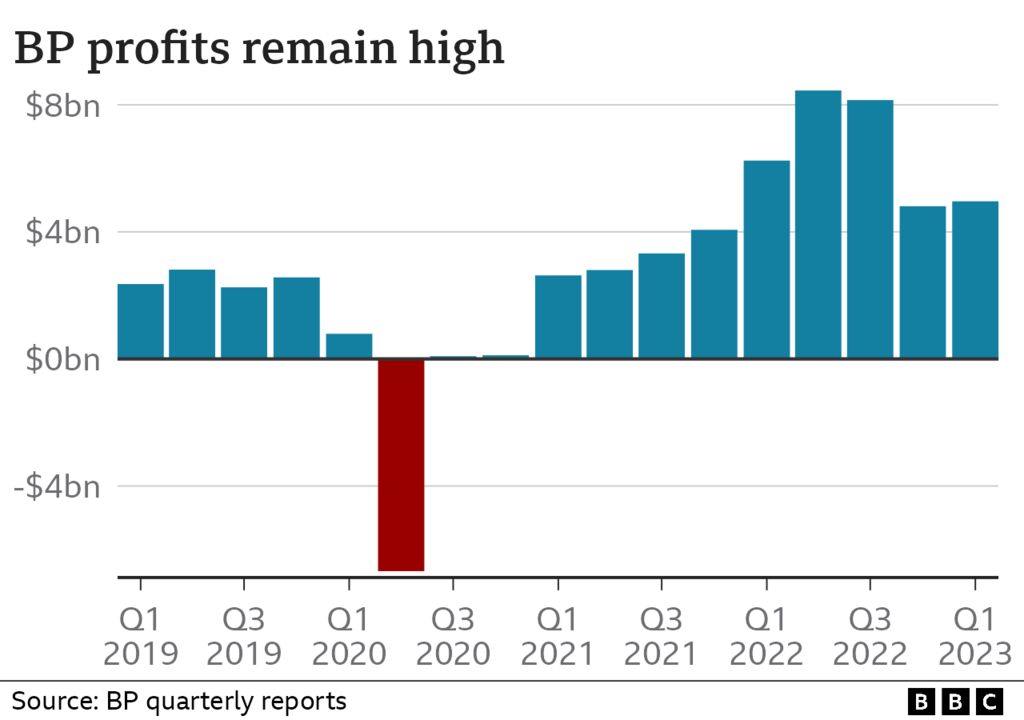
BP chief executive Bernard Looney said the first quarter had been one of “strong performance”.
The company said it had seen an “exceptional” performance from gas marketing and trading, and “very strong oil trading”.
Nick Butler, a former BP executive and visiting professor at King’s College London, said the strong results had come “from a good internal business performance but also from high prices around the world”.
But he told the BBC’s Today programme the firm’s profits were likely to “come down quite a lot this year” as oil and gas prices were falling back.
- BP faces green protest over new climate goals
- Father challenges BP at meeting after son’s death
- BP chief’s annual pay more than doubles to £10m
Last year, the UK government introduced a windfall tax on profits made from extracting UK oil and gas – called the Energy Profits Levy (EPL) – to help fund its scheme to lower gas and electricity bills.
The EPL is set at 35%, and together with existing taxes on oil and gas companies takes the total UK tax rate to 75%. However, companies are able to reduce the amount of tax they pay by factoring in losses or investment in their UK oil and gas business.
The vast majority of BP’s profits are earned outside the UK and are therefore not covered by the EPL.
In the first three months of 2023, the company paid $3.4bn in tax globally and $650m in the UK – with about $300m due to the EPL. BP says it has now paid an extra $1bn in tax since the EPL was introduced.
Wholesale gas prices have been falling, which has raised hopes that household bills will start to come down this summer.
The price of Brent crude oil has also fallen back to around $80 a barrel from highs of nearly $128 following the invasion of Ukraine.
But BP said oil and European gas prices would remain higher than usual in the three months to the end of June.
Under the government’s Energy Price Guarantee, energy bills for a typical household have been limited to £2,500 a year, although this level of support is due to stop at the end of June.
However, experts think that bills will fall below this level in July due to falling wholesale costs. This would make the price guarantee redundant.
Emissions protest
BP has also come under fire after it said earlier this year that it would cut back its target to reduce emissions by the end of the decade.
Last week, at the company’s annual general meeting, some of the UK’s biggest pension funds voted against reappointing BP’s chairman, Helge Lund, in protest at the decision.
BP said last week that it valued “constructive challenge and engagement”.
In response to BP’s latest results, Charlie Kronick, from environmental pressure group Greenpeace, said: “It’s time for the government to step in and force BP – and the rest of the oil industry – to start paying for the damage they’re causing to the climate and use the money to address the devastating climate impacts already being experienced around the world.”
Related Topics
Profits of War & Mass Misery In Fake Ukraine War For Democracy.
- BP faces green protest over new climate goals
- 4 days ago
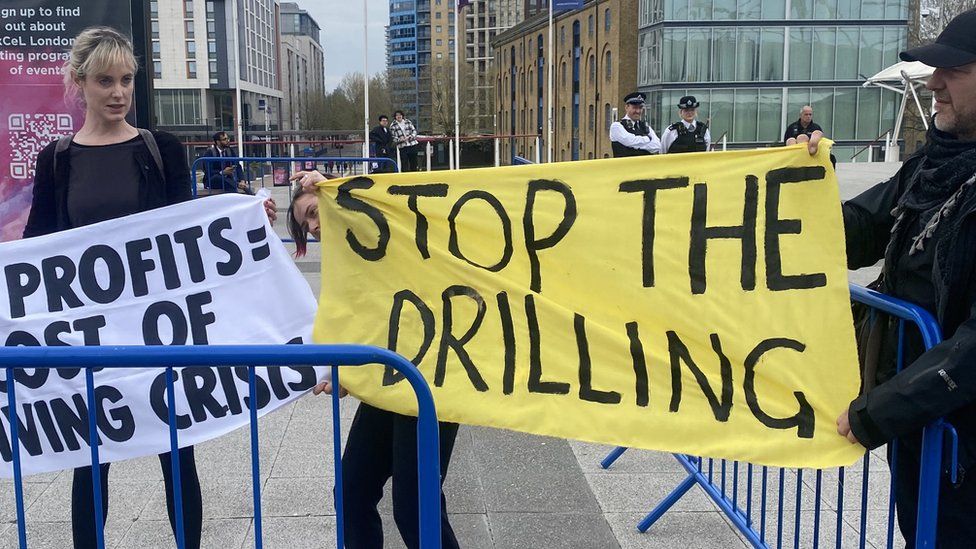
- Father challenges BP at meeting after son’s death
- 4 days ago

- BP chief’s annual pay more than doubles to £10m
- 10 March
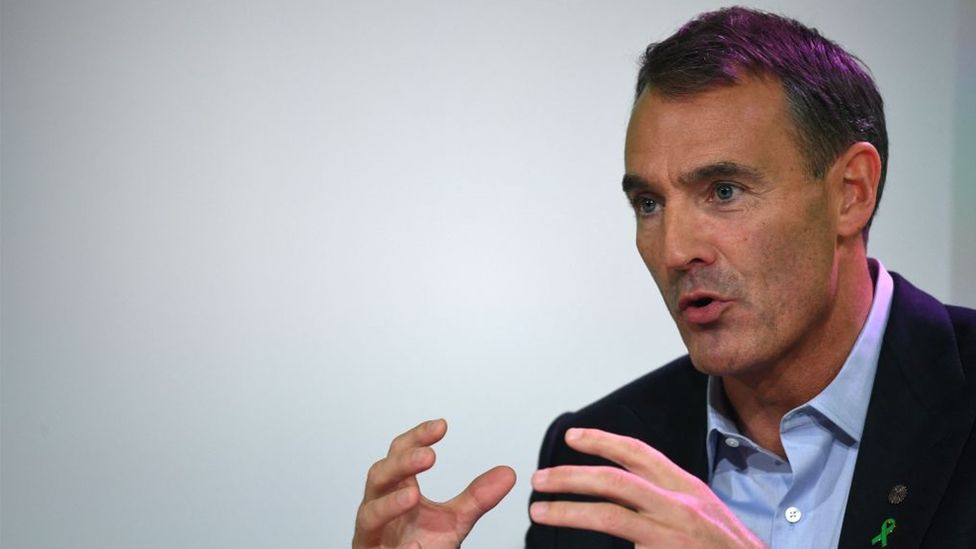
- How much windfall tax are oil giants paying?
- 1 hour ago

- BP scales back climate targets as profits hit record
- 7 February

U.K Haven For Police Liars & Abusers – Vile System Rotten From Top To Bottom. By R J Cook

This is normal practice for senior police. It is not just the Metropolitan Police who are institutionally corrupt at the top, the police fish rotting from the head down. The ‘met’s new head is an old hand, out of retirement where he enjoyed another lucrative career to top up his massive pension.
Now the police is a graduate career, with in house cops seconded to university, cops have a dubious veneer of professionalism masking the opportunism, brutality, abuse, malpractice, misconduct d and lies. Misogyny in the police is more to do with women’s bitterness when they don’t get promotions and associated pay increases they believe they deserve. But sexual perverts and weirdos are there displaying the kind of ‘machismo’ promoting ‘big beast’ officers admire. Like recruits like. Officers whose faces and honesty do not fit their warped conspiratorial business model are hounded out , like Cleveland’s Chief Constable Sue Sim. Here in my North Buckinghamshire home town, a young constable was sacked because he began a relationship with a female he had met during a domestic violence situation.
The Met’s new boss blames the police’s dubious complaints process which dismisses as many complaints that it can get away with – particularly when complaints are made against senior officers- for not giving Chief Constables power to over rule employment tribunals. He wants more powers to dispose of police misfits – the honest ones committed to justice and fair play. The case of a senior, £100,000 a year sex addict cop , living out his fantasies with high class prostitutes, is definitive and damning. This is because it was hushed up for 3 years, his name is still secret and he has kept his lucrative job. That is the U.K police mindset which has historically destroyed reputations, jailed and hung the innocent , like Timothy Evans. This police state is getting ever more dangerous for honest decent people.
R J Cook
British Royalty Are Not As Stupid As They Might Look
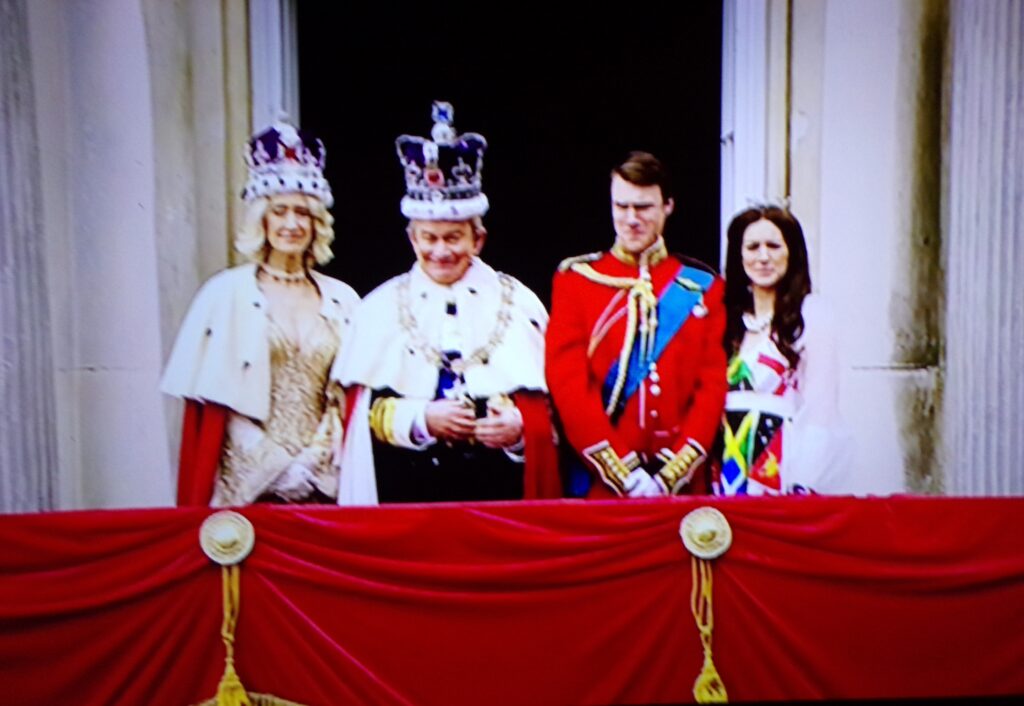
| UK republicans eye coronation to rally support Republicans have long been a fringe group in Britain. But their voices have been getting louder since the death of Queen Elizabeth II last year. |
| G7 should adopt ‘risk-based’ AI regulation, ministers say EU lawmakers on Thursday reached a preliminary agreement on a new draft of its upcoming AI Act. |
| Â |
| UK widens evacuation from Sudan with extra flight Some 2,000 Britons in Sudan had signed on to a Foreign Office list, and anyone eligible was given until early Saturday to reach the airfield. |
| Investments, inheritance leave Charles III sitting on a fortune The monarch’s will is not made public in the UK, meaning the content of Queen Elizabeth II’s will remains private. |
May 1st 2023
EXCLUSIVE: High-ranking Met Police officer on £100,000-a-year who was found to be a regular user of ‘high-class’ prostitutes was allowed to keep his job after he was let off with a minor rebuke
- High-ranking officer was given minor rebuke after his sex shame was discovered
- The handling of the case was in sharp contrast to the treatment of junior officers
By Stephen Wright Associate Editor For The Daily Mail
Published: 19:03, 1 May 2023 | Updated: 20:18, 1 May 2023
A SENIOR cop was allowed to keep his job despite using prostitutes, it was revealed.
Payments of hundreds of pounds to sex workers were uncovered when anti-corruption officers seized his phone over an unrelated matter which was later dropped.

But instead of going before a gross misconduct board where he could have been sacked, he was given “words of advice”.
The soft treatment is in contrast to how junior officers are routinely sacked if found to be using prostitutes.
The top cop is still working for the Met on a salary of more than £100,000 a year.
Details have never been made public despite first surfacing three years ago.
READ MORE ON MET POLICE

Met cop sacked from force after sexually assaulting colleague on night out

Met cops sacked after sharing ‘toxic’ messages mocking Katie Price’s son Harvey
And the scandal is likely to undermine new commissioner Sir Mark Rowley’s current clampdown on rogue cops.
A source told The Sun: “This officer should never have been allowed to stay.
“He was notorious for coming on to women and had treatment for sex addiction. This blows a massive hole in the commissioner’s war on wrong ’uns.”
Ex-Met chief superintendent Phil Flower told the Daily Mail: “It is extremely surprising that a more robust decision was not taken in this matter.
Most read in The Sun
CAVE TRAGEDY Dad who got trapped inside indoor adventure centre cave dies from his injuries
TV CHEF DEAD Brit MasterChef Australia host dies aged 46 as Gordon Ramsay leads tributes
ROCK & RULE First look at Britain’s biggest EVER stage for King Charles’ coronation concert
GET OUTTA HERE Two campmates are faking it in I’m A Celeb, hints Shaun Ryder after eviction
“It should have gone to a misconduct board which, if properly informed, would have imposed a much more significant penalty.”
April 28th 2023
King Charles III Of The British Commonwealth ! by R J Cook

King Charles III Of The British Commonwealth ! by R J Cook
I used to have a lot of respect for the monarchy. My father and all of my eight uncles were soldiers, my Uncle Charles Close being killed while serving with the London Irish Riffles. My Great Grandfather William and my Great Uncle Tom Cripps were in World War One. My mother lost her RAF aircrew boyfriend in World War Two.
I grew up in the aftermath and remember the London bomb sites on visits to family in the early 1950s. Most of my immediate family were London born, including my parents and sister. My German cousin lived there too, so there were awkward moments when we played war games because I had been led to believe Germans were the bad guys. I even joined the Air Training Corps which fed patriotic kids like me en route to the air force.
Over the years, I gained academic qualifications in the 1960s and 70s , spent 18 years as a school teacher and college lecturer. Three years at the radical University of East Anglia against the backdrop of the Vietnam War, dulled my appetite for flag waving jingoism. I met interesting people of all ages, along my way, who dulled my appetite for the glories of war. As a college lecturer, I upset mature students who came to my political history lectures because they were mired in past glories of Britain and the Empire. Empires are built ,consolidated and maintained by violence and lies.
So we come to the Coronation of Charles III. I admit to certain feminine inclinations, so found comfort in our glamorous symbolic ethereal dearly departed Queen. But she was an illusion, unintentionally evaporated,, in my view, by the narcissistic antics of Princess Diana as an outcome of her husband’s affair with Camilla Parker Bowles, now his Queen.

I am old enough to remember the apparently accidentally hacking by scanner of Prince Charles’s mobile when he passionately told Camilla he would like to be her Tampax. Sex wouldn’t work without a little fantasy, but that was an odd one. More importantly it told where Charles’s heart and interest lay. It was a sign of the age old Royal history of philandering hypocrisy. Princess Diana had rather more lovers and a very enigmatic death.
Her son Harry has courted controversy further discrediting the monarchy. However none compare with the Queen paying £12 million to silence a woman who accused Prince Andrew of using her for sex so rough he left her bleeding. She was underage at the time and trafficked by Andrew’s close female friend Ghislane Maxwell.
Prince Charles, now worth £1.8 billion, was a Tory and media target in the 1980s because of outspoken views on the damage Thatcher’s gang in government were doing to the nation’s social and economic fabric. He was pilloried for neglecting her in favour of his trysts with his old sweetheart whose husband he had been cuckolding for years , the now Queen Camilla.

On a wider front, mass immigration from Africa is overwhelming the indigenous population. The liberal white chattering classes have alienated many of the natives while persuading the West Indians they are actually Africans and should identify accordingly. Those same liberals try to curry favour with this enlarged black population by blaming the white masses for the slavery that the British elite, topped off by Royalty, benefited from and were enriched by. Meanwhile they treated their own underclass like scum fit only for cannon fodder in Imperial Wars like World Wars One and Two.
Too many of us now see this all for what it is. The oft mentioned word ‘democracy’ is not compatible’ with monarchy and levelling up.
All of King Charles’s past sins are forgotten like the so called Traitor King Edward VIII, who when his simple minded elder brother was shut away in the 1920s, was arrested by a policeman when he and gay musical genius Noel Coward were found on London backstreets dressed and made up as women- a criminal offence at the time because legally it implied homosexuality. But Royalty would never have produced such large families if they hadn’t enjoyed a lot of sex. Edward VII’s nickname was ‘Tum Tum’ because he enjoyed 9 course dinners – see Isle of Wight,Wish You Were Here’ by Robert Cook. His wife, Queen Alexandra was said to have enjoyed 200 lovers.
Post World War Two, Royalty faced increasing scrutiny,mockery and irreverence. Backwaters like Northern Ireland cling to it as essential to their identity. Over the border, Republicanism appeared to win the day but the ties are not quite cut in spite of Brexit. Here on the mainland, the elite, many part of the old nobility hope a revived slimline monarchy will pull this Disunited Kingdom together.
Most mainstream politicians and old soldiers love the pomp. It is essential to politicians and the whole elite, to promote football for females,with the national team promoted as role models – and the Captain a ‘universal hero.’ It is not exactly super glue we are talking about holding it ‘together’.

‘Respect for women’ is the latest priority diverting attention from the so called ‘cost of living crisis’ which is actually a ‘cost of the war on Russia crisis. The masses must never make connections. The Coronation is going to be a giant militaristic jingoistic parade led by gold braided medal wearing war mongers. There will be guns a plenty, jangling trotting horses, with men marching to the stirring sounds of a military band. Well rehearsed and most expensive, it will be a perfect history book cover for the reign of another disastrous King Charles. NATO’s proxy war on Russia could not have come at a better time.

R J Cook
Rents hit fresh high as lack of homes available continues

By Nick Edser
Business reporter
Average rents have continued to hit new highs, according to property website Rightmove, as the shortage of available properties continues.
Asking rents outside London have reached a record of £1,190 a month on average, Rightmove said, while in London they have risen above £2,500.
Rents have been pushed up by fierce competition among tenants chasing a limited number of homes to rent.
Rightmove said there were signs of more properties coming on to the market.
However, while the number of properties available to rent between January and March was up 8% from a year earlier, the number was still nearly half that seen in 2019.
The gap between the number of tenants seeking properties and the homes available to rent also narrowed, Rightmove said, but it still remained “near record levels”.
It added that average asking rents for new tenants outside London have now risen for 13 consecutive quarters.
“We have seen some early signs of improvement on squeezed supply levels this year, though with no significant influx of new properties becoming available to rent currently on the horizon, the mismatch is set to continue for some time,” said Tim Bannister from Rightmove.
“Many agents are having to manage a very high volume of tenant enquiries for every property that they let in the current market.”

What are your renting rights?
- How much can my landlord increase the rent? It depends on your agreement but rises must be fair, realistic and in line with local properties and there’s usually a month’s notice.
- Can my landlord evict me? Landlords need to follow strict rules such as giving written notice. Once the notice period ends, the landlord can start eviction proceedings through court.
- Can a landlord refuse people on benefits? No. DSS policies are unlawful discrimination, says charity Shelter. Some councils have lists of private landlords who rent to tenants claiming benefits.
There’s more on your renting rights and where to go for help here.
April 26th 2023

Why Should People Be Respected Just Because They Are Women ?
By R J Cook
Afro Caribbeans are renowned for demanding ‘respect.’ Many Black people are experiencing today’s events while remembering the childhood stories they heard from their parents or grandparents about a child, sibling, spouse, or friend who died during the Spanish Flu. Others are recalling family traditions attributed to surviving the Great Depression.
The American tradition of the family heading out to the open road for a summer vacation has also had a resurgence due to the COVID-19 pandemic (Mzezewa, 2020). However for many Black people, road trips serve as a reminder of times when driving south to visit relatives meant being fearful of what danger you might encounter from the police, while driving to your destination, or local Whites who did not want you stopping in their town to get food, gas, use the restroom, or spend the night (Mzezewa, 2020).
For others, such as activists during the Civil Rights Movement of the 1950s and 1960s, the Black Lives Matter (BLM) movement is invigorating. Representative John Lewis, inspired by protesters and supportive of the movement said, “We must use our time and our space on this little planet that we call Earth to make a lasting contribution, to leave it a little better than we found it, and now that need is greater than ever before” (Capehart, 2020, para 13).
Here is an extract from the (1920) Declaration of the Rights of the Negro Peoples of the World
Preamble
Be It Resolved, That the Negro people of the world, through their chosen representatives in convention assembled in Liberty Hall, in the City of New York and United States of America, from August 1 to August 31, in the year of Our Lord one thousand nine hundred and twenty, protest against the wrongs and injustices they are suffering at the hands of their white brethren, and state what they deem their fair and just rights, as well as the treatment they propose to demand of all men in the future.
We complain:
- That nowhere in the world, with few exceptions, are black men accorded equal treatment with white men, although in the same situation and circumstances, but, on the contrary, are discriminated against and denied the common rights due to human beings for no other reason than their race and colour.
We are not willingly accepted as guests in the public hotels and inns of the world for no other reason than our race and colour.
Now we have feminists jumping on the ‘Respect’ band wagon. Labour Party leader Sir Kier Starmer intends to make ‘respect for women’ an educational priority,as the Mail newspaper and on line reported : Holly Willoughby reveals she is teaching her sons Harry and Chester to respect women ‘from the get-go’ as Labour’s Keir Starmer tells This Morning that schoolboys should get behaviour classes at school to cut level of sexual violence and harassment
- The host of ITV’s This Morning, 42, made the revelation on the programme today
- She has has two sons, Chester, 13, and Harry, 8, as well as a daughter, Belle, 12,
By David Wilcock, Deputy Political Editor For Mailonline
Published: 13:54, 25 April 2023 | Updated: 14:01, 25 April 2023
Holly Willoughby is teaching her sons to be respectful towards women from the ‘get-go’ she revealed today.
The host of ITV‘s This Morning, 42, made the revelation as she and co-presenter Phillip Schofield grilled Labour leader Sir Keir Starmer about cutting violence against women and girls (vawg).
Labour has said that if it takes power it would introduce school classes to teach boys how to behave around women, as part of a major push to tackle sexual violence and harassment.
Clearly the feminist movement with media and political acolytes are placing themselves alongside black people as victims of violent aggressive bullying white males. The intention is to target school boys from the youngest ages to be be lectured about their natural inclination to abuse , humiliate and exploit females starting with classmates.
There are several fundamental assumptions and issues that need addressing here. To greet schoolchildren in an multi cultural school where at least one third of children grow up in mother only familes, class , material, ethnic, and religious differences make assumptions that gender differences are key issues, is absurd.
Consequences of challenging schoolboys as if they are automatically guilty of or will be without patronising school help will inevitably encourage some boys to denounce their heterosexuality out of fear of punishment or guilt. Worse still for feminists and other transphobes ,more boys will want to be girls – some ending up as victims of killers like Brianna Ghey or police harassment like myself -even being subject to a 7 officer dawn raid by Thames Valley Police,facing , among other charges, prostitution working for my son and his gangster associates and disseminating porn images without a shred of evidence or whiff ofi investigation. They progressed to malicious prosecution and telling my GP I was insane with a long history of alcohol abuse and violence.
Police, as sociologists William H Whyte and Robert K Merton adduced,are perspectivist thinkers – i.e. apart from their natural tendency to lie, fabricate and withhold evidence to achieve a high self glorifying conviction rate, they cannot think outside of the box. They operate on social prejudice based on class,race and gender. Their favoured suspects are male, preferably white and or working class. Females are not high on their list except for lewd comments and male officer porn groups. The police attracts aggressive feminist lesbians who complain of misogyny , often when they don’t get the promotions they feel entitled to. When they get that positive discrimination to tell underlings what to do, many officers resent them. If any good honest female officer gets to the top, like Chief Constable Sue Sim, senior officers regardless of gender , ensure they will be isolated . Police favour the mindless super testosterone males and many women enjoy relationships with these moronic beasts in uniform. PC Wayne Couzens was an extreme example, affectionately known among his front line colleagues as ‘The Rapist.’ His flashing appears to have been an in house source of humour until he raped and strangled young Sarah Everard. That led to a female Green Peer blaming all men ( presumably excepting Kier Starmer ) :
“Green Party peer says ALL MEN should face 6pm CURFEW: Baroness Jones calls for ban on males after dark to ‘make women feel safer and lessen discrimination’ as women share their fears of violence in wake of Sarah Everard murder
- The peer spoke in a debate in the House of Lords on domestic violence
- Her calls for a curfew echoed those made during 1970s Reclaim The Night rallies
- Jones said her solution was ‘better than the Met telling women to stay indoors’
By David Wilcock, Whitehall Correspondent For Mailonline and Jack Elsom For Mailonline
Published: 12:08, 11 March 2021 | Updated: 18:29, 11 March 2021
42k shares
Men should be banned from being outdoors after 6pm to ‘make women a lot safer’ after the abduction and suspected murder of Sarah Everard in London, a Green Party peer has suggested.
Baroness Jones made the comment in a discussion in the House of Lords during a debate on domestic violence.
The issue of women’s safety has been again thrust into the spotlight following the disappearance of 33-year-old Ms Everard as she walked home to Brixton from her friend’s home in Clapham, south-west London, on March 3.”
The fact that Sarah’s killer was no ordinary man, her killer was a POLICEMAN. That means by Jones logic all policemen should be on curfew by 6pm. As far as the Kier Starmers of this world are concerned all women are a biological blob and voting fodder. Like Adolph Hitler, Starmer one time head of the the corrupt Crown Prosecution Service which routinely withheld evidence in order to convict innocent men of offences against women, needs a scapegoat to get votes. He doesn’t take a stand on the current ‘cost of war crisis’. In today’s House of Commons Prime Ministers Question Time, both Starmer and ‘ Blowing in the Wind’ Prime Minister Sunak have said that they know ‘what a woman is.’ It’s their sign of war on transsexuals , Starmer in tune with the feminists. Starmer is the same,with the added factor of his strict adherence to his Hindhu complicates his position. Women are worshipped in Indian culture because fertility is paramount.
However,In Hindu belief, deities can take many forms, but all combine in the universal spirit of Brahman. Unlike Judaism, Christianity and Islam, which focus on the actions of a single lifetime, Hindu belief centres on a continuous process of birth and rebirth that ultimately releases the true self from the limitations of body and the ego – a freeing of the spirit called moksha. That process includes a release from sensual experiences, including sexuality. Hindu sacred texts, however, do not distinguish between heterosexual and homosexual acts. While Hindu sacred texts do not specifically use those terms (heterosexual and homosexual), they do distinguish between procreative sexual acts (within marriage) and non-procreative sexual acts such as oral, etc. The latter are explicitly discouraged not for the common man but for Brahmanas and priests.
Whatever the causes of transsexualism, the current explosion of candidates including the masculine appearance and aggressive behaviour of many women,especially radical feminists, political leaders and their feminist acolytes playing to the voting gallery, will make a bad situation so much worse. As far as this essay is concerned, it is just another example of officialdom vilifying males, especially white men who ,unlike blacks, must accept being privileged. By the same process all females are sanctified. They must all be seen as victims. If they do wrong, the law and media rush to find a male in her life who made her that way. According to all the myths, women are naturally pure,innocent in thought and action, offering sex as service,never lying about rape or domestic violence. Women deplore violence. killer ,only lying because they are forced to.
The shocking allegations, in which Letby, 33, is accused of murdering seven newborns and attempting to kill 10 more by injecting them with air, milk, or insulin at the Countess of Chester Hospital between 2015 and 2016, sent shock waves throughout England and across the globe. Letby has pleaded not guilty to 22 charges.
She is a woman and ‘women deserve respect.’ The woman who destroyed three mens lives with multiple rape and grooming allegations, almost got away with it – the accused placed on remand and a situation they will never get over.
Giving boys lessons on respecting girls is cultural arrogance, with political correctness marching society off a cliff. Biological women face increasing suicide rates, loneliness because as a work colleague told me in 2008,’Women, you can’t live with them and you can’t live without them. As far as I am concerned,transsexuals definitions are, based on history and chromosomes not prejudice .Chromosomes aren’t always a clue to gender, or sex as we used to say Most males have XY chromosomes and most women have XX chromosomes. But there are girls and women who have XY chromosomes. This can happen, for example, when a girl has androgen insensitivity syndrome. And there are boys and men who have XX chromosomes.
Because Britain leads the world in bigotry and hypocrisy packaged as liberal diversity,feminists dominate politics and media. They sell a puritanical innocent image of always suffering abused woman, never the temptress or liar. Lazy stupid women lap it up. They are a far cry from the hard working female role models I grew up with. They demand respect just because they are women. As far as I am concerned people, not women deserve respect. This ideology of human rights is just another pseudo liberal con trick where the ruling elite decides what rights the common people can have and when or when not they can have them.

The only way they can manage this sham democracy is through gimmicks like ‘lessons on respecting girls and women.’ In this way they won’t ask questions about ludicrous lockdown, who pays for mass immigration , who benefits from it, who pays for the NHS, who benefits , and what is the Anglo- U.S led NATO proxy war all about and who is paying ? The answer to the last question is treated like a state secret or ‘conspiracy theory’ because it us common people through taxes and higher prices to keep the elite, big business and arms manufacturers in ever more opulent hedonistic life styles.
All the masses get is bread and circuses with football worship aimed now at girls in school. The England and Arsenal female captain Leah Williamson from Milton Keynes has been hailed as a universal hero ( not heroine) for coping with her injuries. She deserves RESPECT. Journalist and feminist goddess Polly Toynbee is depressed because she argues we are now ruled by two men, Sunak and King Charles. No dear,we are still ruled by the people with money as has been the case since money was invented. The reality is that that the moneyed minority has no respect for the lower orders.
Starmer has said that the reasons he wants to use school to instil respect for women is because he wants to fix ‘toxic masculinity’ in boys. They excel at dividing and fooling people. Women’s equality has been replaced by a mantra of victimhood with ongoing war for empowerment over the little men in the world around them. Women will use any weapon to hand, including lying, which they will use like mascara. Respect should not be their right any more than it should be a man’s or black persons. To enforce lessons in respecting females via the school curriculum assumes innate male evil betokening neurosis ,mental illness and resentment. These people like Starmer and Sunak hopping on this evil hate filled bandwagon deserve no respect as far as I am concerned. The very concept is just another vile aspect of our inherently unjust, evil totalitarian police state.

R J Cook
April 25th 2023
Defence Committee inquiry to probe UK’s readiness for war
24 April 2023

Today the Defence Committee launches a new inquiry into the Armed Forces’ combat readiness for operations and warfighting.
This inquiry will examine a range of factors influencing combat readiness, including supplies and stockpiles and regular and reserve force numbers. Logistics and military planning will also be covered, as well as the expectation of collaboration with allies and defence partners.
The Committee is asking for written evidence submissions by Monday 5 June 2023.
Chair’s comments
Chair of the Defence Committee, Tobias Ellwood MP, said:
“In an increasingly unpredictable and volatile world, our Armed Forces need the ability to respond to crises at a moment’s notice. Maintaining robust combat readiness isn’t just a matter for active wartime – readiness is a vital deterrent against future conflict.
From the cuts to boots on the ground, to a decrease in real terms funding and potential capability gaps on the horizon, concern around our ability to respond to provocation is understandably high. Even the Secretary of State for Defence himself has described the British Army as ‘hollowed out’, and there have been suggestions that the United States no longer view us as a top tier fighting force.
The world is becoming more dangerous, not less. In this inquiry we will examine the UK’s current state of combat readiness – both our strengths and potential weaknesses.
Our Service personnel are amongst the most skilled and highly trained in the world and this inquiry will ask what impact cuts to numbers and funding may have on their ability to respond to new or escalating conflicts.
We’ll also ask how the UK Government can address any shortfalls and which gaps must be given urgency.”
Terms of reference
The Committee welcomes written evidence on the following:
- Are the armed forces sufficiently capable, resourced and ready to protect the UK and our allies?
- What are the main gaps in capability and/or readiness, and what will it take to fill these gaps?
- Are the UK armed forces a ‘tier one fighting force’? Do they need to be?
- What are the consequences of the army having been “hollowed out and underfunded”? Which of these consequences needs to be addressed most urgently?
- Are the Government’s plans sufficient to address any shortfalls?
Further information
Comment The Great British Public in Grear Britain , mother of democracy with the mother of parliaments ( sic ), have no idea what they are sleepwalking into. This is also the country that invented football. Yesterday’s BBC sports news spent 15 minutes agonising and recriminating over the fact that there is only one black premier league manager which proves racism. There was , however joy that 43% of Premier League Players are black, but we ‘must go further to defeat racism.’ I will let those facts speak for themselves. My point here that we don’t get any such agonising over NATO’s proxy war on Russia on the pretext of defending the incestuous Anglo U.S superior ‘values.’ To the masses this war, once again with real killing for benefit of the global rich, is just another sport. The west are good, Russia is evil. Meanwhile we have a generation at school children being educated into such crucial areas of life as teaching boys to have more respect forwomen and girls. Opposition Labour leader and former head of the corrupt target driven Crown Prosecution Service , is on the case, making it an election priority.
R J Cook
April 24th 2023

James Bowes unpacks the latest census and EU Settlement Scheme data to explore the diversity of the EU national population in the UK, showing that during the UK’s membership of the EU freedom of movement was a major driver of immigration to the UK of people born outside of the EU.
During the recent debate on Albanian migration to the United Kingdom, Albanian Prime Minister Edi Rama made an interesting point. 70% of Albanian immigrants to the UK were previously living not in Albania. Instead, they were living in Greece and Italy.
Albanians are far from a special case. There are roughly one million people living in the UK under EU freedom of movement rules, who were born outside of the EU.
According to the 2021 census, there are 581,027 EU nationals living in England and Wales who were born outside of the EU. This represents 15% of all EU nationals living in England and Wales. This excludes people born in the United Kingdom and EFTA. The census has not yet released the figures for Scotland and Northern Ireland.
According to the EU Settlement Scheme statistics, there are 411,570 non-European Economic Area (EEA) nationals with the right to live in the UK as family members of EU or European Free Trade Association (EFTA) nationals, although not all are necessarily still resident here. 150,280 non-EEA nationals have settled status. 298,290 have been awarded pre-settled status. 37,000 of the people with pre-settled status have since obtained settled status.
| Nationality | Number of people born outside of the EU |
| Portugal | 123,004 |
| Italy | 110,847 |
| Spain | 69,905 |
| Romania | 52,511 |
| Ireland | 30,953 |
| France | 29,822 |
| Germany | 26,170 |
| Poland | 9,655 |
| Lithuania | 5,144 |
| Other EU countries | 123,016 |
| Total | 581,027 |
Table 1: Number of people born outside of the EU/EFTA by EU nationality
The most common EU nationalities for people born outside of the EU are Portuguese, Italian and Spanish. People with these three nationalities make up the majority of EU nationals born outside of the EU. The census haven’t released a full breakdown by nationality, but the number of Dutch nationals born outside of the EU is also likely to be significant.
Portuguese is the most common EU nationality for people born outside of the EU because Portugal grants citizenship to many people born in former colonies. Latin Americans and Filipinos living in Spain are eligible for citizenship after just two years.
Some EU member states allow people with an ancestor born in that country to claim citizenship. Countries that allow citizenship via ancestry include Italy, Ireland and Portugal. The number of Romanian nationals born outside of the EU is high because Moldovans are eligible for Romanian citizenship.
Another reason many EU nationals are born outside of the EU is secondary migration. Secondary migration is when people move as immigrants to one country, gain citizenship of that country and then move to another country. There has been a lot of secondary migration from Italy and Spain to the UK since the Euro crisis.
| Continent of birth | EU nationals | Non-EEA family members | Total |
| Africa | 157,127 | 88,643 | 245,770 |
| Americas | 113,218 | 68,848 | 182,066 |
| Asia | 201,667 | 190,461 | 392,128 |
| Europe (excluding EU/EFTA) | 101,718 | 59,227 | 160,945 |
| Oceania and Antarctica | 7,295 | 3,316 | 10,611 |
| Unknown | 2 | 1,075 | 1,077 |
| Total | 581,027 | 411,570 | 992,597 |
Table 2: Continent of birth of EU nationals born outside of the EU and non-EEA family members.
| Country of birth | EU nationals | Non-EEA family members | Total |
| India | 72,921 | 70,097 | 143,018 |
| Pakistan | 36,968 | 61,047 | 98,015 |
| Brazil | 38,289 | 41,022 | 79,311 |
| Moldova | 45,437 | 8,206 | 53,643 |
| Bangladesh | 22,413 | 25,355 | 47,768 |
| Albania | 20,425 | 26,255 | 46,680 |
| Nigeria | 21,793 | 23,014 | 44,807 |
| Ghana | 18,236 | 23,764 | 42,000 |
| South Africa | 21,614 | 5,737 | 27,351 |
| Ukraine | 10,005 | 11,810 | 21,815 |
| Somalia | 15,730 | 5,553 | 21,283 |
| United States | 12,072 | 7,135 | 19,207 |
| Sri Lanka | 11,094 | 4,531 | 15,625 |
| Colombia | 11,008 | 3,734 | 14,742 |
| Venezuela | 10,761 | 2,914 | 13,675 |
| Russia | 8,265 | 4,573 | 12,838 |
| Ecuador | 10,107 | 1,813 | 11,920 |
| Morocco | 6,963 | 4,223 | 11,186 |
| Angola | 9,986 | 586 | 10,572 |
| Afghanistan | 5,972 | 3,457 | 9,429 |
Table 3: Top twenty countries of birth of EU nationals born outside of the EU and non-EEA family members
There is a close correlation between the number of EU nationals born in a country and the nationality of non-EEA family members of EEA nationals. The numbers of EEA family members here have been slightly adjusted to avoid double counting people that have received both settled and pre-settled status.
The most common non-EU country of birth for EU nationals is India. The most common EU nationality for people born in India is Portuguese. This is because Goa, Daman and Diu were Portuguese colonies. 55,788 Portuguese nationals currently resident in the UK were born in India.
People born in Brazil and South Africa are most likely to have EU citizenship via ancestry. Italian is the most common EU citizenship for people born in Brazil, followed by Portuguese. Irish and Portuguese are the most common EU citizenships for people born in South Africa.
There has been a lot of secondary migration to the UK of Italian nationals born in Commonwealth countries. Italian is the most commonly held citizenship for EU nationals born in Pakistan, Bangladesh, Ghana and Nigeria. It is the second most common EU nationality for people born in India. There are also significant numbers of Spanish nationals born in Pakistan and Irish nationals born in Nigeria.
| Region | Settled status applications from non-EEA nationals |
| London | 239,610 |
| North West | 58,930 |
| South East | 53,130 |
| West Midlands | 52,090 |
| East Midlands | 40,430 |
| East of England | 35,900 |
| South West | 21,620 |
| Yorkshire and the Humber | 21,280 |
| Scotland | 14,050 |
| Northern Ireland | 7,650 |
| North East | 4,330 |
| Wales | 4,030 |
| Total | 553,050 |
Table 4: Number of settled status applications by non-EEA nationals by region
| Local Authority | Settled status applications from non-EEA nationals |
| Brent | 19,940 |
| Newham | 19,050 |
| Ealing | 15,980 |
| Hounslow | 14,440 |
| Redbridge | 10,630 |
| Haringey | 9,910 |
| Tower Hamlets | 9,590 |
| Croydon | 9,330 |
| Lambeth | 9,030 |
| Southwark | 8,890 |
Table 5: Number of settled status applications by non-EEA nationals by top ten local authorities in London
| Local Authority | Settled status applications from non-EEA nationals |
| Leicester | 21,240 |
| Birmingham | 18,570 |
| Manchester | 17,680 |
| Sandwell | 8,150 |
| Swindon | 7,340 |
| Luton | 7,300 |
| Bolton | 6,560 |
| Wolverhampton | 6,290 |
| Leeds | 5,970 |
| Coventry | 5,010 |
Table 6: Number of settled status applications by non-EEA nationals by top ten local authorities outside of London
The census data doesn’t allow a full break down of how many EU nationals born outside of the EU live in each local authority. However, the EU Settled Status statistics do list the number of applications for settled status by non-EEA nationals by local authority.
Over 40% of applications for settled status by non-EEA nationals were by people living in London. Outside of London, non-EEA family members are most likely to live in diverse, multicultural areas. The one exception to this is Swindon, which has developed a large Goan community.
There are large communities of EU nationals born in India living in Leicester and Outer West London. Nearly half of all EU nationals born in Pakistan live in the North West. EU nationals born in West and Central Africa most commonly live in large urban areas, especially London, Manchester, Leeds and Birmingham. EU nationals born in Latin America, non-EU Europe and Bangladesh are most likely to live in London.

According to the 2011 census, there were 209,897 EU nationals born outside of the EU (it isn’t possible to exclude the small number of EU nationals born in EFTA member states from the 2011 data). Nearly two thirds of EU nationals born outside of the EU living in England and Wales have moved here after 2011. Many EU nationals born in South Asia, non-EU Europe, Latin America, and West and Central Africa have moved to England and Wales since 2011.
A major exception to the rule are EU nationals born in Eastern and Southern Africa (most commonly South Africa and Somalia). In 2011 this was the part of the world, outside of the EU itself, in which the largest number of EU nationals living in the UK were born. However, EU nationals born there have only made up a relatively small amount of immigration since 2011.
The United Kingdom is no longer a member of the European Union and no longer has freedom of movement. However, during the UK’s membership of the EU, freedom of movement was a major driver of immigration to the UK of people born outside of the EU.
By James Bowes, Space Management Assistant, Strategic Planning and Analytics, University of Warwick.
April 23rd 2023
Ofsted boss defends inspection after teacher death
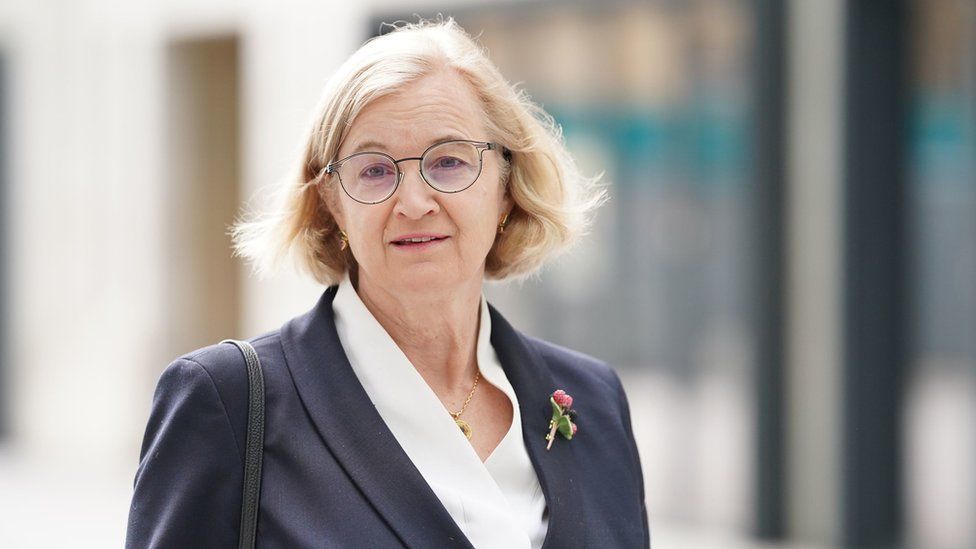
By Jemma Crew
BBC News
Ofsted’s chief inspector says she has no reason to doubt the findings of an inspection into a primary school, after its headteacher took her own life.
Ruth Perry died in January while waiting for a report that downgraded Caversham Primary in Reading.
The head of England’s education watchdog Amanda Spielman said she was willing to meet Ms Perry’s family.
She also acknowledged there was a “culture of fear” within schools around Ofsted inspections.
In her first interview since Ms Perry’s death, Ms Spielman told the BBC’s Sunday with Laura Kuenssberg programme she believed the findings were “secure” and the inspection team “worked with the professionalism and sensitivity that I would expect”.
Asked if she had any concerns about what happened during the inspection, she replied: “From what I’ve seen I don’t have any reason to doubt the inspection.”
Ms Perry’s family believe the anxiety and stress following the inspection led to her suicide.
Asked if she had spoken to the family, Ms Spielman said Ofsted had not received an approach and had not wanted to “intrude on their grief” but she would be “open” to a meeting.
And asked if she accepted a “culture of fear” around Ofsted inspections existed, she replied: “I certainly acknowledge that it exists.”
She said this was the result of several factors, including people thinking about the consequences of inspections – particularly “inadequate” judgements – which she pointed out make up a “tiny proportion”.
But she said for the vast majority of schools it is a “positive and affirming experience”.
https://emp.bbc.co.uk/emp/SMPj/2.49.2/iframe.htmlMedia caption,
Watch: I have no reason to doubt the school’s inspection – Spielman
Presenter Laura Kuenssberg suggested to the Ofsted chief that people “might wonder if you really understand the depth of feeling”.
Ms Spielman said she did, but she also looked “very hard” at feedback from inspectors on the ground.
Caversham Primary School was downgraded by Ofsted after inspectors decided that checks on staff and record-keeping of concerns about children were inadequate.
Under the current system, this means the leadership of the school is declared inadequate, as well as the school overall.
The quality of education and behaviour at the school were praised by inspectors.
Ms Spielman defended the “clarity and simplicity” of the current inspection system, adding: “It’s not for us to say we’re going to fundamentally change the grading system, that would have to be a bigger government decision.”
In a previous statement, she outlined some changes Ofsted is making, but said the single overall grade “currently plays an integral part in the wider school system”.
These include looking at how inspectors can return quicker to schools which have work to do on safeguarding but are otherwise performing well, in order to reflect improvements in their judgements.
Newly appointed Deputy Prime Minister Oliver Dowden said the way safeguarding issues affect a school’s overall rating should be looked at.
Asked if he believed it can sometimes be “over the top”, he replied: “I think it’s important that a proportionate approach is taken.”
Diane Abbott suspended as Labour MP after racism letter
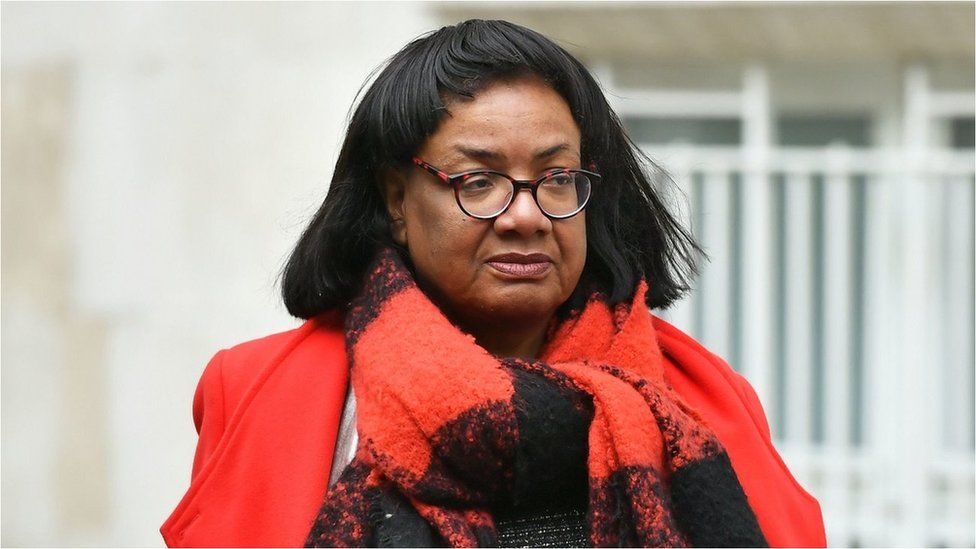
Diane Abbott has been suspended as a Labour MP pending an investigation into a letter she wrote about racism for the Observer, the party has said.
The politician said “many types of white people with points of difference” can experience prejudice, in a letter published on Sunday.
But they are not subject to racism “all their lives”, she said.
She later tweeted to say she was withdrawing her remarks and apologised “for any anguish caused”.
Labour said the comments were “deeply offensive and wrong”.
The BBC has approached Ms Abbott for comment since the whip was suspended.
In the letter, she wrote: “In pre-civil rights America, Irish people, Jewish people and Travellers were not required to sit at the back of the bus.
“In apartheid South Africa, these groups were allowed to vote.
“And at the height of slavery, there were no white-seeming people manacled on the slave ships.”
She had been responding to an article on the Guardian website questioning the view that racism “only affects people of colour”.
In her apology, Ms Abbott said “errors” arose in an initial draft that was sent.
She continued: “But there is no excuse, and I wish to apologise for any anguish caused.
“Racism takes many forms, and it is completely undeniable that Jewish people have suffered its monstrous effects, as have Irish people, Travellers and many others.”
The BBC has approached Ms Abbott for comment since the whip was removed.
Suspending the whip means the Hackney North and Stoke Newington MP will not be allowed to represent the party in the House of Commons, where she will now sit as an independent MP.
A Labour party spokesman said: “The Labour Party completely condemns these comments, which are deeply offensive and wrong.
“The chief whip has suspended the Labour whip from Diane Abbott pending an investigation.”
April 22nd 2023
Bent coppers: The most corrupt British police officers

The phenomenal success of BBC drama Line of Duty has had the nation trying to figure out the fictional bad apples of the police service. But what about the real-life coppers who crossed the thin blue line into the dark side? Here are the stories of three who did exactly that.
Mesut Karakas
It was back in 2010 when the man dubbed ‘London’s most corrupt policeman’ was sent down for 13 years. PC Mesut Karakas and a number of accomplices were convicted of plotting a crime that was as disturbing as it was audacious – to snatch a bank manager right in front of his family and force him to give them access to money.
On the surface, 25-year-old Karakas had been an entirely unremarkable beat copper. In the words of DS Chris Robson of the Directorate of Professional Standards – the body that investigates bent coppers – ‘There was nothing about him… pretty much your average police officer’.
Peter Bleksley: From undercover cop to hunting Liverpool’s most wanted man
Former Scotland Yard detective and undercover cop, Peter Bleksley has written several books and plays.
As it turned out, Karakas had been up to no good for a while before the kidnapping was conceived. A year before, he and members of the gang had beaten a man up with a baseball bat. Karakas had then printed out the police report on that incident and conspired to have £10,000 posted to the assault victim, asking him to drop the case.
At some point after that, they set their sights on the bank manager. Fortunately, Karakas was already on the radar of the DPS, who planted a listening device in the bent copper’s car. This revealed the sinister details of the plan. As DS Robson later said, ‘I was fully aware that there was a real chance of violence being involved. The victims would have their mouths taped over and hands tied and people with balaclavas would be coming through their door’.
The police were able to bust the conspiracy before such traumatising violence could be carried out. As the judge put it during the sentencing, ‘No-one listening to the probe material will forget the cold, callous way that you behaved’.
Stephen Cloney
When 41-year-old Merseyside copper Stephen Cloney was handed a five-year jail sentence in 2020, it concluded the downfall of an officer who’d once won plaudits for his part in handling the 21 July 2005 terrorist attacks on the London Underground. But at some point after those glory days, things had gone wrong for the once ‘exceptional’ Cloney. His barrister would cite his poor mental health, recent divorce, and the thousands he’d racked up in debt.
Cloney started selling information to criminals, including leaking the addresses of properties which was thought to contain cannabis farms and stashes of drugs, so that Cloney’s contacts could steal it for themselves. One such raid ended up with a man getting stabbed. In another, one of the armed robbers told the occupant ‘Your house is getting raided in two days anyway as we’ve got people on the inside, we’ve got a copper who tips us off’.

Say their name: police brutality in the UK
Police brutality in the US is a real issue. But Britain is not so innoce
Read More https://www.crimeandinvestigation.co.uk/article/say-their-name-police-brutality-in-the-uk
Stephen Lawrence’s mother says her son’s story “remains as important and relevant as ever” on the 30th anniversary of his murder.
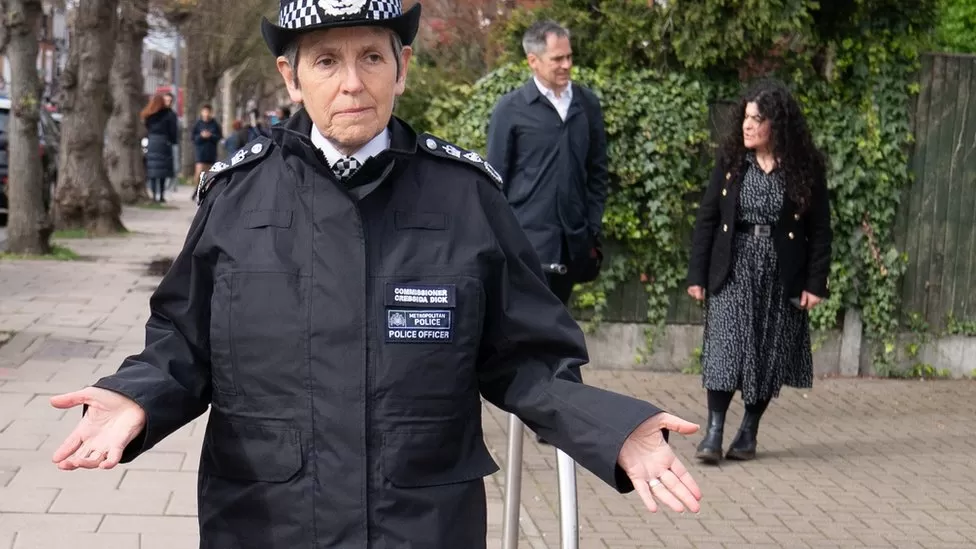
The 18-year-old was stabbed in a racist attack by a gang of white youths as he waited for a bus in Eltham, south-east London, on 22 April 1993.
A report into the failed investigation found “institutional racism” in the Met Police.
A private memorial service earlier took place to mark the anniversary.
Labour leader Sir Keir Starmer joined Stephen’s mother, Baroness Lawrence, at the ceremony at St Martin-in-the-Fields Church in Trafalgar Square. The Mayor of London Sadiq Khan also attended.
Sir Keir made a short speech and read a poem by Maya Angelou at the request of Baroness Lawrence.
He told the memorial that, “contrasted against the very worst side of Britain, Stephen represented the best”, as he said the teenager had represented “a life which shone with the light of potential”.
Sir Keir was director of public prosecutions when two of Mr Lawrence’s killers were brought to justice.
Stephen’s younger brother, Stewart Lawrence, also gave a speech at the memorial.
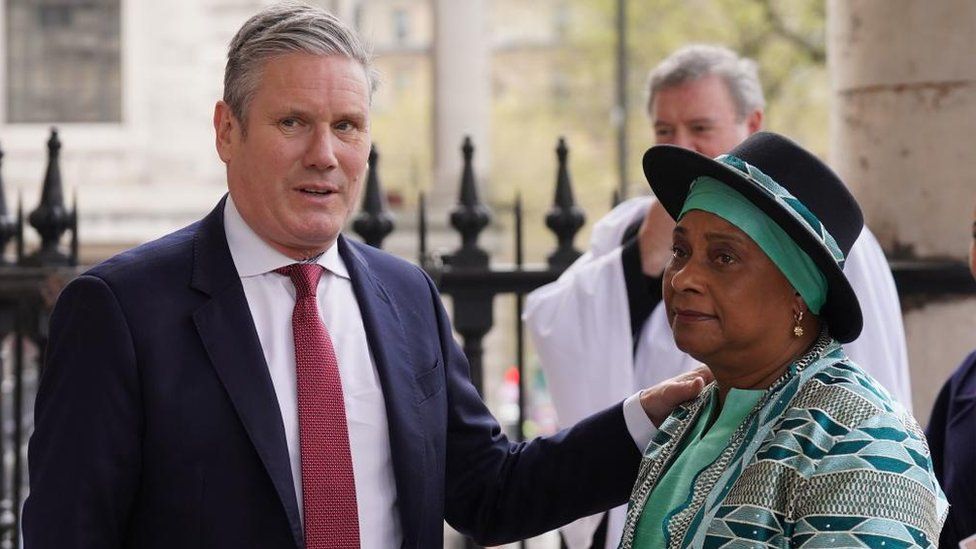
The Stephen Lawrence Day Foundation was set up by Baroness Lawrence in 2020.
As part of the anniversary, the Stephen Lawrence Day Foundation has announced a series of scholarships, research initiatives and pilot careers schemes, aimed at helping marginalised young people.
“I am filled with immense pride to witness all that has been achieved in his name and yet must also acknowledge the work still to be done,” Baroness Lawrence added.
“As we pass the baton from one generation to the next, let us remain steadfast in our hope for a brighter future.”
April 21st 2023
Dominic Raab hits out at ‘activist civil servants’ after resignation
By Becky Morton & Chris Mason
BBC Politics
Former Deputy Prime Minister Dominic Raab has accused “activist civil servants” of trying to block the work of government, after his dramatic resignation over bullying claims.
An inquiry found he was “intimidating” and “aggressive” towards officials.
Mr Raab told the BBC he was sorry if he upset anyone but “that’s not bullying”.
He said there was a risk “a very small minority” of officials “with a passive aggressive culture” were trying to block reforms they did not like.
In his first interview since stepping down, Mr Raab told the BBC the only complaints upheld against him were by “a handful of very senior officials”, out of hundreds of civil servants he had dealt with.
Asked if the blunt truth was that he was a nightmare to work for, the former justice secretary said: “Well actually, almost all of the complaints against me were dismissed.”
- Live updates: Dominic Raab hits out at ‘activist’ civil servants in BBC interview
- Dominic Raab bullying report’s key findings
- Anger from civil servants at Raab resignation letter
He said a “very small minority of very activist civil servants” were effectively trying to block reforms they did not like, related to areas including Brexit, prisoner parole and human rights.
“That’s not on. That’s not democratic,” the MP for Esher and Walton added.
“If you’ve got particularly activist civil servants, who either because they’re over-unionised or just don’t agree with what we’re trying to pursue… If actually, they block reforms or changes through a rather passive aggressive approach, we can’t deliver for the British people,” he said.
Asked if there were people standing in the way of an elected government, Mr Raab said: “I was told that by one cabinet secretary, and by one director of propriety and ethics in the Cabinet Office.”
However, the FDA union, which represents civil servants, accused Mr Raab of peddling “dangerous conspiracy theories that undermine the impartiality and integrity of the civil service” to “deflect from an independent investigation’s criticism of his conduct”.
The head of the union, Dave Penman, said the prime minister had a duty to defend the impartiality of the civil service and “stop giving his former ally a free hand”.
One former senior civil servant who worked closely with Mr Raab told BBC Newsnight he “has often publicly praised the work of his civil servants” and his latest comments seemed to be “at odds” with this.
Another said: “In my experience, most civil servants do their jobs because they want to deliver for the public.
“They do this through a long-standing and normally very effective relationship with the democratically elected ministers.
“I think you’d struggle to find a similar example of the disfunction we’ve heard about in Tolley’s report so it’s perhaps fair to draw the conclusion that there is one common thread to this unique situation and that’s Raab.”
The inquiry by senior lawyer Adam Tolley KC looked at eight formal complaints about Mr Raab’s behaviour during his previous stints as justice secretary, foreign secretary and Brexit secretary.
His report concluded Mr Raab’s conduct involved “an abuse or misuse of power”, and that he “acted in a manner which was intimidating” and “persistently aggressive” towards officials.
Mr Raab, a close ally of the prime minister, had pledged to resign if the investigation made any finding of bullying against him.
In his resignation letter, he said he accepted the inquiry’s findings but described them as “flawed”.
‘Dangerous precedent’
Asked in his BBC interview if he wanted to apologise, Mr Raab said: “If someone had hurt feelings, because of something I did, of course, I want an empowered team.
“The vast majority of the civil servants who worked for me were brilliant, fantastic and actually relished the energy, the challenge, the drive that I believe I brought.
“But of course, I don’t want to upset anyone and I made clear that I’m sorry for that. But that’s not bullying, and we can’t deliver for the British people if the bar is that low.”
He added: “If it’s not intentional, if it’s not personalised, if actually it is right, but there are some subjective hurt feelings by some, I’m afraid that makes it very difficult to deliver.”
Mr Raab said the findings of the inquiry set “a very dangerous precedent”.
“If the bar, the threshold for bullying is lowered that low, it’s almost impossible for ministers to deliver for the British people and I think it’ll have a chilling effect on effective government, and the British people will pay a price,” he said.
He added that a lot of ministers were now “very fearful that the direct challenge that they bring fairly, squarely in government, may leave them at risk of the same treatment that I’ve had”.
Asked if he would fight the next general election as a Conservative candidate in Esher and Walton, where he has slim majority of less than 3,000 votes, Mr Raab said he wanted to “let the dust settle” but ultimately it was a decision for his local constituency association.
Related Topics
Taking Us For Mugs-Migration Watch.

| Cut immigration, now!According to YouGov‘s latest polling 59% of the public think that immigration has been too high, and only 10% think it has been too low. While a whopping 86% of Conservative voters — many of whom voted the way they did in 2019 believing they were electing a government intent on reducing immigration – thought immigration to be too high. Just 7% of this group think immigration has been just right. What none of them ever imagined was that we would now be witnessing the highest ever net migration figures (over half a million a year!)Meanwhile, the Illegal Immigration Bill stumbles through the Commons with the occasional fuss made over a concession here and an amendment there. The latest kerfuffle has been over powers to be granted to the Home Secretary to ignore the European Court of Human Rights. In fact, the Home Secretary can already do this. In the end, it will depend on the content of the Bill at the point it becomes an Act. The House of Lords will do its utmost to neutralise the Bill, as it did with the Nationality and Borders Bill this time last year. Ultimately, the government has the votes in the Commons to reverse damaging amendments passed by the Lords. Will it be enough? Will the boats stop coming? Time (of which very little remains before the next general election) will tell. But we very much doubt it.There have already been over 5000 illegal entrants so far this year (see our Tracking Station). Thousands more will come for so long as everyone arriving is made comfortable, provided with a bed and roof over their head (as often as not at a decent hotel) and given £45 per week pocket money pending a decision on their asylum application. Not that it matters how that goes, for few, if any, are ever removed.We at Migration Watch UK, like most British people, are only too willing to help those in genuine need, in so far as our resources and space will allow. However, what we don’t go along with is the throwing open of our borders for the benefit of big business and those coming from poor countries; and all at the expense of the taxpayer, the poor and often the most vulnerable here. As the brilliant Alex Phillips said on GB News recently, too many people in too short a time is a disaster for social cohesion.Uncontrolled, unmanageable levels of immigration erode our social fabric and put ordinary people in danger. This is obvious. Not racist or xenophobic, it’s common sense.BLOG OF THE WEEKPopulation Projected To Rise By Seven Million By 2060.Given our population increased by 8 million in 20 years, with 85% (nearly 7 million) due to migrants and the children of migrants, we find this projection totally unconvincing with little supporting evidence. The assumption that net migration will fall to 246,000 per annum from 2026 strikes us as implausible. See our full blog here.MIGRATION WATCH UK IN THE NEWSNew Culture Forum: Grooming Gangs: We must protect our children‘The protection of [our] children, that’s what we’re talking about, protecting the most vulnerable members of our society, those who are susceptible to these sorts of attacks from heinous individuals.’See below for some reactions to week’s news:The Times: Small boats crisis: Just 13% of migrant asylum claims dealt with in five years‘This is shocking but perhaps not surprising news. Is it any wonder that tens of thousands of people are milling around in expensive accommodation, including hotels? The only way to stop this is to send out the clear message that illegal entry will not lead to any kind of leave to stay here.’Telegraph: Suella Braverman set to be given powers to ignore European judges‘This makes for a good headline, but will it make any difference? Will it stop the boats? We just don’t believe it will.’Mail Online: More than £1.3 million of taxpayers’ money is spent defending 121 legal challenges to the government’s Rwanda asylum plan‘So not only are charities and NGOs using the law to thwart a policy that many people in Britain support, they are doing it with our hard-earned money. They really do take us for mugs.’MAKE YOUR VOICE HEARDThe polling cited above shows what a gaping chasm there is between the cosseted elites and what ordinary people think.Write to your MP today to help us get the immigration policy that serves the interests of the British people.We wouldn’t be able to continue this work without the help of our supporters. If you would like to donate, please click the button below. Our supporters are all as concerned about the future of our country as we are. Some have been kind enough to remember us in their will. If you wish to consider leaving a bequest to Migration Watch UK, or wish to discuss anything else, do please get in touch. Our email is: admin@migrationwatchuk.orgMAKE A DONATION TO MIGRATION WATCH UKCopyright You are receiving this email after providing your contact details to Migration Watch UK Our mailing address is: MWUK, 55 Tufton Street, Westminster, SW1P 3QL Comment The Dominic Raab resignation demonstrates that Civil Servants rule. These nice highly paid Home Counties dwellers aren’t impacted by mass immigration.Their self interested self righteous moralisng egos feed of of it. R J Cook |
April 20th 2023
Losing Energy

Image copyright R J Cook Appledene Photographics2023.
April 19th 2023
Ukraine war: The Russian ships accused of North Sea sabotage
- Published
9 hours ago
comments
Related Topics
https://emp.bbc.co.uk/emp/SMPj/2.49.2/iframe.htmlMedia caption,
Watch: Danish reporters film armed men on guard as they approach the Admiral Vladimirsky
By Gordon Corera
Security correspondent, BBC News
Russia has a programme to sabotage wind farms and communication cables in the North Sea, according to new allegations.
The details come from a joint investigation by public broadcasters in Denmark, Norway, Sweden and Finland.
It says Russia has a fleet of vessels disguised as fishing trawlers and research vessels in the North Sea.
They carry underwater surveillance equipment and are mapping key sites for possible sabotage.
The BBC understands that UK officials are aware of Russian vessels moving around UK waters as part of the programme.
The first of a series of reports is due to be broadcast on Wednesday by DR in Denmark, NRK in Norway, SVT in Sweden and Yle in Finland.

A Danish counter-intelligence officer says the sabotage plans are being prepared in case of a full conflict with the West while the head of Norwegian intelligence told the broadcasters the programme was considered highly important for Russia and controlled directly from Moscow.
The broadcasters say they have analysed intercepted Russian communications which indicate so-called ghost ships sailing in Nordic waters which have turned off the transmitters so as not to reveal their locations.
The report focuses on a Russian vessel called the Admiral Vladimirsky. Officially, this is an Expeditionary Oceanographic Ship, or underwater research vessel. But the report alleges that it is in fact a Russian spy ship.
The documentary uses an anonymous former UK Royal Navy expert to track the movements of the vessel in the vicinity of seven wind farms off the coast of the UK and the Netherlands on one mission.

It says the vessel slows down when it approaches areas where there are wind farms and loiters in the area. It says it sailed for a month with its transmitter turned off.
When a reporter approached the ship on a small boat, he was confronted by a masked individual carrying what appeared to be a military assault rifle.
The same ship was reportedly sighted off the Scottish coast last year. It was spotted entering the Moray Firth on 10 November and seen about 30 nautical miles east of Lossiemouth, home to the RAF’s Maritime Patrol Aircraft fleet before heading slowly west.
The BBC understands that UK officials are aware of Russian intent to conduct what is known as undersea mapping, including using boats that move around in UK waters.
If there are specific threats against the UK these would be investigated, but sources declined to say what activity might have been looked at so far.
Comment Any intelligent person outside of the self interested elite should realise that along with the Anglo U.S elite and NATO, that elite has taken this country to war. That war , causing the so called ‘cost of living crisis, is global elite land , resource and power grabbing with a not so long term plan for Russian and China’s regime change. Moralising outrage will not alter the reality that Russia faces an existential threat. Putin is not the only person who knows that. Ukraine, like Britain and its police, is institutionally corrupt. Russia will have to up the stakes. If the smug Anglo Americasn elite want the two spying western journalists released, they should release Assange with compensation, pardon and compensate Chelsea Manning and release young Jake who simply revealed official liars about western troops on the ground in Ukraine. Too many people in this country and the U.S swallow the big lie that Britain , U.S and Ukraine are democracies. Corruption issues are currently being investigated at the highest levels of Britain and Scotland’s political system, including millionaire Prime Minister Sunak and bosses of the SNP.
R J Cook
April 17th 2023
| Why have known terrorists been admitted and allowed to roam freely? They should be under lock and key |
| It emerged this week via the Daily Mail that 19 suspected terrorists were admitted to Britain having entered illegally and claimed asylum. Have we gone completely barmy? Indeed, since 2018, 90,000 people crossed the Channel illegally and have been admitted. Most of them are still here. The vast majority destroy their documents in order to conceal their identity and avoid removal and ease their path to being granted asylum. See our research here and our previous work here. This is madness. Time and again, cases come to light of dangerous people with ill-intent being allowed to stay, even when asylum is denied. And having been permitted to stay they go on to commit crimes or acts of terrorism. As our latest blog (see below) shows, there are several examples whereby individuals with a terrorist background have entered the UK via irregular routes. Our asylum system is there for those who flee persecution. It is not for everyone who shouts the word ‘asylum’, whatever their true intentions. They must not be allowed to take advantage of a system meant for genuine asylum seekers. It is a disgrace that even when politicians want to do the right thing they are branded as racist by those who seem to care little for the rights and security of our citizens. The open borders zealots must not be allowed to get away with their misguided, and often dangerous, tactics. |
| From Baghdad to Bournemouth – Granting refuge to terrorists The group of 19 terrorists or potential terrorists already mentioned are not alone. Read the whole account of this sorry state of affairs in our blog of the week, here. |
| MIGRATION WATCH UK IN THE NEWS |
| Mail Online: Suspected terrorist migrants could be free in Britain after evading biometric security checks during chaos at Manston processing centre last year, ex Border Force chief warns Alp Mehmet, chairman of Migration Watch UK which campaigns for tougher border controls, said it was ‘shameful’ that terrorists had been able to reach Britain with such ease. ‘It shows the state of our border is lamentable – it is full of holes and we seem helpless to do anything about it,’ Mr Mehmet said. ‘That is a shameful state of affairs for any country to be in.’ GB News: Known terror suspects are illegally crossing the Channel in small boats ‘They’re known terrorists, so why aren’t they locked up? We can’t deport them because of our commitments to various international agreements and treaties.’ |
| MAKE YOUR VOICE HEARD |

UK woman arrested a second time for ‘offense’ of silently praying outside abortion clinic: ‘This isn’t 1984’
A pro-life activist arrested for the second time only weeks after the court cleared her of criminal charges for silently praying near an abortion facility
Priest charged after praying outside of abortion clinic says free speech is ‘threatened’
Father Sean Gough and attorney Lorcan Price call out laws restricting protesters from praying outside of clinics on ‘Tucker Carlson Tonight.’
A pro-life activist was arrested for the second time Tuesday for the “offense” of silently praying in her head near an abortion facility in a so-called censorship or “buffer zone” in Birmingham, England.
Isabel Vaughan-Spruce’s arrest comes only weeks after the court cleared her of criminal charges for breaking a Public Spaces Protection Order (PSPO) which enforces a censorship zone around the abortion facility, according to an Alliance Defending Freedom UK press release.
Bail conditions for Vaughan-Spruce’ prohibit her from entering the vicinity of the abortion facility which extends beyond the “buffer zone.”
Birmingham’s authorities established a buffer zone around abortion clinics, which makes it illegal for an individual to engage in any act or attempted act of approval or disapproval as it relates to abortion and includes “verbal or written means” like “prayer or counseling.”
“I’m not protesting, I’m not engaging in any of the activities prohibited,” Vaughn-Spruce told officers during her second encounter when they asked her to step outside the exclusion zone.
“But you said you are engaging in prayer, which is the offense,” the officer responded.
“Silent prayer,” she responded.
“No, but you were still engaging in prayer,” he said. “It is an offense,”
Vaugn-Spruce said she disagreed with the officer, and he asked her if she would rather be arrested and taken away instead of standing outside the exclusion zone, explaining those were her only two options.
“Only three weeks ago, it was made clear by the court that my silent prayers were not a crime,” Vaughn-Spruce said in a statement. “And yet, again, I have been arrested and treated as a criminal for having the exact same thoughts in my head, in the same location.”
“The ambiguity of laws that limit free expression and thought – even in peaceful, consensual conversation or in silent, internal prayer – leads to abject confusion, to the detriment of important fundamental rights,” she added. “Nobody should be criminalised for their thoughts.”
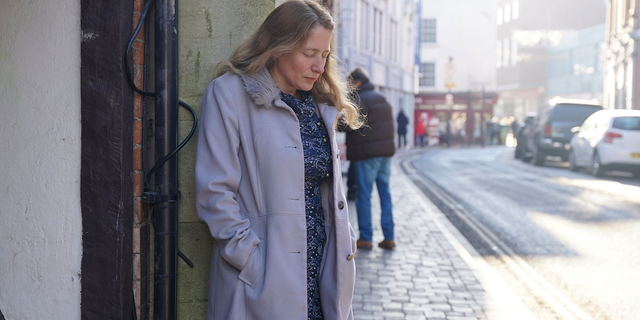
Isabel Vaughn-Spruce (Courtesy of ADF UK)
The House of Commons in the UK Parliamentvoted 116-299 Tuesday to criminalize all forms of “influence” near abortion facilities across England and Wales, which includes silent prayer, according to an ADF UK press release. Amendments put forth by parliament member Andrew Lewer that would exempt silent prayer and consensual conversations from the ban failed to gain support.
“Police shouldn’t be asking ‘What are you thinking about?!’”, Lewer said, according to ADF UK. “Censorship of this sort is a notoriously slippery slope. It might not be your thoughts that are criminalised today, but I think we should all be careful not to open the door to that tomorrow about some other opinions that people may hold about something else.”
PRIEST CHARGED AFTER PRAYING OUTSIDE ABORTION CLINIC DECRIES CRIMINALIZATION OF THOUGHT

Isabel Vaughn-Spruce pictured with Jeremiah Igunnubole, legal counsel for Alliance Defending Freedom UK. (Courtesy of ADF UK)
Today it’s abortion, but tomorrow it could be another contested matter of political debate, Jeremiah Igunnubole, Legal Counsel for ADF UK, said in a statement. “The principle remains that the government should never be able to punish anyone for prayer, let alone silent prayer.”
“Today’s vote marks a watershed moment for fundamental rights and freedoms in our country,” he said. “Parliament had an opportunity to reject the criminalisation of free thought, which is an absolute right, and embrace individual liberty for all. Instead, Parliament chose to endorse censorship and criminalise peaceful activities such as silent prayer and consensual conversation.”
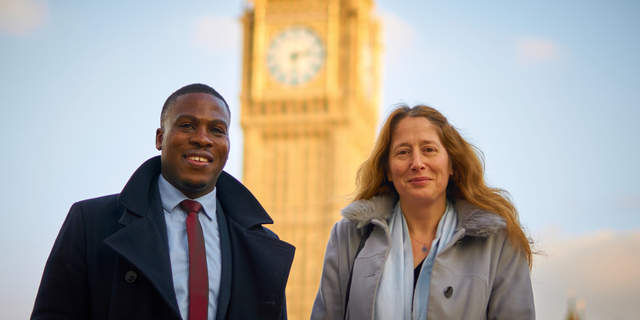
Isabel Vaughn-Spruce (Courtesy of ADF UK)
“There seems to be crime happening that is left unaddressed,” A local resident named Edel, who lives close to the abortion facility near where Vaughn-Spruce was arrested said, according to ADF. “And yet it is the people who are praying who are being targeted. I really question what the police are doing and why they’re spending their time and resources into targeting innocent people.”
CLICK HERE TO GET THE FOX NEWS APP
Kendall Tietz is a Production Assistant with Fox News Digital.
April 14th 2023
Updated April 15th 2023
Prime Minister Sunak Penis Talk by R J Cook
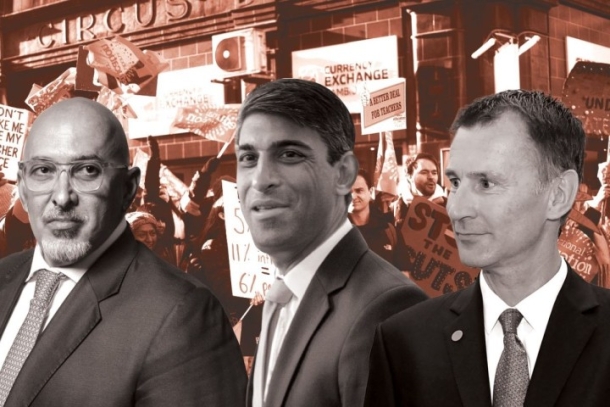
Above image, The Three Wise Men or The Three Stooges ?
by R J Cook
Today’s press reports confirm that U.K Prime Minister Rishi Sunak has weighed in on and joined the Transphobic hate campaign, along with stars like colleague Liz Truss and acclaimed fantasy story writer mega rich .J K Rowling.
Speaking today to Paul Goodman from Conservative Home, Rishi Sunak confirmed his stance on what makes a woman. When asked to clarify that 100% of women don’t have penises, Rishi responded “yeah, of course”. He then confirmed the government was in the process of looking at how the Equalities Act treats biological sex.
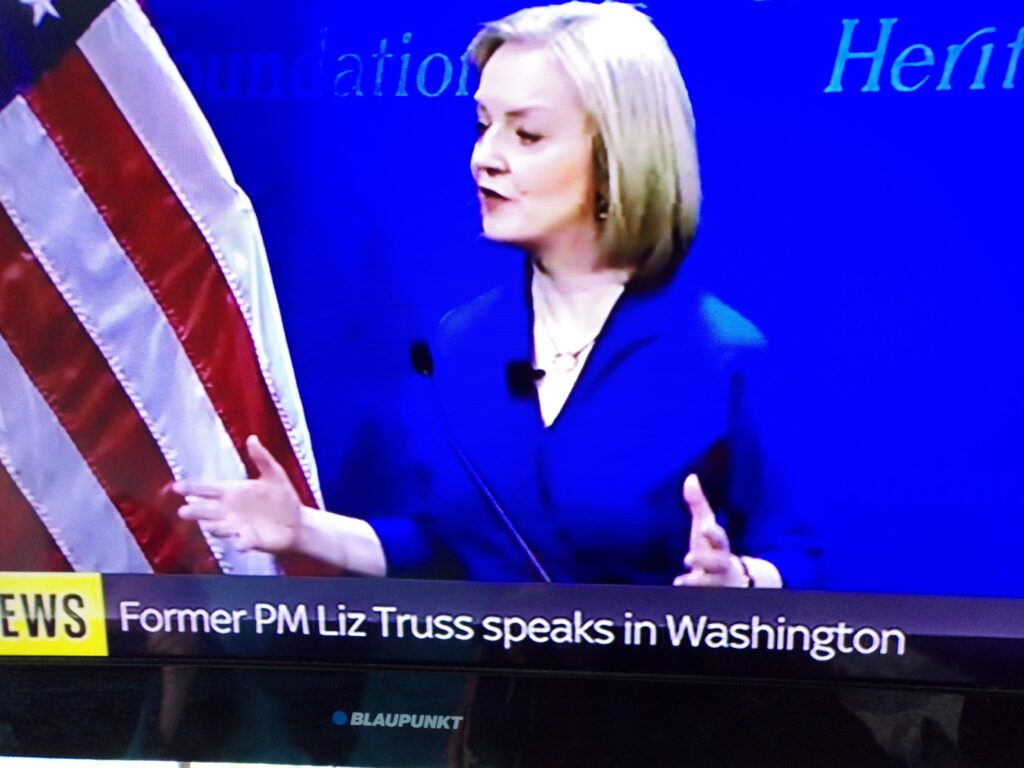
Here is the essence of the problem, biological women demand special treatment. No transwoman can possibly claim to be female in the modern British Police State. There will be no end to new laws and amendments to ensure biological women have all the protections and rights that they want.
A clear implication of what multi millionaire banker and business man turned Prime Minister Sunak , is that he and key members of his conservative party do not want transwomen to qualify for the same rights, protections and privileges as biological women. It is also implicit that the elite leader Sunak et al categorises people by gender, with no reference to extant age, attractiveness, health, class differences with their related privileges or privations. The male category, pre or even post operative are categorised as privileged males who need controlling and subduing because all females, are honest, special and vulnerable. They never lie. When they make allegations against men ,there is no need for evidence. The opposite is held true about men. This scenario is one of the reasons men escape into transsexualism and why so many biological men prefer ‘feminine’ transsexuals to domineering biological women. Feminists know this and don’t like it.
So we come to Sunak’s rather primitive reference to the male penis. When I was studying psychology in the 1970s I encountered Freud with his electra concept and female penis envy. As someone hating my penis from the moment I saw it hanging there as well as the openly boisterous and aggressive behaviour of boys in the infant reception class, I couldn’t understand why girls would want a penis. I didn’t.
My father died after his short life of childhood poverty during the Great Depression. Then came the army , Dunkirk , the Blitz on London and on Liverpool where he had been posted and post war dreams of becoming an electrician. This was because the electricians union required him to sign up for the Communist Party,otherwise he wouldn’t get a job. He settled for truck driving until a stack of bricks crushed the life out of him. He died two years after a failed operation and years of poverty. So it means nothing to me other than it is a nasty con trick telling us that the suntanned Caucasian Sunak is a remarkable sign of British progress, selling us rubbish about him being the U.K’s first black and very special Prime Minister.
This country like so many others is institutionally corrupt , run by the rich cheats and liars for the rich. As the Anglo U.S proxy war on Russia escalates , it will be lower class men expected to provide cannon fodder as we saw when females were escorted out of Ukraine while white men were locked up to fight another rich man’s war. There is a double standard here which we are not supposed to notice.
The problem with posh Winchester College public school boy and Lincoln College Oxford graduate Sunak is amplified by his Indian roots. Hindu supremacists have pounced on the possibility that Rishi Sunak, a self-proclaimed devout Hindu, is a desi bro, even an undercover agent of the “Global Indian Takeover” – the title of a once regular feature in the Times of India. Evidently, he observes upper-caste taboos against beef and alcohol and always keeps his statuette of Ganesha, the guarantor of worldly success, close to him. This archaic outdated third world totalitarian fascist mindset and ideology is implicit and motivational affecting Sunak’s TORY leadership in this highly sensitive and dangerous situation. It panders to TERF feminists who have serious pathological and maybe psychotic attitudes to us transwomen. This is especially so with those of us who hark back to a lost age of elegance , femininity and support for hard pressed men like my late father who died when he was 41. My first female role model was my late mother.

Multi cultural Britain is a place of contradictions , hypocrisy, political manipulation and expediency underpinned by wealth directed mainstream media. Clearly Sunak’s cultural and wealthy background focuses his mind on vested interests. My own life as a transsexual overdue for surgery was blocked by my Hindu GP from 3W Norden House Surgery in Winslow Buckinghamshire passing self interested malicious allegations that I had been arrested, house ransacked ,for working as a ‘gay escort’ for my ‘son and his associates’ in a home based brothel.
My home had been staked out for 4 months leading to a 7 officer police raid,computers, mobile phones, debit and HGV Digital Tacho Card were seized ,preventing me from working. I was actually working as a long shift HGV driver and on my fortnightly Monday rest day at the time of the alleged prostitution and period of police stake out. The police alleged that I sent them images, videos , and letters outing myself to cause harm to my son. Police urged this doctor to inform the gender identity clinic immediately. My Hindu doctor kindly obliged. To cut a long story short, this material presented me as high risk for surgery and as a depraved sex maniac. Having lived ‘as a woman for over 2 years with legal name change, completion of treatment was made conditional on powerful anti psychotic drugs. Police have impressed their view that I am not allowed to explain why they did this.

My Indian GP wrote to the Gender Identity Clinic telling them he had seen press reports where I had told them I wished to withdraw from gender reassignment treatment . I have never spoken to the press regarding being transsexual. I have no idea what he is talking about. He has refused to explain why he also informed the Gender Identity Clinic that I had a long history of alcohol abuse and neuropathy. A psychiatrist made a surprise visit, after I had just returned from my HGV shift on March 19th 2019, at 12.30. Three days later he uploaded a report on to my National Health Records. This stated that among other things, based on his one hour ‘consultation’, that I am a paranoid schizophrenic ,bi polar, delusional , abnormal personality more likely to die by misadventure than suicide. Police were duly informed along with employer because such lunatics cannot drive anything. Consequently I was fired.

The propaganda that Britain is a democracy is nauseating. Knocking Russia for opposing publicity for transgender treatment seems reasonable given how much the west wants to subvert that society. The explosion of little boys wanting to be little girls should raise the question why ? Obvious answers are feminism making boys feel like crap, one parent female run families, special rights and excuses for female, including positive discrimination especially in state organisations like the police. This is why Cressida Dick had to have the top Metropolitan job. Her incompetence was not mentioned in the recent corruption inquiry. The current head has been allowed to whinge on the likes of himself wanting more powers to sack officers – in reality about sacking the ones who don’t fit. He never mentioned why a mere constable was assigned to investigate habitual ‘flasher’ PC Wayne Couzens – work nickname ‘The Rapist’. Thus Couzens had opportunity to develop his psychotic misogyny, using police ID to abduct, rape and kill 30 year old Sarah Everard. Nor did the Met’s new police chief mention the key issue of ongoing active totally independent monitoring , accounatbility and punishment. U.K’s police chiefs are promoted from the ranks and major, if not always, source of endemic corruption.
There is a world of difference between someone like me always wanting to identify with what was conspicuously female and feminine and desperate little boys running for pre-teen hormone blockers. It is also utter nonsense to argue that men putting on a female jacket and blonde wig after conviction for multiple rape should qualify for a female jail. This Scottish case was exploited by the TERF feminists with vote grabbing friends like Sunak to denigrate genuine transsexuals. These morons will not accept there is difference between transsexuals and transvestites. They don’t get it that the former is a body issue, but current Gender Identity Clinic rules oblige clients to ‘dress as a woman.’ That takes me back to Sunak. For him , a woman is simply. a human without a penis. This mentality is why young trans girl 16 year old Brianna Ghey was brutally murdered by two 15 year old morons. Sunak should be investigated for grotesque hate crime. We transsexual females are far more vulnerable than biological females. Feminist thinking want us driven from existence by feminists, religious bigots and political opportunists..
Sunak is intent on a legal change to make gender / sex defined as only ever biological. The corrolary of this is that transsexuals must be confined to being the lowest category of what is generally seen as the LGBTQI freak show. This is the police state where Feminazis have rather too large a say on the political agenda. On a baser level , Sunak is desperately out for votes from the bigots. This tribalistic third world mentality is absurd when it talks of science and nature to justify its selfsh ignorance. This biogtry will cause more transsexual suicide ,mental illness and evil murders of innocents like 16 year old Brianna Ghey.
R J Cook
Brianna Ghey funeral: hundreds pay tribute to murdered teenager
Friends and family joined by dignitaries and and public to honour ‘fun, intelligent angel’
Josh Halliday North of England correspondentWed 15 Mar 2023 19.22 GMTLast modified on Wed 15 Mar 2023 22.25 GMT
Hundreds of mourners have gathered to pay tribute to the murdered teenager Brianna Ghey, who was described in a moving funeral service as a “true one-off, unique and truly unforgettable”.
The 16-year-old was found with fatal stab wounds in a park in the village of Culcheth, near Warrington, on 11 February. A boy and a girl, both 15, have been charged with her murder and are due to go on trial in July.
On Wednesday, Brianna’s friends and family were joined by local dignitaries and members of the public to pay tribute to the teenager.

The coffin of Brianna Ghey is carried into St Elphin’s church. Photograph: Christopher Furlong/Getty Images
Wearing pink at the request of the teenager’s family, they filled the aisles of St Elphin’s church, in Warrington, with some mourners having to listen to the service outside in the rain.
One of Brianna’s friends, Kiera, remembered her as a “beautiful, amazing, fun, intelligent angel” whose “soul was always too good for this earth”.
Transphobia to be Legalised under Tory Law by R J Cook

Comment Poor tragic Brianna was victim to Britain’s contradictory hypocritical diversity political correctness. Gays are welcome in this world because they keep their emblematic penis and testes while giving clear signals of only ever wanting to gossip with the girls. Lesbians are biological women, heroically rejecting subservience to horrible ‘privileged white men.’ They are role models for modern women. Transsexuals are ‘other’ , alarming feminists and men with penis insecurity. Meanwhile there are too many intelligent and mature men who see transsexuals for the feminine women that they are.
I am reminded of my days teaching at Spencer Park Boy’s Comprehensive School in South London in 1978. The school was streamed A,B,C. Across the years all bar two of the C streams were West Indians. The other were white. I taught 4C1, 4C2, 5C1 & 5C2. It was an interesting experience in racial and gender behaviour. But in this context I will confine my memoir to two tiny delicate featured boys in 4C1, Chris and Derek. Chris was white, Derek was black. The other white boy in the class was big loud and loutish like the other blacks.
The two tiny boys wore librarian’s badges on their blazer lapels. They sat together in class at the table directly in front of me. As soon as break bell rang, the two little boys made haste for refuge in the library.
One day, during morning break ,Head of Department Frank Neuoffer came into my classroom, where I was preparing a lesson. He was not much older than me, but higher status. He said :” I’ve come to tell you that Derek L—-n won’t be in your class after break. He is seeing the educational psychologist.” I stepped out of line to say sarcastically ; “Has it not occured to you to send Derek to me and the rest of the class to the psychologist ?”
He wasn’t amused. The psychologist’s solution was to split the two effeminate boys up so Derek was transferred to 4C2. So the following week and a double period, I waited at my desk for 4C2 to arrive. The classroom door was at the opposite end to me, to my right. Break bell rang to resume classes. There was a flurry of footsteps and raucous laughter.
Four big black boys rushed in then got behind the open door. I watched in amazement sensing trouble. Moments later nervous little black Derek’s face peeped around the open door. His fellow blacks lurched out at him. The leader fighting evil laughter said in a deep stereotypical West Indian accent “Hello little gay boy.”
Meanwhile , his little white friend was playing truant up at an adult gay man’s haunt called ‘Playland.” It was the beginning of a horrible story which so called educational and health experts had initiated. So, having looked at pictures of Brianna, I saw fear, vulnerability, moments of joy and hope. There are too many individuals and groups, like feminists, in fake Christian Britain, whose pleasure is inflicting and sustaining vulnerable peoples misery. Brianna had found her womanhood. It is moronic self centtred ego maniacs like Sunak, Rowling and Truss who offer leadership and inspiration to the rabble who enjoy tormenting and killing of innocent transsexuals.
R J Cook
April 12th 2023
Whose Freedom ?
I have just listened to Liz Truss the 40 day Prime Minister deliver the Margaret Thatcher’s annual memorial lecture. She was very assertive, condemning Vladimir Putin as the source of all evil. Allied to this is her paranoia that the Anglo-US economic model is being subverted by environmental activists with an extreme socialist agenda.
Transsexuals are next on her hate list. Gurning , she screeched on about woke people out to subvert biology with males pretending to be women. She believes this is against nature. She ridiculed the science. The logic of her out look is that lesbians , homosexuals are going against nature too. Why are they not on her list ?
The answer is in her feminism which is full of assertions and contradictions requiring no explanation. Feminists are threatened by transsexuals,many of whom aspire to traditional standards of elegance , glamour and femininity – and being nice to men by implication.
Truss is nailing her colours to the mast of the pseudo intellectual bigots like J K Rowling and vicious killers like the two 15 year olds charged with murdering the transgender girl Brianna Ghey. Brianna,
Incredibly Truss talks about British freedoms. Freedom for who ? The ruling elite ? Freedom for feminists and ever more empowerment ? Freedom to live on the street, get murdered there or commit suicide maybe.
R J Cook
The absurdity of Liz Truss blaming high taxes on woke culture
By making wokery the bogeyman for an economic disaster she’s implicated in, Truss has given the game away.
By Jonn Elledge

Today, 12 April, Liz Truss – the Liz Truss who crashed the economy; the Liz Truss who broke the cardinal rule of modern Tory politics and let old people feel poorer – is giving a speech. In front of the Heritage Foundation think tank in Washington DC – an audience that is far enough from Westminster that it may not have noticed what she did – Truss will argue that “stagnation, redistributionism and woke culture” have been “taking hold in businesses and the economy in the UK and the US”. This, she will say, has meant “more tax, more subsidies, more regulation”, as she delivers the annual Margaret Thatcher memorial lecture.
April 11th 2023
Striking Truth About Doctors & The NHS

| The scandal of not training enough medics only to steal them from needier countries |
| This week we published new research showing that nearly half of all the doctors joining the NHS in 2022 came from overseas. Also revealed was the number of applicants rejected from medical courses in Britain. This is from the paper: “In 2022, there were 19,235 UK applicants to study general medicine, a 25 per cent increase on 2020. Of these, 9,050 were accepted onto courses while 10,185 were turned away.” Our medical services have become increasingly dependent on overseas trained medical staff, often importing them from countries with a far greater need for doctors, nurses, midwives and just about every other medic. This is shameful, not least because it is happening when perfectly able, aspiring health professionals here in Britain are being rejected. This new research shows how addicted to overseas-trained, invariably cheaper, medical staff we have become. Here are the main takeaways from the paper: • 45 per cent of doctors joining the NHS in England in 2022 came from overseas • In England, the number of overseas doctors to join the NHS was 50 per cent more than the number of students projected to enrol in a medical training course in 2022 • Over 10,000 medicine applicants were rejected in 2022. If even half had been taken on, the number of foreign doctors to join the NHS would still outnumber new medicine trainee enrollees by 133 • The government could instantly increase medical training capacity for British students by at least 1,500 places per year at a cost of about £427 million You can view the full paper here. |
| This False Claim Drove The Government To Vastly Weaken Study Visa Rules, With Shocking Results Basing policy decisions on distorted data and a false premises can have far-reaching and damaging consequences. Specifically, we are referring to the false narrative that has taken hold, encouraged by the powerful higher education lobby, that 97% of overseas students depart after graduating. This is completely misleading. Four in ten overseas students (130,000 people in 2018/19) either extend their permission to remain in the country or are not identified as leaving on time. This is according to the Office for National Statistics. Read the full blog here. |
| MIGRATION WATCH UK IN THE NEWS |
| The Times: NHS hires more foreign doctors than total medical school intake ‘That the government have failed to increase the number of funded training places while demand has grown is nothing short of a dereliction of duty. ‘It is one thing to recruit foreign doctors to fill short-term needs, it is another to rely on them long-term instead of training up future doctors here in Britain, and now we’re hiring more doctors from overseas than we’re bothering to train.’ You can also see this reported in the Daily Mail here. Here are some reactions to the week’s news: BBC: Barge to house 500 male migrants off Dorset coast, says government ‘We give the government their due in their attempts to bring down the cost of housing asylum seekers. What it won’t do is discourage people from jumping into dinghies to cross the Channel illegally. How long will illegal crossers be kept on the boat? Will they be removed if they are denied entry? Will they be able to leave the boat and spend their £40 allowance? Only detention, speedy clearance and early removal will stop the boats.’ The Sun: ‘UNSUSTAINABLE’ Brits are right to fear net migration of more than half a million, claims Suella Braverman ‘We can only commend the Home Secretary for once again showing her understanding of British voters. Will she now persuade the rest of her cabinet colleagues? Will the government have the gumption to see in the policies needed to stem the flow of out-of-control immigration? We can but hope.’ Telegraph: Councils to be paid £3,500 per migrant to house them on barges ‘The government would do better to detain, speed up processing and remove illegal entrants. This would act as a more powerful deterrent. The additional payment to councils is no more than acceptance of continuing failure.’ |
| MAKE YOUR VOICE HEARD |
| Well done and thank you to all those who have contacted their MP and demanded tougher action on border control. Yes, the inevitable brickbats and abuse from open borders zealots can be tiresome. Accusations of racism and xenophobia at the mere mention of firm border control and lower immigration are of course irksome and even hurtful. What such mindless abuse won’t do is stop us from speaking out against the harm mass immigration wreaks. That is what our supporters would expect. If you haven’t already, please write to your MP today. Finally, the Migration Watch UK team wish all our supporters a Happy and Blessed Easter. |
| We wouldn’t be able to continue this work without the help of our supporters. If you would like to donate, please click the button below. Our supporters are all as concerned about the future of our country as we are. Some have been kind enough to remember us in their will. If you wish to consider leaving a bequest to Migration Watch UK, or wish to discuss anything else, do please get in touch. Our email is: admin@migrationwatchuk.org |
April 10th 2023
Whose Sensitivity Matters ? By R J Cook
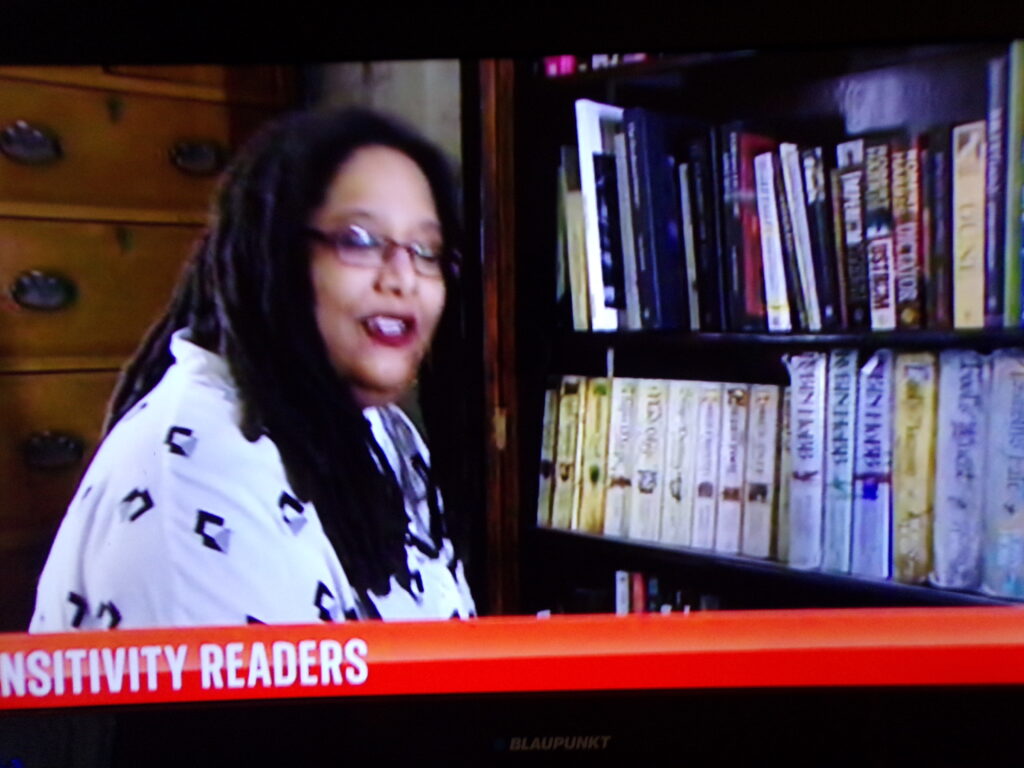

This is a comment on the following report on the Super Mario film which scored 56% with ‘the critics’ and 96% with the audience. Critics hate it because it features a white Princess who needs help from a white man. Viewers and readers must have what is officially agreed. This is the thin end of a very big divide and rule wedge.
The featured sensitivity image is of an NGO employed censor , although she calls her sort ‘super editors.’ Here job is to edit out ‘offensive passages and images’ from historic and classic work. She says it is important that books take account of how black people feel – as if they are homogeneous ! It is cultural editing of whites by arrogant conceited bitter blacks. They are egged on by self styled fake comfortable upper middle class white liberals who empower then to define whiteness.
I have added a picture of one of my very best friends , Vernon F Church. He had great faith in my future as a writer and musician. Thus he broadened my literary horizons to include the work of United States black Negro writer James Baldwin. Homosexual Baldwin was a troubled genius, producing work that was anything but black and white. He used his experience in haunting works like ‘Another Country’and ‘Giovani’s Room.’
What is happening now with these publishing gate keepers is anything but black and white. There have always been rich and powerful blacks , many crucial to the slave trade and slavery. Slaves were captured by black armed guards, then herded into stockades ,left waiting for ships crewed by victims of Press Gangs. BLM and other white activists don’t want that known. Poor Whites have always been slaves. We still have a vile class system. So do blacks. Censoring books and banning controversy is an elite driven thing , with know all ‘UniGirls’ and their sanitised English literature degrees. They have the power and auhority to judge ,but who gave it to them ?
R J Cook
Super Mario Movie’s ‘sensational’ box office takings defy poor reviews

By Ian Youngs
Entertainment & arts reporter
The new Super Mario Bros Movie has broken box office records, scoring the most successful global opening of all time for an animated film.
The family film – Hollywood’s second version of the hit Nintendo game – took $377m (£303m) around the world in its first five days on release.
That overtook the previous record of $358m (£288m) held by Frozen 2.
“The numbers are sensational,” noted analyst David A Gross, who said it would “easily be the #1 flick of 2023”.
In The Super Mario Bros Movie, the moustachioed Italian plumber is voiced by Chris Pratt, while Jack Black plays fire-breathing villain Bowser.
- Jack Black on Super Mario and the rise of game adaptations
- Video game movies: Are they really that bad?
It left many critics cold, with the New York Post’s Johnny Oleksinski saying it’s “just another soulless ploy to sell us merchandise” and The Guardian’s Peter Bradshaw calling it “tedious and flat in all senses”.
He added that it was “a disappointment to match the live-action version in 1993” – a reference to the infamous original adaptation starring Bob Hoskins.
But many fans seem to disagree, with the 56% critics’ score on Rotten Tomatoes eclipsed by the 96% audience score. Even Elon Musk tweeted that “the critics are so disconnected from reality!”

Crowds “didn’t seem to care about so-so reviews”, the Hollywood Reporter’s Pamela McClintock wrote.
The film broke other records, including the best-ever opening for a movie based on a video game and the top opening of 2023 so far, she said.
Comscore analyst Paul Dergarabedian told the outlet: “This is one of the biggest box office over-performances in recent memory and is absolutely shattering all pre-release projections.”
Post-pandemic box office fears
Variety agreed that the film “crushed already-high expectations”, while Screen Daily said it “pulled off a thunderous bow which shows the theatrical demand for family titles at a time when Hollywood executives are concerned about the depth of supply lines as the world emerges from the pandemic.
April 9th 2023
British Barbarism – The Odd Coppers by R J Cook.
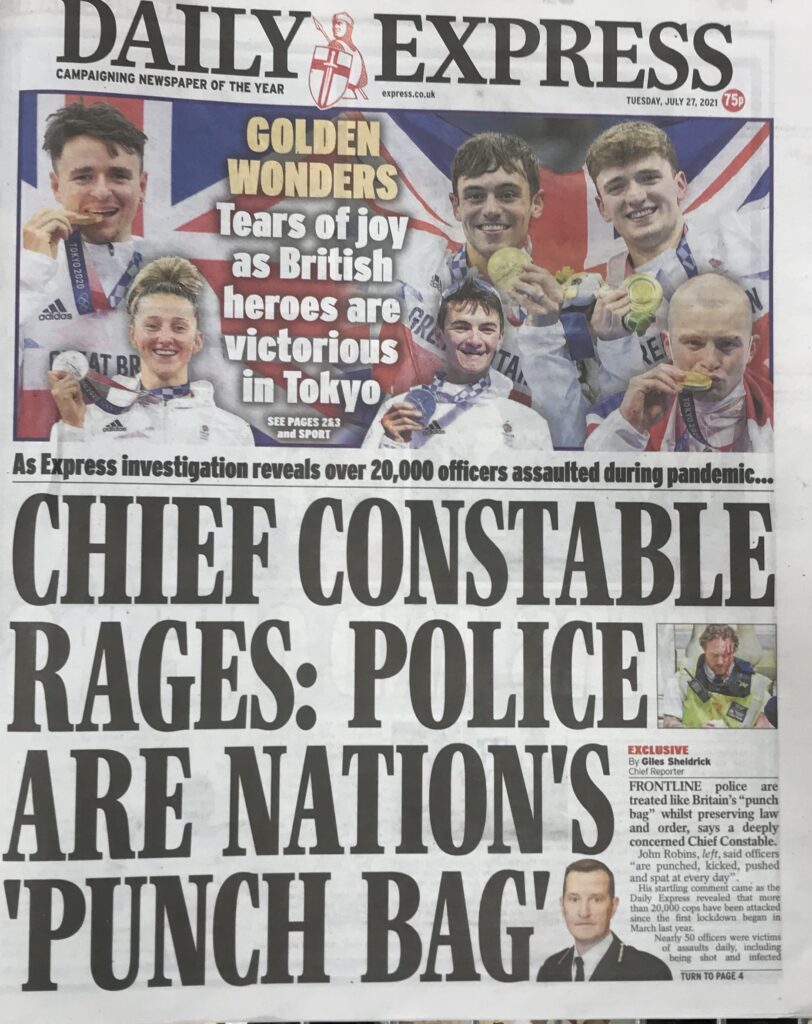
So Commissioner Sir Mark Rowley said about 90 officers had been moved away from fighting serious and organised crime to the Met’s professional standards team.
He told the BBC it was “nonsensical” he does not have power to sack officers.He is in a damage limitation exercise after his force was branded institutionally racist, transphobic, homophobic and misogynistic in a damning report.
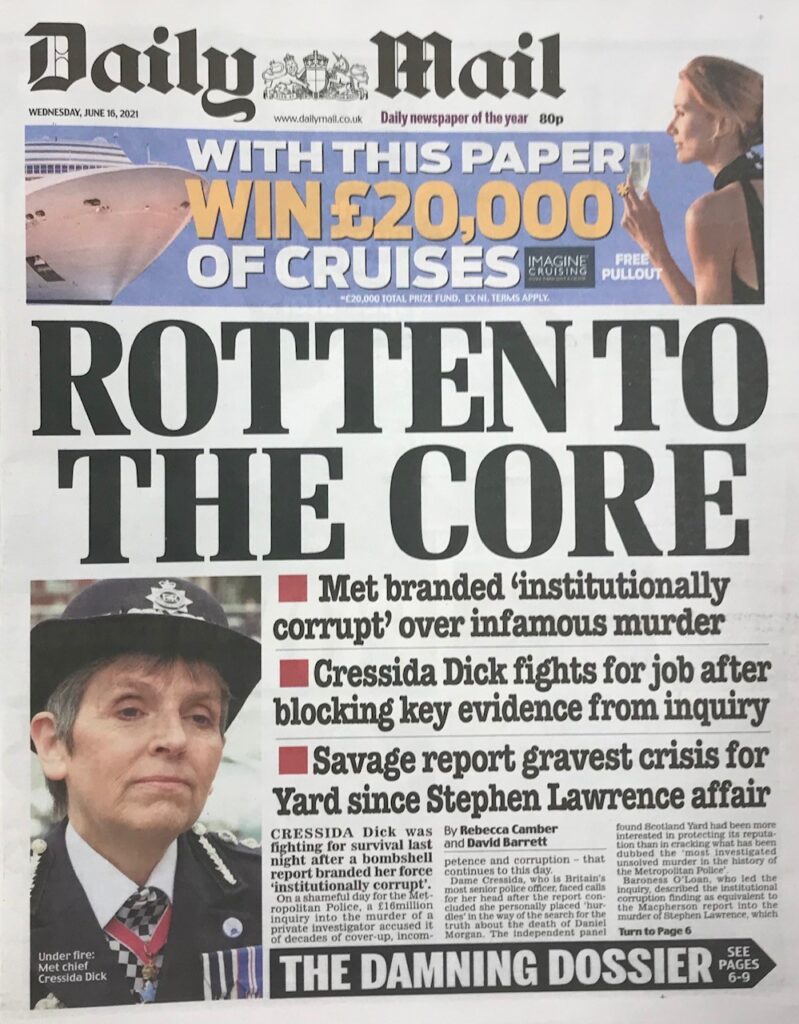
Chief Police officers get the kighthood to amplify their false God status. No actual democracy would hang on to these ludicrous tiles from an age of King Arthur’s Round Table & British Barbarism So one has to call Mark Rowley Sir or no doubt it will be an anti police hate crime to call him what he is. Rowley is anything but a new police broom and is lying about his powers of dismissal. It is well known in police circles that the only officers falling foul of the PSD are the ones their corrupt clique wants rid off, like Cleveland’s , long forgotten Chief Constable Sue Sim, who wanted to reform her force, break the corrupt senior officer moron culture and promote accountabilty. Parasitical senior officers conspired to get rid of her.
Rowley wants more ranks of great and good folk appointed to watchdog committees for the purposes of more cover ups. A jaded police officer friend ,the wrong sort for promotion, told me years ago : ” The Professional Standards Department are the most useless department in the police.”
The above report features the arrogant face of Dame Cressida Dick, the woman who got the top police job because she was the least tainted of the two shortlisted women. That was in spite of her giving the order to kill an innocent 28 year old Brazilian on a London tube train. The new commissioner just had to be a woman.
As a well trained social scientist, Oxford University examiner and college lecturer , I know that the best and most honest people do not get to the top in any organisation. No amount of diversity policies and courses will cure that problem. Liars , morons and cheats come in all genders , races , ages and clothing. Aspiring police officers know this. The police mentoring system gurantees that like recruits like. The likes of old hand Rowley should not be allowed to decide whether a police officer should be protected from or face dismissal. The Plebgate scandal illustrates this point beautifully.
A church going West Mercia police inspector had the audacity to conclude that 3 lying police officers should face gross misconduct hearings. The forces Deputy Chief Constable intervened , rewriting the report to exonerate the corrupt officers so they could go on lying and abusing the public for their own ends -Plebgate was ultimtately motivtated by Mirchell’s war on police overtime scams. West Mercia’s Deputy Chief Constable’s cover up was to protect them. We saw more of the same West Mercia corruption with the Dalian Atkinson’s West Mercia brutal racist police killing and 5 year cover up. The mind set of those banana republic style uniformed British senior police officers is truly terrifying in police state Britain.
Those well documented affairs shows exactly where senior UK police officers stand on corruption. Rowley wants more power to decide who gets sacked. The last thing he wants is a sharp toothed totally independent monitoring body ,with no knights, retired police fat cats, Dames or rampant feminists anywhere near. U.K police are learning more every day about how to exploit and profit from political correctness. True Independent monitoring means no bourgouse or police vested interests in sight.
Moreover, the masses must stop believing there is such a thing as a diversity based police recruitment system that will ever end police lies and corruption. Given the appalling quality -or lack of – in our MPs and government, there seems little hope of improvement. As I must keep saying , Britain is the last place to lecture the world on war crimes , democracy and human rights. The fate of Julian Assange, with mainstream Anglo U.S media’s disinterest, should explode the myths on that one.
R J Cook
April 6th 2023
Serving Met Police officers have been taken away from tackling serious crime and terrorism and instead told to investigate wrongdoing in the force.
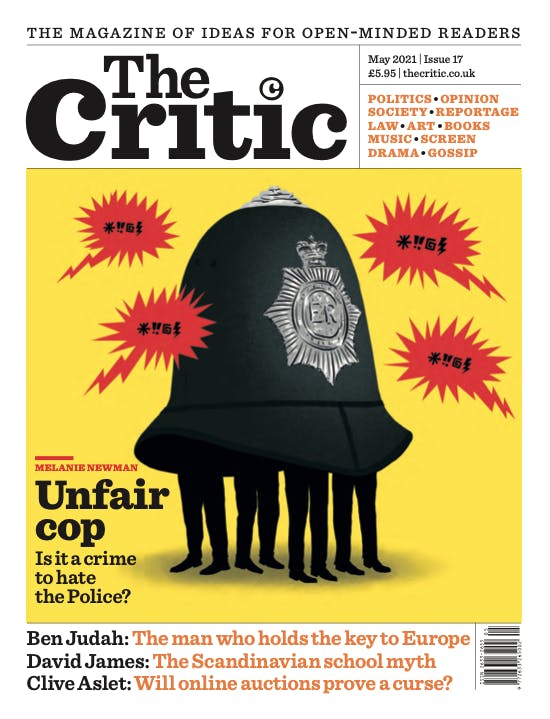
Commissioner Sir Mark Rowley said about 90 officers had been moved away from fighting serious and organised crime to the Met’s professional standards team.
He told the BBC it was “nonsensical” he does not have power to sack officers.
It comes after the force was branded institutionally racist, homophobic and misogynistic in a damning report.
In a letter to the Mayor of London and Home Secretary Suella Braverman, Sir Mark said officers had been diverted to the force’s Directorate of Professional Standards (DPS).
He said four in five of the original inquiries into officers accused of domestic and sexual violence in the last decade had not resulted in the correct action and should be reassessed.
“Not only have we increased our DPS by 150 people, but the scale and urgency of this work has meant diverting officers from other missions such as serious and organised crime and counter-terrorism,” he wrote.
“Over the last three months we have had, on average, 90 additional officers and staff from these areas supporting DPS.” Many had volunteered, he added.
During a listener phone-in on BBC Radio London on Friday in which he answered listener’s concerns about the force, Sir Mark criticised the Met’s disciplinary process.
“In all cases, I don’t have the final say on who’s in the Metropolitan Police. I know that sounds mad, I’m the commissioner,” he said.
He pointed out that independent legal tribunals can decide the Met has to retain officers even though the force wants to sack them, saying this one of the powers that had to be changed.
- Anger, disgust at Met but is there a positive future?
- What now for the Met? Because the clock is ticking
- Rape cases ruined, Sikh officer’s beard cut… five report findings
- The ‘dark corner’ of the Met where Wayne Couzens worked
Vetting rules in recruiting staff have been tightened, and in the next six months about 100 officers will have their status reviewed and “may well end up leaving the organisation”, Sir Mark told the BBC.
“We have hundreds of people who shouldn’t be here and the tens of thousands of good men and women here are as embarrassed and angered by that as anybody, and they’re helping us sort them out,” he added.
Sir Mark has previously said he was considering banning anyone with convictions, other than the most minor, from the force.
He told BBC Radio 4’s Today programme the current policy on accepting staff was “too permissive” and left “too much ground for interpretation”.
He added “complex” police regulations mean some officers under investigation have already been sacked by the Met, but were then reinstated by an independent lawyer.
Changes in the Met follow the murder of Sarah Everard by Met Police officer Wayne Couzens and the jailing of serial rapist and disgraced officer David Carrick.
A poll commissioned by BBC London found public confidence in the Met Police has been shattered.
Out of more than 1000 people surveyed, almost half of female respondents surveyed said they “totally distrusted” the Met following numerous controversies involving some of its officers.
Sir Mark took questions from BBC Radio London listeners, including one who said the police did nothing to help his 14-year-old son after he was robbed.
The Met Commissioner apologised that his force had not done its job and pledged to make community policing a key priority. “We’re going to stabilise that” and add more numbers to the force, he said.
Last month, a major review by Baroness Louise Casey branded the Met institutionally sexist, racist and homophobic, highlighting a “boys’ club” culture.
In January, after Carrick’s guilty plea, the Met announced plans to recheck staff accused of domestic abuse and sexual violence in the 10 years to April 2022.
Of 1,131 individuals reinvestigated:
- 246 will face no formal action because correct action was taken at the time
- 689 will undergo a new assessment to pursue new or missed lines of inquiry, including possibly talking again to victims and witnesses
- 196 face formal risk management measures and potentially a review to determine if they should remain in the force
All of these cases will be reassessed by an independent panel of experts, the letter said.
However, one survivor told BBC News she has little confidence the Met can change.
Brooke, not her real name, complained to the force in 2021 about sexual violence and domestic abuse by a serving senior officer but says she got nowhere, explaining: “It was like banging your head against a brick wall.”
April 5th 2023
Barge to house 500 male migrants off Dorset coast, says government
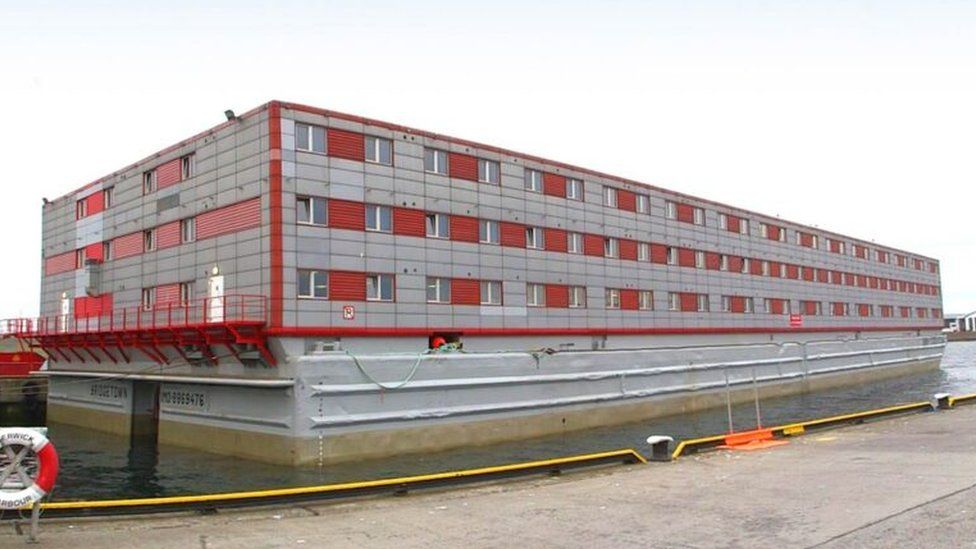
By Charley Adams
BBC News
About 500 adult male migrants will be housed in a barge on the Dorset coast “in the coming months”, the government has confirmed.
The plans have been criticised by local groups, refugee charities and Conservative MP Richard Drax, who said “every action’s being looked at”, including a legal case.
The vessel, which is currently in Italy, will be “significantly cheaper than hotels”, says the Home Office.
The government has not given a costing.
The three-storey barge called Bibby Stockholm will be located at Portland Port off the coastal town of Weymouth and used to house single men while they wait for their asylum claims to be processed. It will operate for at least 18 months.
As well as providing basic and functional accommodation, healthcare and catering, the berthed vessel will have security on board to minimise disruption to local communities, says the Home Office.
The boat, with 222 rooms, has been refurbished since it was criticised as an “oppressive environment” when the Dutch government used it for asylum seekers.
It now has en-suite rooms, a TV and games room and a gym, according to a fact sheet from its owners, Bibby Marine.
Housing migrants in hotels costs more than £6m a day, says the Home Office.
Refugee groups have called the plan “completely inadequate”, while councillors from the local area – which is popular with tourists – have opposed the proposals.
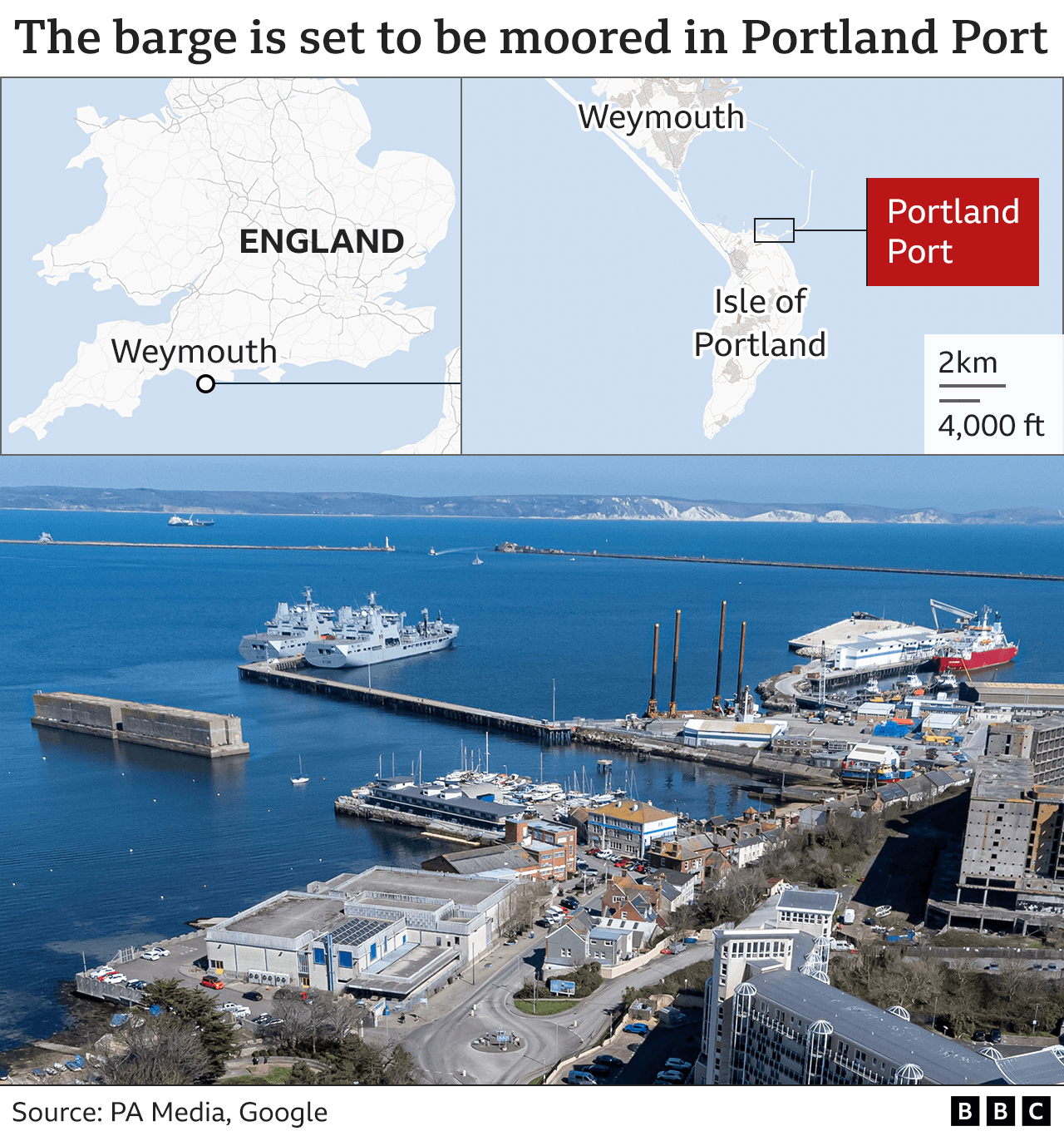
Prime Minister Rishi Sunak said the plans would save taxpayer money and reduce pressure on hotels, adding: “It’s part of our broader plan to stop the boats.”
“It can’t be right” that the country is spending so much on housing migrants in hotels, the PM told reporters in Peterborough.
Home Secretary Suella Braverman and Immigration Minister Robert Jenrick have both been instrumental in the plans.
It is the first time that migrants will be housed in a berthed vessel in the UK.
The Home Office said it was in discussion with other ports and further vessels would be announced “in due course”.
Charities and local councillors have opposed the plans, with the Refugee Council saying the barge will be “completely inadequate” to house “vulnerable people”.
“A floating barge does not provide what they need nor the respect, dignity and support they deserve,” said chief executive Enver Solomon.
Amnesty International called for the plans to be abandoned, and said use of the barge to house migrants was a “ministerial cruelty”.
Dorset Council said it had “serious reservations” about the suitability of Portland Port as a location, adding: “We remain opposed to the proposals.”
The British Red Cross said that docked barges did not “offer the supportive environment that people coping with the trauma of having to flee their homes need”.
Christina Marriott, the charity’s executive director of strategy and communications, called for a “more effective and compassionate asylum system” that would help people integrate into a community.
Mr Drax, whose constituency includes Portland, told BBC News on Tuesday he was “very concerned” about the impact on the area which “relies on small businesses”.
This comes weeks after the government announced plans to tackle small boat crossings through the Illegal Immigration Bill.
The legislation would mean anyone found to have entered the country illegally would not only be removed from the UK within 28 days, but also be blocked from returning or claiming British citizenship in future.
Bill Reeves, chief executive of Portland Port, said he encouraged “everyone in the community to approach this with an open mind”, adding that during the vessel’s preparation there would be close ties with the local community and voluntary groups.
Meanwhile, Labour criticised the plans, with shadow home secretary Yvette Cooper calling the announcement a sign of the government’s “failure to clear the asylum backlog”.
She said: “This barge is in addition to hotels, not instead of them, and is still more than twice as expensive as normal asylum accommodation.”
Speaking ahead of the announcement, the leader of the Liberal Democrats expressed his “worry” that the government was imposing this on local communities.
Sir Ed Davey said the Conservatives should “process applications quickly” to ensure “refugees could then get on with their lives”.
Related Topics
The Rising Price The Rich Don’t Pay. They Profit From Mass Misery They Inflict – R J Cook.

Comment The logic of the U.K Lunatic Asylum system is that however these strangers arrive on U.K shores they should be waved straight through, given generous benefits and luxury accommodation. Anyone having difficulteis mid channel should be picked up a circulating Border Force and RNLI fleet – on humanitarian grounds. Long term policy should be to airlift or ferry as much of Africa’s overpopulation to England for a better life. It is no matter that current illegal immigrants /asylum seekers cost the hard pressed tax payer £5.5 million a day for hotel accommodation and living expenses. That totals :
£ 2,007,500,000 a year and rising. A drop in the ocean really and there are more on the way, which is wonderful news for us humanitarians. Add to this the cost of the Ukraine war, the fallout from COVID lockdown and precious ongoing public servces pay rises and you see how wonerfulit is to be part of the noble British Democracy that leads the world in moral hypocrisy.That is why the good people of affluent olde worlde Poole do not want the asylum centre barge in their part of the world. Migrants should live with the poorer folk – because they have nothing to lose by migrant related crime danger -being lectured about racism by rich multi millionaire tax dodgers like Gary Lineaker.
R J Cook.
April 2nd 2023
More Everyday Life In Police State Britain – by R J Cook
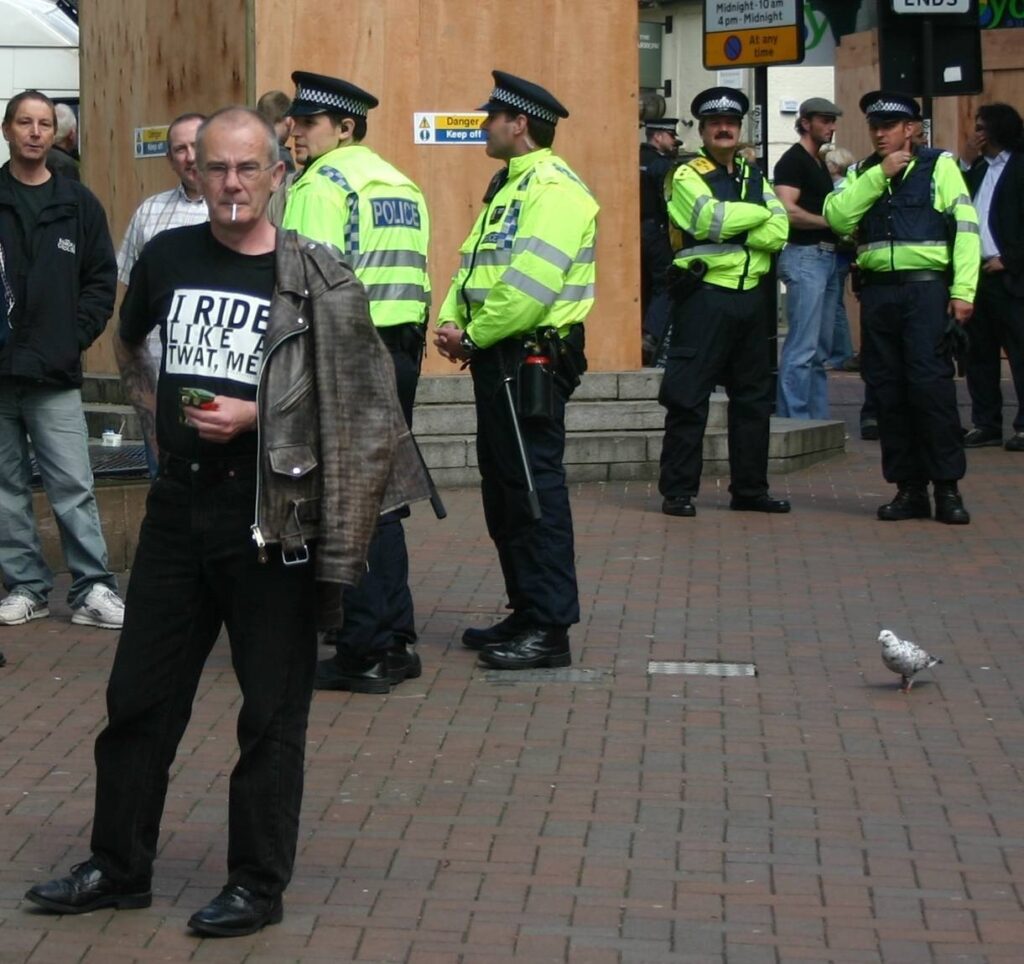
Britain’s self styled liberal left have no interest in global or demographic dynamics. Liberated from tyrannical Roman Catholicism because it was the only way Henry VIII could get a divorce, Britain became home to the Industrial Revolution with the greatest empire in history. The pigeons are still coming home to roost while the Anglo U.S exceptionalists poor more fuel on the fire in the Middle East, Russia, China and Ukraine. No elite does pomp ,circumstance and glorification of war better than Britain.
The British Empire included the seed of the United States , where its’ elite still look back for much of their history whatever diversity it may these days lay claim. The outcome is a dangerous symbiotic relationship leading the NATO proxy war on Ukraine in the name of defending and recruiting a fellow corrupt excuse for a nation carrying the absurd brand name ‘western style democracy.’
Britain’s inbred predominantly Norman elite are a class ridden society with social mobility increasingly restricted – social reality defined by them and elite media. That is why there will never be police reform worth the name. Britain’s ruling class led the war on Russian communism from the word go. Britain’s police have recently been revealed for what they are , a standing army to keep the population in place,whatever it takes.
So the ruling and related chattering classes welcome mass immigration from backward repressive religious bigoted Africa in the name of humanitarianism. These people arrive demanding a better life ,many without evidence of any form of identity. Generous benefits have been a magnet pulling these opportunists across Europe and setting an impossible standard with the lower classes paying the bill.
Meanwhile indigenous homeless get little help beyond blame. Africa’s hedonistic thieving conniving manipulative hypocritical African leaders must not be called to account for rampant overpopulation, deforestation ,disease,birth defects, famine or any other consequences. Above all Russian and Chinese initiatives to improve the situation are blocked by western arms. So the migrants keep coming, the poor will pay while the rich profit.
When these people arrive in large numbers, helped across the Channel by Border Force ( Farce ) and the RNL1, they bring the backward looking culture , that has kept Africa in the war torn tribalistic dark ages for centuries , with them. Some of us see the propaganda calling this diversity for the con trick it is. If we say anything we are labelled racist because diversity and humanitarianism are the chattering class’s buzz words. Feminism plays a key part stoking up moral self righteousness outlawing criticism.
Don’t dare say that this is why public services are failing, including schools. These days OFSTED school inspectors listen out for signs of racist and misogynistic language in the playground punishing the school and parents accordingly. That is more about every day POLICE STATE BRITAIN.
R J Cook
Braverman insists Rwanda is safe for migrants
Related Video and Audio

Video 2 minutes 14 seconds
Video 2 minutes 14 seconds2:14
Play video I am convinced Rwanda is safe – Home secretary from BBCI am convinced Rwanda is safe – Home secretary
- BBC

Video 51 seconds
Video 51 seconds0:51
Play video I cried, I laughed, I cried – Judy Blume on new film from BBCI cried, I laughed, I cried – Judy Blume on new film
- BBC
Summary
- Home Secretary Suella Braverman has insisted the government’s plan to send some migrants to Rwanda is legal and that the country is safe
- Her assurances came after she was confronted by Laura Kuenssberg with evidence that 12 refugees were shot by police there in 2018
- Braverman said she wasn’t familiar with the case and considered it an extreme and rare situation
- Lisa Nandy, the shadow levelling up secretary, branded both the Rwanda plan and Braverman’s claims about it “outlandish nonsense”
- She also said the government is to blame for the UK’s “broken asylum system”
- Elsewhere, author Judy Blume told the programme US politicians were “drunk with power” in light of so-called Don’t Say Gay proposals
Live Reporting
Edited by Sam Hancock
- Posted at 11:2711:27Key takeawaysIf you’re just joining our live coverage, it’s been a busy morning of political interviews on the BBC’s Sunday with Laura Kuenssberg. Here’s a round-up of everything you might have missed.ImmigrationThe government’s plan to send some asylum seekers to Rwanda dominated the political discussion on today’s programme. Home Secretary Suella Braverman insisted it’s a legal scheme and the country’s safe despite being informed by Kuenssberg about an incident in 2018 that saw a dozen protesters from a Rwandan refugee camp shot dead by police.When it came to her previous ambitions that net migration could fall to tens of thousands, she refused to be drawn on whether that was still the plan. Braverman also confirmed that “all sorts of land and sites and vessels” were being considered for migrant accommodation and the aim was to roll out the sites “very quickly”.Shadow levelling up Secretary Lisa Nandy was quick to dismiss the plan, and Braverman’s claims about it, as “outlandish nonsense”.
BBCCopyright: BBCChild sexual exploitationWhen it came to new laws on child sex exploitation, there was some agreement between the two.Under new government plans, people who work with children in England will be legally required to report child sexual abuse or face prosecution. Nandy said she would “100% welcome it” but said the changes must be implemented without delay.Artificial intelligence and a word from Judy BlumeAway from party politics, we also heard from billionaire tech engineer Jann Tallinn and his concerns about the rapid development of AI.And author Judy Blume told of her joy at seeing her widely acclaimed novel Are You There God? It’s Me, Margaret on the big screen after its publication more than 50 years ago.
April 1st 2023
Dover ferry queues: Extra overnight English Channel crossings laid on to clear backlog
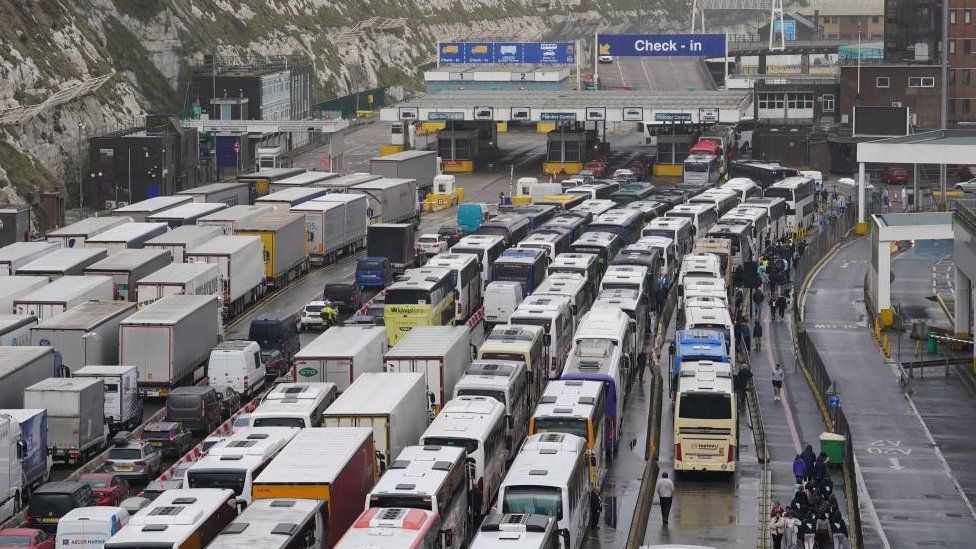
By Malu Cursino
BBC News
Additional sailings will be put on overnight by ferry operators at the Port of Dover, as it works through the Easter traffic backlog.
Delays were first reported on Friday night, and some passengers waited 14 hours to board their ferry to France.
Strong winds, a large volume of coaches and slower processing times at border control were cited as reasons.
Doug Bannister, the port’s chief executive, said his team anticipate the backlog will be cleared overnight.
P&O Ferries and DFDS Seaways initially reported disruption to their ferry services late on Friday.
Coach passengers were particularly badly hit, with many having to wait at the port all through the night on Friday.
Throughout Saturday, many passengers shared their ordeals with the BBC, with some calling the situation “carnage”.
The management for the port apologised for the “prolonged delays” and said the backlog was being cleared.
On Saturday evening, Mr Bannister said: “My ops team is anticipating that we will get through all the backlog, including all the people that wanted to travel today, overnight.”The ferry operators are laying on additional sailings overnight to try and accomplish that, so hopefully by about midday tomorrow we’ll be back to normal operations.”
In a statement to the BBC, the Port of Dover said both P&O and DFDS are adding additional sailings tonight.
Ferries usually have a longer gap between sailings at night, but they are now “basically just running back and forth to clear as much as they can”, the port’s communications team explained.
The port also said long border processing times were partly to blame for delays, while some ferry companies said bad weather had disrupted travel.
Cars can be boarded much quicker than a coachload of separate passengers and the port said that ferry companies had received 15% more coach bookings for the Easter period than the port had initially anticipated when it began planning four months ago.
Responding to the claims of lengthy delays in checks at the border control point, the regional prefecture in northern France said that there were “no difficulties that we know of”, but that lots of coaches had arrived to travel at around the same time.
All border checkpoints were operational and border police had changed some car checkpoints into slots for coaches, it added.
Many coaches stick in Dover were carrying schoolchildren from different parts of the UK who were travelling to Europe on school trips.
Parent Claire Bryant, whose 12-year-old daughter is on her first-ever ski trip with fellow pupils from Cardiff’s Radyr Comprehensive, said their “nightmare” began on Friday at 18:00 BST and continued on Saturday.
Ms Bryant said the pupils had since crossed the Channel but were now waiting for an additional driver in Reims, as their current driver had reached his driving hours’ limit.
“They should be skiing right now – instead they’re at Burger King,” she said.
“It was supposed to be a 20-hour journey. I don’t know how long it will be for a replacement [driver].”
A UK government spokesperson said it remained in close contact with ferry operators and authorities. Labour leader Sir Keir Starmer said the government needed to “get a grip” of the situation at Dover.
Simon Calder, travel correspondent at the Independent, said processing times since leaving the EU had increased sharply “and that would seem to explain the delays”.
Speaking to BBC Breakfast on Saturday, he said that having an EU border at Dover meant things were “gumming up”, and that each individual passport must now be inspected and stamped.
This means that coach loads of passengers must disembark to have their passports checked, adding to delays.

March 31st 2023
Elite’s immigration agenda divorced from ordinary Brits

| The gulf between what ordinary people think about immigration, and how the power elite view the issue, has become all too apparent again this week. Please do watch this exceptional clip of Professor Matthew Goodwin being interviewed on Talk TV by Mike Graham. He expounds on the new governing class of elites who have disproportionate influence and exert enormous cultural power in the national conversation. They decide what we can and can’t talk about, the language we use and how we should perceive events and actions. Prof Goodwin cites immigration as an example of an area where there is already a huge and growing disconnect between the new elite and the majority of the country. Along similar lines, Poppy Coburn in Conservative Home this week wrote another brilliant piece in which she noted that a whole industry of charities are part of a billion pound sector, partly funded by taxpayers’ money, intent on undermining the very policies that British voters have elected politicians to carry out. Again, no more is this evident than with regard to immigration policy. Meanwhile the government’s new Immigration Bill has been making its way through parliament. Some robust amendments were proposed (held back after government reassurance), which we considered both sensible and necessary if loopholes were to be closed. You can read our comment here. At times, there is no avoiding official obfuscation and spin. We will do our utmost to unpick both and provide you with the facts so you can make up your own mind. |
| Channel Crossing Tracker Our Channel tracker has been a go-to for anyone after the facts on illegal boat crossings since the problem began to escalate in October 2018. As it becomes increasingly hard for ordinary people to access the data on immigration and in particular the illegal Channel crossings, we have revamped our Tracking Station. The brand new tracker has interactive charts and will be fully automated every day around noon, to include the latest data on Channel crossings. There is now a one-stop shop for the unvarnished truth on illegal immigration, free of the propaganda and distortions. Read the full page here. |
| MIGRATION WATCH UK IN THE NEWS |
| Telegraph: Tories hit out at ‘gimmick’ plans to house migrants on ferries and barges Alp Mehmet, the chairman of Migration Watch, said he did not “take seriously” the barge proposals and claimed the Government wanted to “give the impression” it was taking action. “We’re a long way from putting in place arrangements that are going to lead to lots of people not having to stay at hotels,” he said. Talk TV: Will migrants be housed on giant barges? ‘There’s a bit of a smokescreen going up at the moment just to show that there is action being taken.’ ITV: Albanian migration into Britain ‘Given that over a million people immigrated to Britain last year and net migration was over half a million, it’s hard to imagine that the government can come up with more routes for them.’ |
| MAKE YOUR VOICE HEARD |
| The more they squirm the clearer it becomes that our leaders are worried, and the greater will be the attention paid to what will appeal to the electorate. They want your vote because they want to be elected. Please write today to remind your MP that he/she must commit, unequivocally, to policies that will control, and reduce, immigration; their job is on the line. |
| We wouldn’t be able to continue this work without the help of our supporters. If you would like to donate, please click the button below. Our supporters are all as concerned about the future of our country as we are. Some have been kind enough to remember us in their will. If you wish to consider leaving a bequest to Migration Watch UK, or wish to discuss anything else, do please get in touch. Our email is: admin@migrationwatchuk.org |
The Guardian view on police reform: a national imperative
This article is more than 1 year old
The case for radical change has been well made and is widely accepted, but the Home Office and home secretary are incapable of delivering itSun 13 Mar 2022 18.03 GMTLast modified on Sun 13 Mar 2022 18.10 GMT
Forty years ago, the BBC broadcast a documentary series titled Police. In the most influential episode, the pioneering director Roger Graef, who sadly died this month, filmed three bullying male detectives interviewing a distressed rape victim in Reading police station. The footage caused a sensation. The furore led directly to tighter rape questioning guidelines.
Four decades on, not enough has changed in British policing. A month ago, Dame Cressida Dick resigned after the revelation that 14 Metropolitan police officers had been sharing misogynistic and racist messages for at least two years. Since Sarah Everard’s murder a year ago, trust in the police has fallen to record low levels; a majority now lack confidence in them to deal with crime in their local area. A high court ruling on Friday against the Met over its efforts to cancel a vigil for Ms Everard shows the yawning sensibility gap between the force and the public.
Last week, two new reports underscored the unprecedented seriousness of this crisis. The first, the result of a comprehensive review chaired by Sir Michael Barber for the independent Police Foundation, warned that policing in Britain is at a crossroads. In what amounts to a red alert for public order, it said that, without urgent change, the principle of policing by consent that has defined this country’s policing for decades risks being destroyed. The Barber team published 56 interconnected recommendations for reform, not just to police culture, but also to training, skills and organisational structure.
Two days later, the chief inspector of constabulary for England and Wales echoed several of the same things. After a decade in post, Sir Tom Winsor ended his final review by saying there remain major shortcomings in British policing, that problems must not be underestimated, and that they are not confined to London. He told the 43 forces of England and Wales that they must operate as a unified network to become fitter for purpose. He warned that the current recruitment of 20,000 new officers risks hiring too many of the same kind of people who have done such reputational damage to the service.
The reports are complementary. Both grasp the urgency for change. Both stress the neglected primacy of crime prevention. Both see neighbourhood policing, abjectly downgraded in many areas, as the bedrock of public confidence. Both say more spending and better training are essential. Both call for a change in police governance. Both stress the revolution in online crime. Sir Tom’s warning that children are now in greater danger in their bedrooms than in the streets is chilling.
Yet very little in the two reports is categorically new. Britain’s modern policing system has faced repeated calls for reform, most powerfully after the 1981 riots and the 1993 murder of Stephen Lawrence. The issues have often been variations on the same themes: mistreatment of women, racism, police culture, unnecessary violence, complaints handling, structures and accountability. Although there have been periods of reform and progress, they have not been maintained and have sometimes even gone into reverse, as at present.
A bigger and more lasting reform is therefore needed. But it is hard to see the Home Office, with its shattered departmental reputation and its obsession with immigration control, being capable of delivering it. It is inconceivable that the home secretary, Priti Patel, is capable of leading such a process either. Pending the election of a different government, the onus rests on the rising generation of police chiefs, College of Policing managers and local community leaders to do what they can to prepare the ground. The urgency, though, is beyond doubt. The stakes, as the Police Foundation report confirms, could hardly be higher.
George Floyd and the need for UK police reform
Stephen Black on why the police complaints system needs to change fundamentally and Ruth Baker on how a video by a 17-year-old was crucial to the case
LettersThu 22 Apr 2021 18.17 BSTLast modified on Fri 23 Apr 2021 04.37 BST
While the guilty verdict in the George Floyd case is to be welcomed, we are very far from the culture change required if policing with consent is to become a reality (Derek Chauvin found guilty of murder of George Floyd, 21 April). In numerous incidents in the US and the UK, overzealous actions of the police have been captured for all to see, but have you ever seen or heard a fellow officer intervening or condemning them? In the George Floyd incident, two other officers did not regard the restraint as unlawful and made little attempt to prevent or advise their fellow officer.
Families often have to wait many years for incidents of death in custody to be heard by the UK coroner’s court, and how many times has the verdict included the message that evidence presented by the police is simply not believed?
A culture change will only truly occur with a reformed system of complaints, where investigation teams are not dominated by former police officers. If it is right that the actions of members of a criminal gang can be prosecuted under “joint enterprise” legislation, why not the police? It may end the culture of passively standing by while another member of the public suffers, especially if they are being filmed and their misplaced loyalty is likely to examined in a court of law at a later date rather than the comfort of the inspector’s office.
Stephen Black
Kettering, Northamptonshire
Your report on the conviction of Derek Chauvin gives due credit to Dr Martin Tobin, the pulmonologist who gave his graphic testimony for the prosecution without charging a fee.
However, what was remarkable was the fact that his testimony was only made possible by the evidence of a 17-year-old girl who had the presence of mind not just to stare in horror and protest but to video the crucial nine minutes and 29 seconds of the murder on her phone.
It was this that enabled Dr Tobin to painstakingly dissect the video evidence and explain to the jury, step by step, the asphyxiation of Floyd, to the extent that the CNN commentators declared that Dr Tobin’s evidence should in future be used as a teaching aid to all students of asphyxia.
Ruth Baker
Matfield, Kent
March 29th 2023
| TRENDING ARTICLES |
| WATCH: British Government’s video explaining Troubles in Northern Ireland to schoolchildren A NEWLY published video is designed to help schoolchildren learn about the Troubles in Northern I… BY: Fiona Audley |
March 27th 2023
Who is Humza Yousaf, the new SNP leader?

By Stuart Nicolson
BBC Scotland News
Humza Yousaf has been elected to succeed Nicola Sturgeon as SNP leader and Scotland’s next first minister. He was widely seen as being the preferred candidate of the SNP establishment – including Ms Sturgeon herself.
The health secretary was endorsed by far more MSPs and MPs than his two rivals, with Deputy First Minister John Swinney predicting that Mr Yousaf would “complete our journey to independence”.
He is undoubtedly the most experienced of the three leadership contenders, having served in government since 2012 in roles including justice secretary and transport minister.
His supporters say he is a polished communicator who is best placed to unite the party and maintain the power-sharing agreement with the Scottish Greens after what has been a deeply fractious leadership contest.
The ‘continuity candidate’
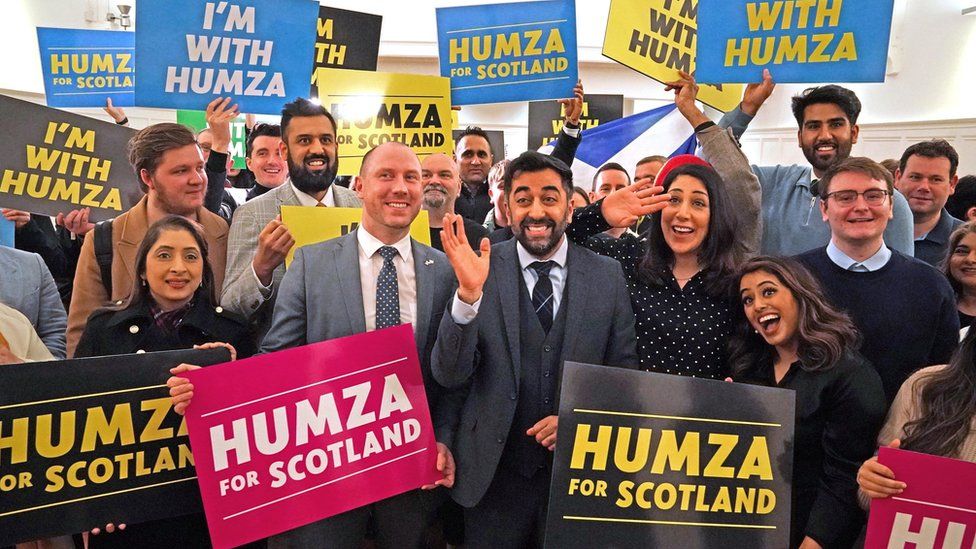
Mr Yousaf is a close ally of Ms Sturgeon and is generally seen as the “continuity candidate” who would seek to continue the work of the outgoing first minister.
He is the only one of the three contenders to have said they would challenge the UK government’s block on Ms Sturgeon’s controversial gender recognition reforms in the courts, arguing that independence will only be won if the party continues to push “progressive values”.
But he has stressed that he would only go to court if the legal advice suggested that a challenge could be successful.
Mr Yousaf has distanced himself from Ms Sturgeon’s plan to use the next election as a de facto referendum, saying that he would instead seek to build a “consistent majority” in favour of independence and it “isn’t good enough to have polls that put support for independence at 50% or 51%”.
But he has attempted to reach out to more impatient independence supporters by saying he would consider calling a snap Holyrood election to test support for leaving the UK.
Mr Yousaf also rejected claims that the party hierarchy was doing everything it could to ensure he won the leadership contest following allegations that the shortened campaign was specifically designed to favour him.
And he has said he would be willing to listen to concerns over controversial policies such as proposals for a new national care service and the bottle return scheme.
‘Do things my own way’
BBC Scotland sat down with SNP leadership candidate Humza Yousaf.
Speaking to the BBC Scotland’s Sunday Show earlier in the contest, Mr Yousaf insisted that he was his “own man and will do things my own way”.
Mr Yousaf added: “I have a lot of admiration, as you would imagine, for the excellent work Nicola Sturgeon has done as first minister.
“But she had a certain leadership approach. Mine would be less inner circle and more big tent.”
Critics claim that Mr Yousaf has “failed upwards” with few accomplishments to show for his time in government, with Labour’s Jackie Baillie describing him as “the worst health secretary on record” who “now aspires to be the worst first minister on record”.
But the most withering assessment has come from his fellow SNP leadership contender Kate Forbes, who told Mr Yousaf during a live STV debate that: “You were transport minister and the trains were never on time, when you were justice secretary the police were stretched to breaking point, and now as health minister we’ve got record high waiting times”.
Mr Yousaf’s clashes with Ms Forbes were a key feature of the contest, with Mr Yousaf claiming his rival’s views on social issues such as gay marriage, trans rights and abortion would see the party “lurch to the right”.
But Mr Yousaf has also faced questions over his failure to take part in the final vote on gay marriage in 2014, which he said was due to having a vital meeting about a Scot who was being held on death row in Pakistan on blasphemy charges.
Alex Salmond, who was first minister at the time, told Sky News that Mr Yousaf had missed the vote because of religious pressure from a Glasgow mosque – an allegation Mr Yousaf has strongly denied.
The first Muslim leader of a major UK party

When the 37-year-old is confirmed as Scotland’s first minister, he will make history as the first ethnic minority leader of a devolved government and the first Muslim to lead a major UK party.
His father is originally from Pakistan and emigrated to Scotland with his family in the 1960s, while his mother was born into a South Asian family in Kenya, and Mr Yousaf has often spoken of the racist abuse he has received.
He was forced to call the police after allegedly receiving threats at the start of the leadership contest, with a 25-year-old man and 35-year-old woman being arrested and charged.
Mr Yousaf was educated at the Hutchesons’ Grammar private school in Glasgow, where he was two years behind Scottish Labour leader Anas Sarwar.
After studying politics at Glasgow University, he briefly worked in a call centre before becoming a parliamentary assistant to SNP MSP Bashir Ahmad and later an aide to Alex Salmond.
Mr Yousaf was elected as a list MSP for the Glasgow region in 2011, with Mr Salmond promoting him to minister for Europe and international development just a year later.
He became transport minister in 2016 after winning Glasgow Pollok from Labour, which made him the first ethnic minority candidate to win a constituency seat in the Scottish Parliament.
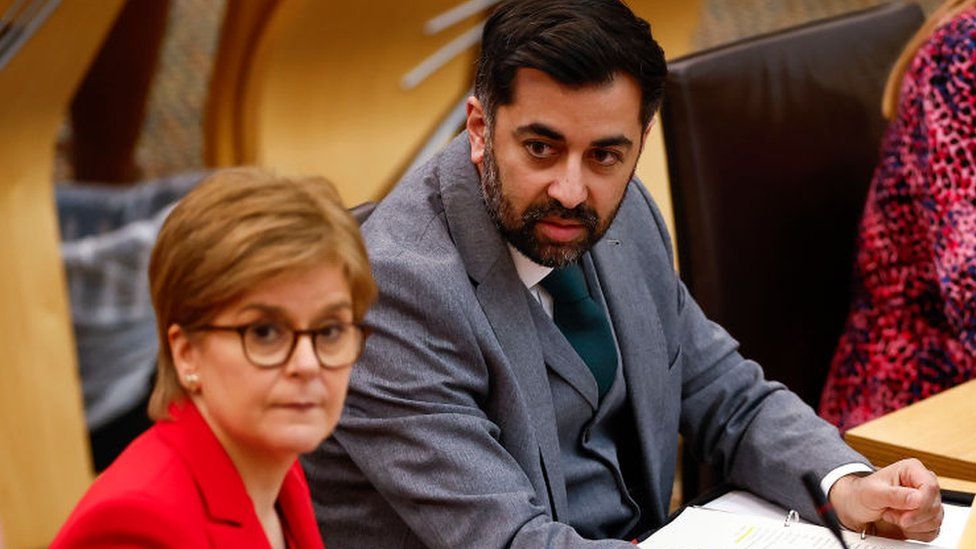
Six months after taking on the transport portfolio, Mr Yousaf faced the embarrassment of being fined £300 and having six penalty points added to his licence after being stopped by the police while driving his friend’s car without the proper insurance.
He also faced criticism for the performance of ScotRail after Abellio took over the contract to run the rail franchise, which ultimately led to it being nationalised.
Mr Yousaf was promoted again in 2018 when Ms Sturgeon named him as the new justice secretary as part of a reshuffle of her cabinet team.
But his flagship hate crime bill was mired in controversy over fears that the new offence of “stirring up hatred” could have a major impact on freedom of speech.
Critics said the legislation could lead to libraries and bookshops being prosecuted for having contentious books on their shelves, with the new law also potentially criminalising people for private conversations in their own home.
The bill was described by former SNP deputy leader Jim Sillars as being “one of the most pernicious and dangerous pieces of legislation ever produced by any government in modern times in any part of the United Kingdom”.
It was eventually passed by MSPs in March 2021 after a series of changes were made, but has still not become law.
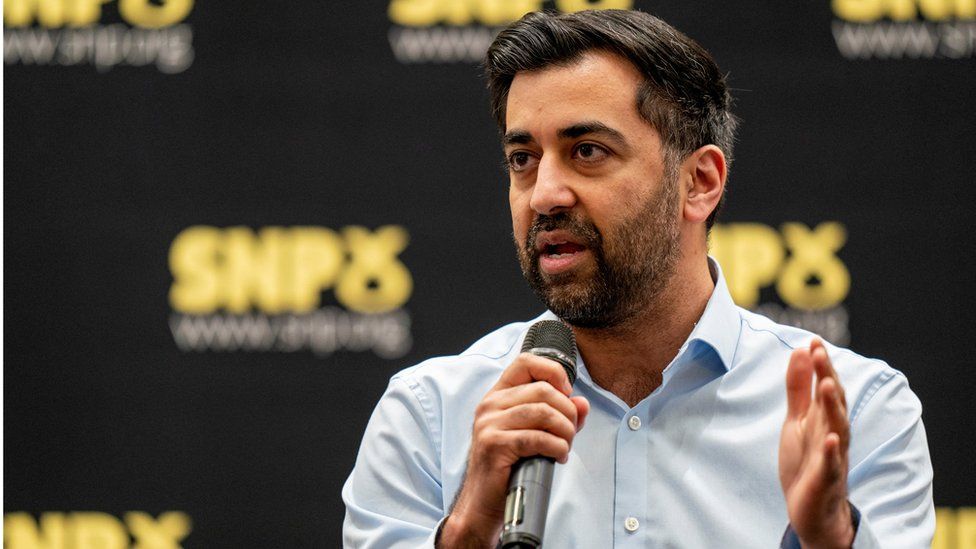
Mr Yousaf was also criticised for tweeting about his “disgust” over a video supposedly showing Rangers players using sectarian language that quickly turned out to be fake.
And he dismissed concerns about the state of Scotland’s police buildings as “hyperbole” just hours before the ceiling collapsed at Broughty Ferry police station near Dundee. Mr Yousaf had recently moved to the town.
Within three weeks of becoming health secretary in May 2021, Mr Yousaf apologised for any “undue alarm” he had caused by wrongly claiming that 10 children had been hospitalised “because of Covid”.
He also famously fell off a knee scooter that he was using in the Scottish Parliament while recovering from a ruptured Achilles tendon that he had suffered while playing badminton.
When video of his tumble was tweeted by BBC Scotland political editor Glenn Campbell, Mr Yousaf replied: “If anyone else had fallen over while on crutches, a knee scooter, or in a wheelchair would your first instinct be to film it & tweet out?”
His time as health secretary has been characterised by soaring hospital waiting times – although Mr Yousaf points out that these problems are not unique to Scotland, and that the country is the only part of the UK to have avoided strikes by NHS staff.
Mr Yousaf’s supporters – who include the SNP’s Westminster leader Stephen Flynn as well as Mr Swinney – point to his achievements, such as delivering the Queensferry Crossing on time and under budget while he had responsibility for transport and falling crime figures while he was justice secretary.
Mr Flynn said he believed Mr Yousaf was best placed to tackle the country’s economic challenges and praised his plan to fast-track the expansion of childcare to one and two-year-olds as a “real gamechanger for both working families and the wider economy”.
Nursery discrimination row
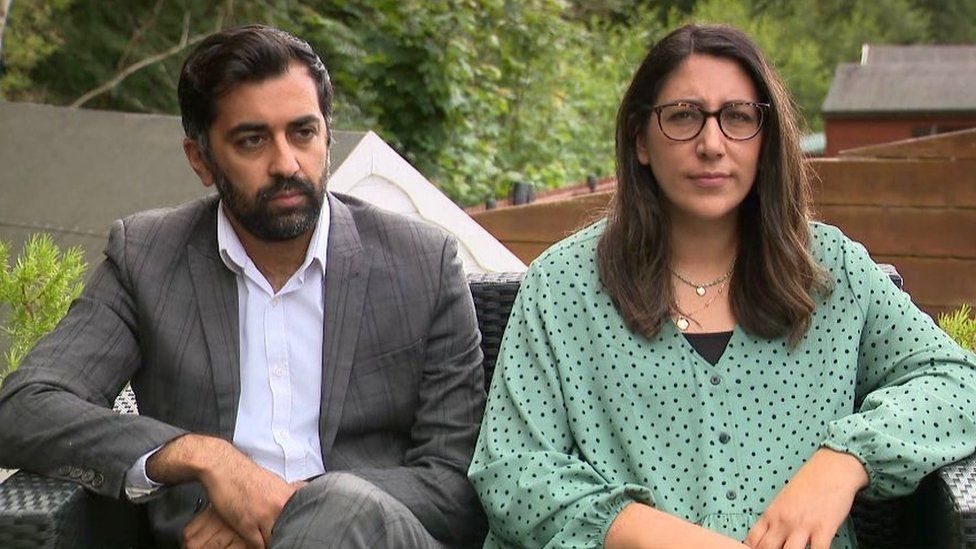
Mr Yousaf and his wife Nadia El-Nakla – an SNP councillor in Dundee – recently dropped a £30,000 legal claim against a nursery they had accused of discrimination.
The couple claimed to have been told there was no space for their daughter at the nursery in Broughty Ferry, but that applicants with “white Scottish-sounding names” were accepted.
The nursery had said any claim that it was not open and inclusive to all was “demonstrably false” and that it had been forced to spend tens of thousands of pounds “defending our small nursery against their false claims”.
The Care Inspectorate had previously upheld a formal complaint made by Mr Yousaf and Ms El-Nakla about the nursery.
Related Topics
- Ash Regan
- Nicola Sturgeon
- SNP leadership contest 2023
- Kate Forbes
- SNP (Scottish National Party)
- Humza Yousaf
March 26th 2023
UK is poorer as a country, says Michael Gove
https://emp.bbc.co.uk/emp/SMPj/2.47.3/iframe.htmlMedia caption,
Watch: Michael Gove says the Ukraine war and Covid pandemic made the UK poorer
By Daniel Thomas
Business reporter, BBC News
The UK is poorer than it would have been, partly due to the war in Ukraine, but also the pandemic, Levelling Up Secretary Michael Gove has admitted.
But he said ministers were taking action on the soaring cost of living, including giving help on energy bills.
The head of the independent forecaster, the Office for Budget Responsibility (OBR), said living standards were seeing their biggest squeeze on record.
Richard Hughes said Brexit had been similar to the pandemic in its impact.
“It’s a shock to the UK economy of the order of magnitude to other shocks that we’ve seen from the pandemic, from the energy crisis,” he told the BBC.
Poor productivity had also hurt growth, he said.
And he warned living standards would not return to pre-pandemic levels for at another five to six years.
Asked whether he agreed with the OBR’s assessments, Mr Gove said economic forecasting was “a very difficult exercise”. He added that the UK was dealing with “the aftershocks of two significant events”.
“[There’s] both the war in Ukraine, the first time we’ve had war on this scale on the continent in Europe since the Second World War, and the Covid pandemic, the biggest global health pandemic since the end of the First World War,” he told the BBC’s Sunday with Laura Kuenssberg programme.
“They have had a huge effect on our economy and on others’ economies.”
Mr Gove denied that the government was to blame after 13 years in power, but added: “One can always do better, yes.”
However, he insisted ministers were taking action to address soaring inflation – the rate at which prices rise – by taxing oil and gas firms’ profits and lowering household energy bills.
He also said the Budget had taken steps to help people back to work and to help families, including with childcare.
The OBR forecasts that inflation will fall below 3% this year – down from 10.4% currently – as food and energy prices rise less quickly.
But speaking on the same programme, OBR chairman Richard Hughes said the outlook was volatile given Britain was a net importer of food and energy – the prices of which were set in global markets.
Mr Hughes added that the longer term outlook for the economy was bleak, with people’s real spending power – allowing for inflation – not forecast to recover to pre-pandemic levels until the end of the decade.
Mr Hughes blamed a range of issues for holding back the economy, saying: “We’ve lost around 500,000 people from the labour force, we’ve seen stagnant investment since 2016 and also our productivity has slowed dramatically since the financial crisis and not really recovered.”
He also said that overall output was forecast to be 4% lower than it would have been as a result of leaving the EU.
Last week the Bank of England put up interest rates for the 11th time since December 2021 as it continued its battle to ease inflation.
The decision to lift rates to 4.25% from 4% came after the inflation rate rose unexpectedly last month to 10.4%.
Nitrous oxide: Possession of laughing gas to be criminal offence.
By Sam Francis
Political reporter, BBC News
Possessing laughing gas is to be made a criminal offence for the first time, the government has announced.
There will also be tighter controls on retailers to prevent the supply of nitrous oxide for misuse.
It goes against recommendations from the Advisory Council on the Misuse of Drugs (ACMD) which recently advised against new laws to ban nitrous oxide.
Nitrous oxide, sold in metal canisters, is known as NOS and is one of the most-used drugs by UK 16 to 24-year-olds.
The details are expected to be released on Monday. The BBC understands the ban would be issued under the Misuse of Drugs Act 1971, which regulates drugs based on their perceived harm and potential for misuse.
It is already illegal to produce or supply the gas for its psychoactive effects under the Psychoactive Substances Act 2016. The law makes production, supply and importation of nitrous oxide for human consumption illegal, but not possession.
The change is part of a crackdown on anti-social behaviour, which Prime Minister Rishi Sunak will announce on Monday.
- Laughing gas users risk spine damage, say doctors
- ‘I showed son’s ashes to people using laughing gas’
A government spokesperson said: “We are concerned about the rise in health and social harms of nitrous oxide and how widely available it is to the public, particularly to young people. Therefore, we are banning nitrous oxide.
“We are for the first time making possession of nitrous oxide an offence; preventing supply for misuse by putting tighter controls on retailers; and giving greater powers to law enforcement to take action against those who are in breach.”
Speaking on the BBC’s Sunday with Laura Kuenssberg programme, Michael Gove said: “We are doing this because if you walk through any urban park you will see these little silver cannister which are the evidence of people regarding public spaces as arenas for drug taking.
“It is unacceptable. People should feel those spaces are being looked after in a way which means they are safe for children.”
The levelling up secretary said the drug has an “intoxicating and potentially damaging effect on young brains and young nervous systems”.
Heavy use can lead to a vitamin deficiency that damages nerves in the spinal column.
March 25th 2023
Plans to house migrants in military bases or disused ferries to be announced in bid to clear hotels
Ministers have signalled they want to end the use of hotels as asylum seeker accommodation and instead use military bases or disused ferries.
Political correspondent @robpowellnews
Saturday 25 March 2023 13:15, UK
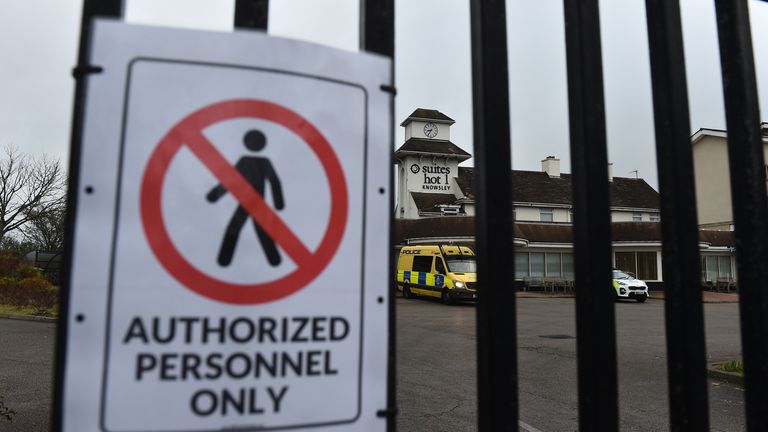
Plans to house newly arriving migrants on military bases or even potentially disused ferries are expected to be announced by the government within weeks in a bid to clear hotels.
Ministers have already signalled that they want to end the use of hotels as asylum seeker accommodation.
Previous suggestions of using holiday camps and student halls are less likely to be brought into action.
It comes as Tory MPs prepare to mount a rebellion against Rishi Sunak’s illegal immigration bill next week.
A number of senior Tories and former ministers have signed an amendment that would carve out any role for the European Court of Human Rights from the UK process for handling illegal migration.
The change has been put forward by Boris Johnson’s former Political Secretary Danny Kruger and is being supported by a number of MPs including Sir Iain Duncan Smith, Sir John Redwood and Simon Clarke.
The prime minister’s legislation will be scrutinised by the Commons on Monday and Tuesday with reports he will be meeting potential rebels in the coming days.
More on Asylum
- ‘An act of sacrilege’: Anger at government plan to house asylum seekers at historic RAF Scampton
- Downing Street showed ‘signs of regret and embarrassment’ over Albanian rhetoric, says country’s PM
- Suella Braverman to head to Rwanda on Friday as government doubles down on controversial asylum plans
March 24th 2023
Record revenue for staff agencies supplying NHS

By Hugh Pym and Caroline Alton
BBC News
Companies providing freelance staff to the NHS to cover for big shortages of doctors and nurses have seen their income rise by tens of millions of pounds since 2019.
Two companies, amongst the largest providing workers to the NHS, saw their turnover rise by 80% and 77.5%.
BBC News looked at the financial records of about 20 agency businesses providing services in the UK.
Health leaders say staff shortages mean they have to spend on freelance cover.
In November, BBC News revealed total spending on agency staff in England had been £3bn in 2021, up 20%.
And the following month, a Freedom of Information request by Labour revealed one hospital had paid £5,200 for a single shift by a freelance doctor.
In the latest financial records seen by BBC News, Medacs Healthcare, “the largest supplier of locum doctors to the NHS”, reported an 80% increase in sales, to £160.9m, between 2019 and 2021.
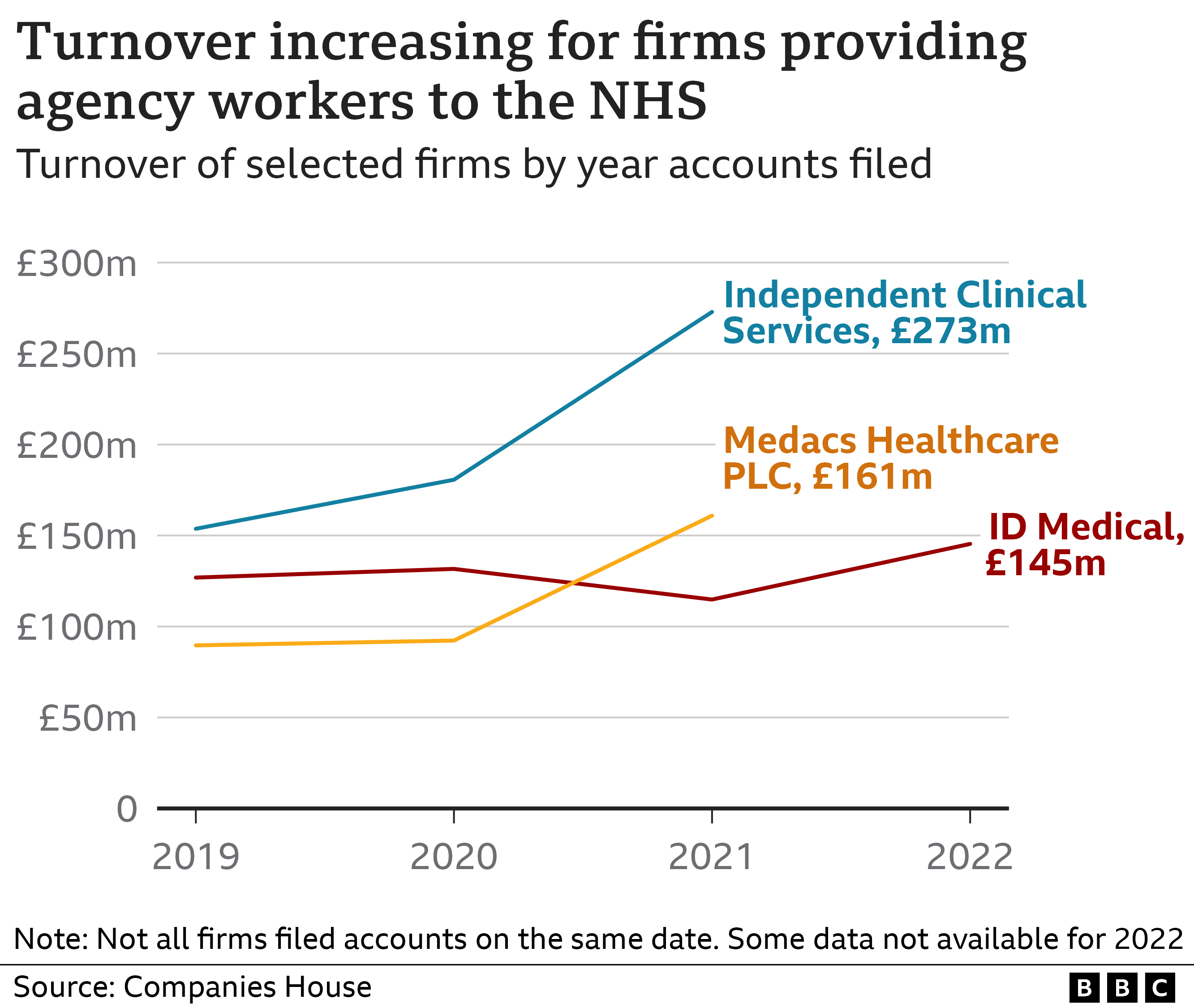
“We’re proud to partner with the NHS to provide them with a round-the-clock supply of flexible healthcare workers,” the company said.
“Our fees are fixed and capped by the NHS and government-approved frameworks we work through.”
ID Medical, which says it is the largest UK provider of healthcare professionals to the NHS, reported a turnover of £145.4m in 2022, up 15% on 2019. It paid one director more than £800,000 last year.
The company said it worked within NHS agreements, adding: “We continue our commitment to driving costs down further In partnership with the NHS, through our broad range of long-term sustainable solutions.”
Both Medacs Healthcare and ID Medical refused to reveal what proportion of their business was with the NHS.
Independent Clinical Services, which trades as Thornbury Nursing Group and Scottish Nursing Guild, reported a turnover of nearly £273m in the 2021 financial year, up 77.5% on 2019, of which, it says, the NHS accounts for less than half.
“We recognise the strain the NHS and other care providers are under and proactively work with customers to support strategic, longer-term workforce provision,” ICS said.
And it had “played a crucial role in supporting care providers during the pandemic”.
ICS is controlled by Acacium Group, registered in Jersey, which, in turn, is controlled, through an investment-fund structure, by a Canadian-headquartered investment company, the group’s ultimate parent.
Demand outstripping supply
Hospitals need freelance doctors and nurses to fill gaps in rotas – but demand for patient care is now outstripping the supply of staff, health leaders say, which is why agency bills have increased.
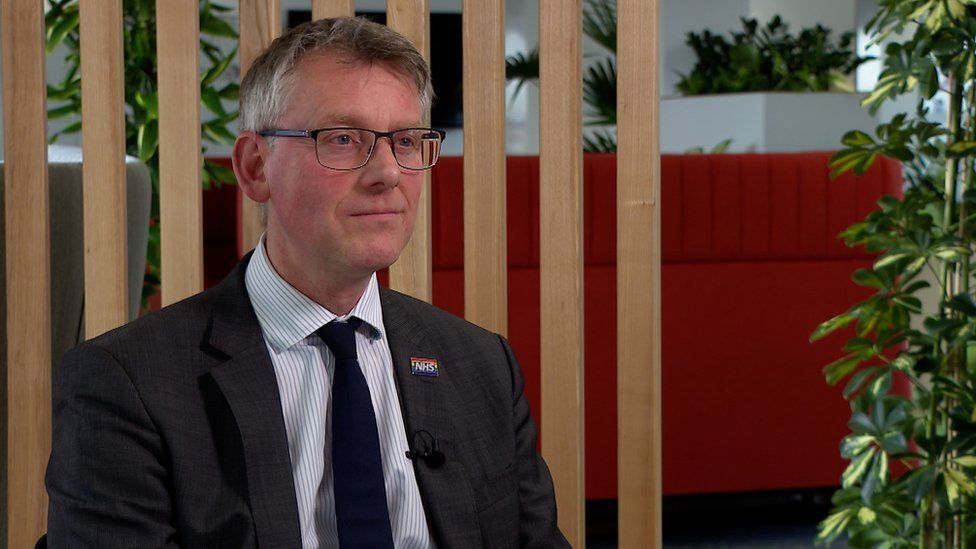
Sir Julian Hartley, chief executive of NHS Providers, representing trusts, and a former hospital boss himself, said: “These figures underline the current challenge in terms of the cost of agency staff for trusts.
“All trusts are desperate to reduce those costs and indeed reduce the reliance on agency staff.”
Sir Julian said the NHS was facing major challenges:
- recovering from Covid
- reducing backlogs
- difficulties discharging medically fit patients, due to delays in community care
The cost of agency staff was a “major factor for NHS organisations who want to see a much more sustainable approach”. Less should be spent on agency provision and more converted into permanent staff.
In England, trust leaders are allowed to pay a maximum of 155% of normal staff rates for any agency replacements – unless paying more is the only way to maintain safe staffing levels
There are also official NHS flexible staff banks which place health workers with employers who need to fill temporary gaps.
A Department of Health and Social Care spokesperson said: “While temporary staffing allows the NHS to meet fluctuations in demand, we are controlling spending by capping hourly pay, prioritising NHS staff when shifts need filling and hiring agency staff through approved NHS frameworks to ensure value for money.
“We will soon publish a long-term workforce plan to ensure we have the right numbers of staff, with the right skills to deliver high quality services fit for the future.”
‘No Obvious Limit To Immigration’ Blair Government Blunkett Policy Goes On And On.

| Let’s get back to sensible control |
| Ordinary people in Britain know full well that net migration into the country is too high and has been for years now. The question is not about being pro- or anti-immigration. The issue is the sheer scale. Before Tony Blair instigated radical changes to our border policy after arriving in Downing Street in 1997, net migration into Britain was around 47,000 a year. Compare that to the 200-300,000 a year we have had since 2001, and what is at stake could not be more clear (see a full break down of net migration trends here). And yet, the open border zealots and big business lobbies insist on framing any concerns about this dramatic surge in immigration as being racist and xenophobic. It is time we looked at the serious impact mass immigration has on our economy, services and society. To take housing as just one of the many areas that demonstrate the problem, Patrick O’Flynn recently noted that the pressure on our social housing due to mass immigration is leaving many ordinary Britons who need a home languishing on waiting lists. As Mr O’Flynn notes, around 30,000 people have been waiting for a home for ten years or more and more than a million in total are currently waiting for social housing. All the while, some immigrant groups from poor countries are taking up disproportionate amounts of the housing stock. Is this fair? Whether it is the NHS, schools or infrastructure, mass immigration is putting a massive strain on the quality of life of communities up and down the country. Indeed, as often as not, it is the very communities and families that are struggling who feel it the most. How can it in any way be unreasonable to put the interests of such British communities and families before those who have chosen to come here? We’re not calling for an end to immigration or to throw up the draw-bridge. All we have ever called for is sensible levels of immigration so that our citizens can once again access key services based on fairness and trust and a shared sense of who we are and what we stand for. |
| Does Britain Think Immigration Is Too High? There are many polls released (and many that are carried out for private use) on how people feel about immigration levels. Polls generally show that a clear majority of voters believe immigration levels to be too high. Regarding a recent YouGov poll, it is not just that 56 per cent believe immigration to be too high, but just as pertinent is that only 16 per cent believe it is too low, with a further 18 per cent thinking it is just right and 10 per cent being uncertain. This is a trend that can be observed in most immigration-related polling. Read our full blog here. |
| MIGRATION WATCH UK IN THE NEWS |
| The Times: Our interests count more than migrant needs According to Oxford Economics, in 2018 non-EEA migrants cost the public purse £9 billion; in 2016, Migration Watch put the figure for 2014-15 at £15.6 billion. GB News: Does Suella Braverman’s Rwanda policy act as a “deterrent” to asylum seekers? ‘The truth is, we don’t know yet. But one thing for sure, if we don’t start to show that if you arrive illegally you will not be permitted to stay, the numbers are only going to keep getting higher, as will the costs to the taxpayer with them.’ |
| MAKE YOUR VOICE HEARD |
| Thank you to those who responded to our call last week to put pressure on their MP. We appreciate that some MPs will ignore you or fob you off with waffly non-responses.The point however is simply to let them know that you—and the whole issue of mass immigration—is not going away and they avoid taking it seriously at their electoral peril. If you haven’t done so already, please do write to your MP here. |
| We wouldn’t be able to continue this work without the help of our supporters. If you would like to donate, please click the button below. Our supporters are all as concerned about the future of our country as we are. Some have been kind enough to remember us in their will. If you wish to consider leaving a bequest to Migration Watch UK, or wish to discuss anything else, do please get in touch. Our email is: admin@migrationwatchuk.org |
March 22nd 2023
Odd Coppers & Sparing Change by R J Cook.

There are at least two aspects to this situation. Firstly there is no doubt that the Metropolitan Police are , to use McPherson’s original phrase, institutionally corrupt. This is true across the euphemistically named United Kingdom. Secondly, one should ask what kind of police force could adequately cope with the extreme feral anomic fake multi cultural society that London has become ?
Two police forces combined to ruin mine and my eldest son’s lives with criminal lies 15 years ago and ongoing, so it requires me to show a lot of decency and restraint in comments about them here.
However, I must begin this discourse with the assumption that the majority of citizens agree that the U.K needs police for the same reasons that Home Secretary Sir Robert Peel introduced the Metropolitan Police Act in 1829.
With that in mind one should consider disgraced Prime Minister Boris Johnson’s pledge to recruit a net gain of 20,000 new officers to solve the nation’s problems. The Chief Police Council insisted that they would need 200,000 applicants to find the right sort of people with unique police officer qualities and potential..
As London’s mayor , Johnson despatched the failing Metropolitan Police Chief Sir Ian Blair. Blair was immediately entitled to a full police pension, estimated to be worth about £160,000 per year, based on his £240,000 commissioner’s salary.
Sir Paul Stephenson , another expensive policing disaster took over on 28 November 2008. He was replaced by Sir Bernard Hogan Howe, another magnificent failure in Police State Britain.. He was replaced by the diversity candidate Dame Cressida Dick. The fact that her incomptence led to the police slaughter of Charles deMenezes did not hinder her Pilgrim’s Progress.
Jean Charles de Menezes was shot dead at Stockwell Tube station in south London on 22 July 2005 after an officer mistook him for a suicide bomber in a counter-terrorism operation led by Dame Cressida, who was then assistant commissioner of the Metropolitan Police. Many of us held her resposnible for giving the kill order. He was shot 9 times while sitting on a train. Police rubbished the respectable woman witness sitting next to him, as a prostitute of bad character. Dick’s excellence in the field of incompetence and cover ups proved herself more than equal to all of her male moron predecessors.
The National Police Chief’s Council asserted that police officer qualities were as special and rare as the most exotic of minerals. Imagine the chattering classes surprise when PC Wayne Couzens , member of the gun toting Diplomatic Protection Squad turned out to be the sadistic rapist who raped 30 year old Sarah Everard, breaking her neck in the process. He had previously been reported and ‘investigated’ following previous sexual allegations.
A major problem with the police Professional Standards Department is that it is headed by a force’s self interested overpaid unaccountable Chief Constable. The knee jerk response to complaints against serving officers (especially officers of rank ) is the response ‘This is a vexatious abuse of the police complaints system.’ So Couzens was spoken to by a fellow constable and the complaints dismissed..
Last Friday, I was chatting with a pleasant middle aged white Tesco lady who was advising and helping me to choose make up. On mentioning that I needed to look my best for court, our conversation turned to the police. The lady became very angry on the subject. Telling me that before her family moved up from London , her son was regularly picked on by the Metropolitan Police who liked to throw him over the bonnet of their car, fastening the handcuffs so tight that it hurt, leaving deep impressions and chaffing his wrists.
The point here is that the Metropolitan , like the rest of the nation’s police forces, do not care who they fit up , abuse and maliciously prosecute so long it is not a fellow officer with whom they do not have an axe to grind. Twelve years ago I was drinking with a retired Thames Valley Police CID officer. He told me that his boss routinely covered for a drunken inspector whom a young constable breathalysed just outside the station four times. Each time the officer was told to let the drunkard go by his boss. He also alleged these two senior officers ‘had four women on the go.’ I have no idea whether he was telling the truth ,but nothing could surprise me now about the police. West Mercia Police covered up for the Plebgate liars. They followed through by blocking investigation, for 5 years, into their psycho officer Benjamin Monk and his female partner whose combined efforts killed former England black footballer Dalian Atkinson outside his father’s home.
The Casey review has the inevitable white liberal feminist focus. Casey’s pessimism concerning the police will to reform is justified. It is the last great Victorian Institution to avoid reform because status quo suits the ruling business , elite, political classes ,feminists and their mainstream media. Within the elite’s parameters, pressure groups run government who use the police as running dogs. Now too many of those dogs have gone feral. Shooting dead an innocent young black rapper who presumably had the type of PNC Criminal Vehicle Marker that was secretly placed on me and my car on October 9th 2008, is an example of how dangerous U.K police have become. Police still refuse to explain why and how they did that. Their powers , via the dubious Chief Constable clique, have been massively increased by Parliament as a universal fix to keep us safe ( sic ). Who remembers the day and video when innocent poor white news vendor Ian Tomlinson was killed by the naked violence of thug City of London PC Stephen Harwood – the police surgeon asserting that Ian was going to die anyway ?
Leaving the crimes and incompetencies of London’s police aside, the whole area is rife with conflict, cultural incompatibilities , major contrasts in wealth, all topped off with a constant large non European migrant inflow. The smooth talking Tories and wishful thinking social engineering ‘liberal’ left social engineers of Labour offer no solution. Hang out in places like around Charing Cross Station on cold winter nights and trip over all the rough sleepers and drug addicts.
I know from personal experience that police are transphobic. That attitude led police to tell the Gender Identity Clinic via my obsequious GP , of an attempt at prosecuting me , communicated as fact, without evidence for working for my son and ‘his associates’ in a home based brothel. This was also recorded as fact, followed by prosecuting me for swearing on a phone message to the lead officer who had gone to ground for 3 months. My overdue sex change surgery and hormones were cancelled on this basis because I refused anti psychotic drugs. I also lost my job. It took a court order to stop them mis gendering me, Back in the 1980s a probationary constable laughed as he told me how he and his mate pulled in a man because they saw the outline of a bra under his shirt, so brought him in using ‘sus’ laws so they could have a laugh making him strip.
Clearly the police have too many sick adulterous violent lying perverts in their ranks , but it was my impression, listening to Casey ,that she sees her report as a powerful argument for more feminist prejudice and politically correct , preferably female officers to hunt down wife beaters inside and outside the police regardless of grounds or evidence along with utmost trust in accusers.. This will be on the well worn feminist premise that women never lie. This is propped up by excusing obvious female liars on the basis that to prosecute and jail them, as recently, discourages more victims from coming forward.
So in my view, Casey sees the police issue as mainly about :
a ) London b ) women c ) ethnic minorities d ) positive discrimination to get more women and ethnics in power. The latter category attributes good to candidates simply on gender and / or race and ethnicity. History ,according to my archives, to the open minded, speaks differently . The most famous case of Metropolitan Police ‘positive discrimination’ ( sic ) was Ali Dizaei. Jailed and thrown out of the police in disgrace for framing an innocent man – yet former Scotland Yard chief Ali Dizaei now lives in a £5m house and drives a convertible Rolls-Royce
When positive discrimination did find an honest woman, Sue Sim to head Cleveland Police, the big beasts of her force combined to undermine and rout her out. Police continued to harass her after she was forced to resign.
It is simplistic and narrow minded feminism to make this all about women. I have collected many stories over the years ,some from unhappy officers and others being on the receiving end of the ruthless ambitious ones who corrupt the system and low ranking officers from the top down. Good people,like Sue Sim have little hope. Successful female officers are unlikely to be better than the men. Misogyny is often , if not always, about promotion to which females have been led to believe they are entitled. Male officers are resentful when it is obvious what is happening. Sexual harassment is taken as a joke when a man alleges it – as well as being a powerful weapon in female hands. Society is increasingly divided and violent. Male officers have reason to believe they will have more of the frontline dangers , directed from the rear by over promoted incompetent females like Cressida Dick. The obsession with female equality is not evidenced in reality. It is a delusion that has loosened some of the rusting nuts and bolts that have been holding the police edifice together since 1829.
Police chiefs and politicians love to boast of new crime fighting technology, but serious criminals, often colluding with corrupt officers, play that technology and work out of sight in legitimate disguise – including parliament and the police.
A TVP officer informed me that 80% of their calls are domestics. Casey wants more attention to domestic violence cases, arguing they are rife in the police. Since the police are also people, we have to put reforming police into the context of a wider society that marginalises if it cannot feminise men , while spending a fortune in a leading role helping NATO wage its proxy war on Russia. This, like Covid 19 is an excellent diversion.
This is a U.K primary role while cutting taxes for the rich, running a third world open door migration policy , stoking up hyper inflation, impoverishing the masses and paying impossible wage rises to public servants like teachers and the NHS. This is the society the police , as an occupying army, must oversee, with London and black migrant gang crime an issue that liberals want ignored. It is not just the police that needs reforming. Our overpaid government , Parliament and Civil Service, including the corrupt target driven Crown Prosecution Service should be top of the list. None of this will happen because this class are like their fallen figurehead , Boris Johnson, more interested in having lavish parties while patronising the masses in what they like to call democracy. The last word on this subject should go to former Assistant Metropolitan Police Commissioner Brian Paddick. He rather summed up his former employer as follows : ‘It wasn’t my homosexuality that caused me problems in the police. It was m honesty.’ He quoted Mark Twain : ‘Always tell the truth. That way you don’t have to remember what you said.’ (‘Brian Paddick Line of Fire.’)
R J Cook
Met Police: Where next for the force after Casey review?
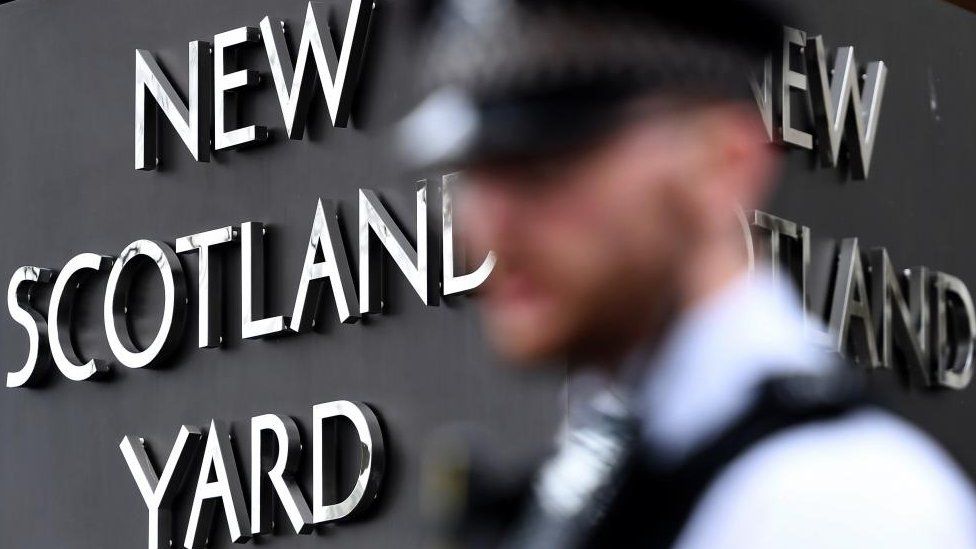
By Mark Easton
Home editor
Policing in this country is in a state of emergency. The warning lights are flashing. The alarms are wailing.
Baroness Casey says the Metropolitan Police was expecting a report highlighting the things it needed to look at – but that, overall, the force thought she would say it’s doing a good job.
“It’s the exact opposite,” she says.
Baroness Casey has a reputation for no-nonsense reports. When Dame Cressida Dick, the former Scotland Yard Commissioner, asked her to review the Met, she must have known what she would get.
- Met still rotten to core, says Stephen Lawrence’s mum
- Rape cases ruined, Sikh officer’s beard cut… five report findings
- Women and children failed by Met Police ‘boys’ club’
- How many complaints are made against police officers?
Not the measured, dispassionate and legalistic volumes most institutional inquiries deliver.
Her language is often emotional and uncompromising, a style that appeals to journalists and politicians looking for a headline.
This report is so ferocious in its criticism that, in the short term, it is almost certain that trust and confidence levels in the police in London – already down – will plummet further.
With forces across England and Wales, like the Met, re-vetting all their officers, more scandals will emerge.
Every misconduct hearing, every court case, is going to damage public confidence.
Accused of institutional prejudice, it seems unlikely that, in the short term at least, this report is going to make it easier to recruit women, or those from the LGBTQ+ community and ethnic minorities.
Morale is not going to be improved by a report that is so merciless in its criticism of the Met and its culture.
A generation after the Macpherson report found the Metropolitan Police to be institutionally racist, here we are again. Only worse. Sexism and homophobia are added to the list.
The report notes that in 1972, on his appointment as commissioner of the force, Sir Robert Mark said he had “never experienced…blindness, arrogance and prejudice on anything like the scale accepted as routine in the Met”.
The report immediately adds that the Met is a very different organisation today. But five decades on, Louise Casey says: “We have found those cultures alive and well”.
https://emp.bbc.co.uk/emp/SMPj/2.47.3/iframe.htmlMedia caption,
Watch: Baroness Casey on her blistering report of the Met police
So what is the answer?
The question is really about whether police forces turn things around quickly enough.
The report talks about reviewing progress against various measures after two and five years. Politicians are suggesting they will want to see results within two years.
But with a general election likely next year, and manifestos being written even sooner, will politicians show the patience Sir Mark Rowley, the current incumbent in Scotland Yard, says he requires? Especially if more bad headlines see public anxiety increase still further.
Baroness Casey hints at breaking up the Met, if things don’t improve. But that kind of major reform of policing feels some way off.
As things stand, there is no blueprint for a reorganised system in England and Wales – and politicians of all stripes seem content to give Sir Mark the benefit of the doubt for the moment.
Home Secretary Suella Braverman has said she will be “holding the Metropolitan Police and the Mayor of London to account by measuring progress”, but adds that she currently has “every confidence that Sir Mark Rowley and his team will deliver”.
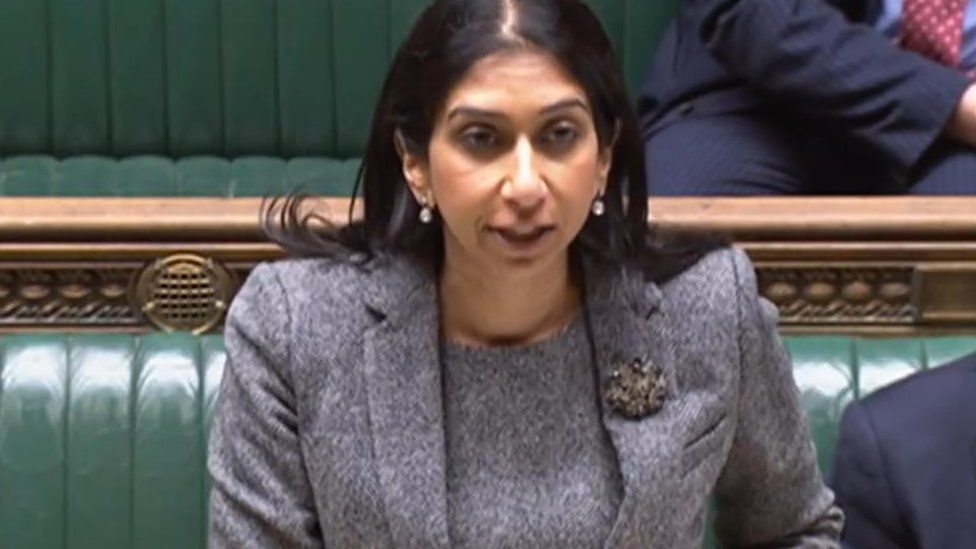
The Labour leader, Sir Keir Starmer, has pointed out that a collapse in trust in the Royal Ulster Constabulary among some communities in Northern Ireland resulted in the successful creation of a new police service, the PSNI.
Is that a hint that a Labour government might institute more radical reform?
Party insiders suggest they will be more hands-on than the current government has been in demanding progress, but there are no plans for systemic change – for now.
What does progress look like? Public confidence figures must improve. Recruitment from minorities must increase. Corrupt officers must be identified and booted out. Vetting must be more effective. Whistleblowers must be supported. Morale must rise.
Sir Mark has already instituted measures he believes will move the dials. But that will take time. Changing culture and rebuilding trust cannot be done overnight.
https://emp.bbc.co.uk/emp/SMPj/2.47.3/iframe.htmlMedia caption,
It is hard to overstate the perilous state of British policing right now.
The tradition of policing by consent – the idea that officers serve as members of the public in uniform, exercising powers with the approval of the people they serve – relies on trust.
But as Baroness Casey baldly states: “The Met has become disconnected from Londoners – their consent can no longer be assumed.”
Trust is formed at the point where the police meet the public. But the report finds bobbies who should be on the beat are behind desks, backfilling for civilian support staff who have been stripped out.
“London no longer has a functioning neighbourhood policing service,” Baroness Casey concludes.
“The closer the Met get to Londoners, the more beleaguered the service”, is her damning conclusion.
Perhaps the only way to sort out the Met was a nuclear option, a report so damning it takes the force back to ground zero.
But a huge question remains: Can a new police service emerge from the ashes with the clock ticking?
Related Topics
March 21st 2023
Exposed: London’s secretive “smart stations” roll-out
March 20th 2023
She Is Woman by R J Cook

This is a comment related to the following BBC news report. Quite recently their were strenuous calls from Parliament for more Draconian laws to clamp down on social media content. This time it was all about keeping young people, especially girls, safe from harmful content.
The children’s commissioner for England , Anne Longfield , has accused social media companies such as Facebook and Snapchat of losing control of the content carried on their platforms, telling them that recent teen suicides should be a “moment of reflection” for the way they operate.
“The recent tragic cases of young people who had accessed and drawn from sites that post deeply troubling content around suicide and self-harm, and who in the end took their own lives, should be a moment of reflection,” Longfield told the companies.
Now we have the case of University of Edinburgh student Romy Ulvestad who died at her parents’ London home four days after her 21st birthday. She had killed herself. Once again a suitable superficial explanation had to be found. Hard questions and hard facts must be avoided.
University life has changed significantly since my days as an undergraduate and post graduate in the 1970s. That was before Thatcher’s vile government decided to disguise mass unemployment by expanding university places to an ultimate goal of 55% from the 3% it was in my day. This was good news for the dim upper middle classes who wouldn’t suffer because grants were replaced by student loans, shackles of debt and all for degrees as abundant as toilet paper.
There were only 3000 students at the University of East Anglia when I was there. My father dying when I was 11 meant that I was from a materially poor home unused to the benefits of central heating, hot running water, showers and a daily cleaner. My wealthier spoiled contemporaries never ceased to complain.
The higher the student’s social class the more likely they were to complain and use drugs. But all of us had faced a rigorous A level and exam course to get there. It hadn’t been our right and the teacher’s responsibility as it seems to be today. I also knew that every vacation I would be back on the building sites – a total of 20 weeks a year deep trench pipe laying or digger driving with scant official interest in health and safety. University life may have been tough, but I had known tougher and would know tougher still.
A major problem with an increasingly feminised and feminazi society is that the average bourgeois woman is naturally more feminine than she wants to be. It creates inner conflict, over assertiveness and stridency On one hand she wants the power and recognition of high flying careers. She desperately wants to inculcate the same desires and motivation in her daughters because she isn’t just a woman , she is woman, so you must hear her roar. On the other hand she wants to be the most important person controlling her family totally on pain of divorcing and bankrupting her husband, as a feminist right, so ‘she chooses and sends her to university -or should I say UNI ?
No responsibility must attach to her if anything goes wrong. It is never her fault because ‘she is woman.’ That is the most hallowed state in ‘liberal democracies’ such as Britain’s. If ubiquitous ‘woman’ is not happy with national, international ( like migration policy ) or social events, there will be protests until changes are made. There will be no questions as to why the daughters choose to opt out of an increasingly feminist & Nazi State tyranny where the answers to everything are censorship,more laws , more police and harsher punishments. Don’t ever blame mummy because she knows best and is never wrong – whatever the consequences.
R J Cook
‘I did not send my child to university to die’
University of Edinburgh student Romy Ulvestad died at her parents’ London home four days after her 21st birthday.
She had killed herself after staff failed to provide additional support, despite repeated warnings that she was struggling with her mental health.
Now her mother is adding her support to a campaign for the UK government to create legal duty of care for students.
The university, which apologised for failing Romy, said it had improved the support it offers since her death.
Libby Kitson, Romy’s mother, has joined calls for Westminster to change the law to better protect students, and hopes the Scottish government will follow suit.
- Student suicide petition passes 100,000 signatures
- Call loved ones to stop student suicides, unis told
The petition to the UK government is being supported by 25 bereaved families, who have come together and set up The LEARN Network.
It reached more than 127,000 signatures before the deadline at midnight on Mothers’ Day, meaning Parliament will consider the subject for debate.
Speaking to BBC Scotland, Ms Kitson said she did not know that her daughter was struggling with her mental health when she returned to London during the Covid lockdown in 2020.
“Her father and I had no idea about her mental health struggles but they had been well-flagged to people at the University of Edinburgh who could have done something about it,” she said.
“I sent Romy to off to university to study classics, which would be a pivotal point for the rest of her life. What I didn’t expect to do was send her off to university to die.”
‘Legal duty of care’
Romy, a classics student and part-time model, died in April 2020, more than a year after she communicated with the university about her struggles by requesting a “special circumstances” application to resit her exams without penalty.
Ms Kitson said: “We want there to be a legal duty of care within all higher education institutions, and I think some people, including our government, seem to think there is some legal requirement in place but there really isn’t.
“You want to know that if your child is suffering with any kind of mental health issues, or is overwhelmed by university life, there are people there who are trained and skilled to help deal with it.
“And if they really, really are in a state of crisis you would want to be informed.”
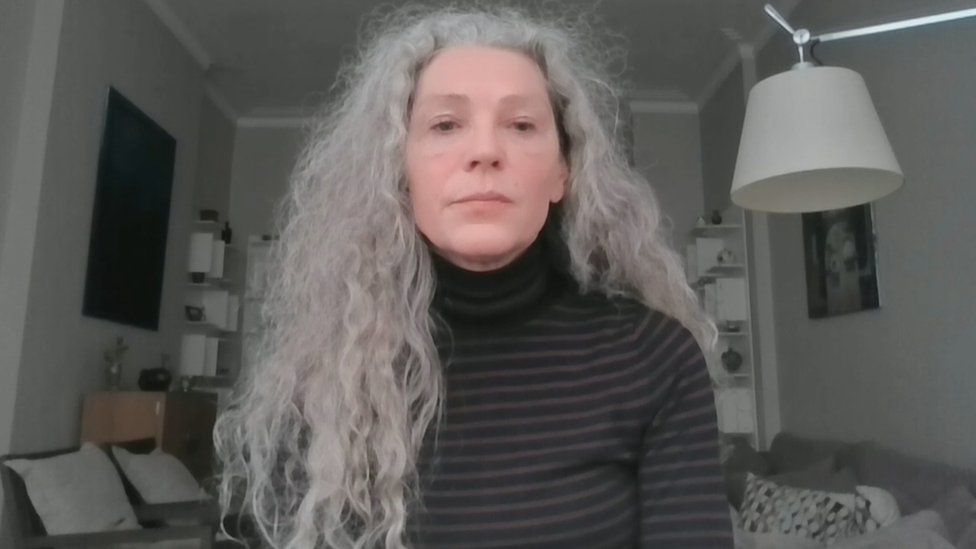
Campaigners from ForThe100 want a change in law to ensure higher education institutions have a legal duty of care towards their students, as schools already do.
The Department of Education has said creating a legally enforced duty of care “would be a disproportionate response”.
Ms Kitson said the campaign was not looking to provide a means for families to sue universities, but to prevent similar deaths.
She said she did not want any other parent to have to go through the same situation.
“We would hope that the Scottish Parliament would look at England and Wales and think ‘they’ve led by example, we should follow suit’,” she said.
“A Scottish student’s life is no less important.”
‘Deeply sorry’
A University of Edinburgh spokeswoman said it had been “shocked and deeply saddened by what happened” to Romy and “deeply sorry” for the gaps in support given to her.
“Supporting our students’ mental health and ensuring their wellbeing is our absolute priority,” she said. “Our support policies and practices are under regular review as we continue to focus and improve upon our mental health support provision and provide the best possible environment for our students.”
Students at the university now have access to a “named-contact relationship” with staff trained in wellbeing and mental health, alongside other support services.
The spokeswoman added: “We continue to engage with students through both the Students’ Association and the Sports Union to identify how best we can shape and develop our services to support students most effectively.
“We work closely with the three other universities in Edinburgh and NHS mental health colleagues to improve pathways into specialist mental health services for students.”
‘Disproportionate response’
The Department for Education previously responded to the petition by saying that higher education providers already had a “general duty of care not to cause harm to their students through their own actions”.
A spokesperson said: “We acknowledge the profound and lasting impact a young person’s suicide has upon their family and friends, and know among the petitioners there are those who have personal experience of these devastating, tragic events.
“[However] we… feel further legislation to create a statutory duty of care, where such a duty already exists, would be a disproportionate response.”
In a response to the petition, the Scottish government said: ”We are determined to support the mental health of all students. Over the last three years we have invested £11.5m to introduce additional counsellors in colleges and universities”.
March 19th 2023
Cost of Living: ‘I tell my kids I’ll buy it tomorrow – and hope they forget’
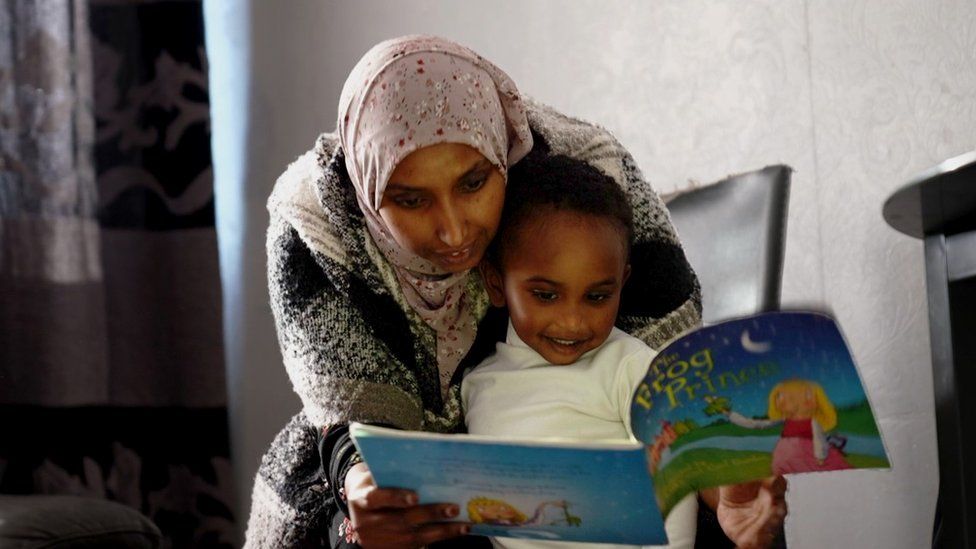
By Michael Buchanan
Social affairs correspondent, BBC News
A charity that specialises in helping British Muslims with financial problems says it has been overwhelmed by demand for help. Requests for crisis grants are running at unprecedented levels, the National Zakat Foundation says.
“It’s stark,” says Dr Sohail Hanif, chief executive of the NZF. “Some of the stories we’re hearing sound as though they’re out of war zones, you can’t believe they’re from the UK.”
The charity says requests for help are running at up to 2,000 applications per month, approximately double what it was last year. Due to the surge in demand, it is currently taking them up to four months to process an application – previously it took two weeks.
Successful applicants can get cash grants of around £600 for a single person and about £1,000 for a family with two children.
- One in five eating food beyond use-by date
- Food bank capacity increases as mosque expands
- Cost of living leaves struggle to send cash abroad
“People are running out of borrowing options,” adds Dr Hanif. “They can no longer turn to family members. Ill health is very common. One bout of sickness can send the family below the poverty line, struggling to pay their bills.
“We’re helping a lot of women with children, asylum seekers, victims of trafficking. There is no one demographic that’s owning this.”

Many of those struggles were on display at a meeting the BBC attended at the offices of the Give a Gift charity, in Leeds.
Nine mothers, all Muslim, gathered to get advice and support on how to deal with rising prices. One, a mum-of-seven, said her family all slept in two bedrooms as the other two rooms in her home were too cold to use. Rising rents meant she couldn’t afford to move.
Another said she was constantly stressed, worrying about money, and that her children preferred being at school to being at home as it was warmer.
‘Life is not easy’
Berlin Mirre, a mother-of-five, said she had built up large debts as a result of being unable to make ends meet.
The family lives off £236 a week. She pays £66 a week towards her rent, and at least £50 a week on gas and electric. She regularly runs out of money before the week is out.
“Life is not easy now,” she says, as her youngest child, two-year-old Ali, plays in another room. “My children don’t understand – when they feel cold they just put the heating on. They ask ‘can you buy this, can you buy that’ and I often say I will buy it tomorrow and hope they forget.”
She gets a weekly food parcel from Give a Gift, but worries constantly about her debts. “I pay as much as I can, but it’s the minimum amount each month, and the interest is building up. I feel so bad. I don’t sleep well at all.
“I think if I die, I will have to answer to God for that money. And who will pay after?”
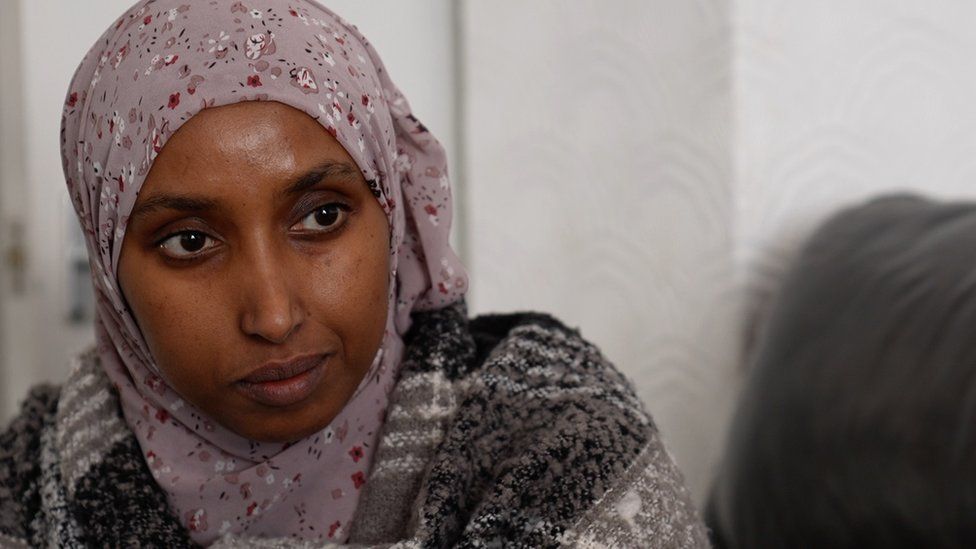
Figures released in January by the Office for National Statistics suggested 26% of Asian households and 46% of people described as “other ethnic groups” said they were somewhat worried or very worried about running out of food. The overall rate for Britain as a whole was 15%.
The figures do of course mask huge variations within different communities – charities say that people of Bangladeshi, Pakistani and black African heritage are struggling the most.
‘Bigger crisis in this community’
“The level of need is so much greater now than it was during the pandemic,” says Sufia Alam, who runs a food bank at the Maryam Centre, part of the East London mosque.
The mosque started distributing food due to Covid 19 and planned to stop the service last year but soaring inflation has meant it is busier than ever.
“The rising cost of living is a bigger crisis in this community,” says Ms Alam. “This is a community that has always been in poverty, lived in overcrowded housing, that’s really struggled with employment. And it doesn’t help that everything is now so expensive.”
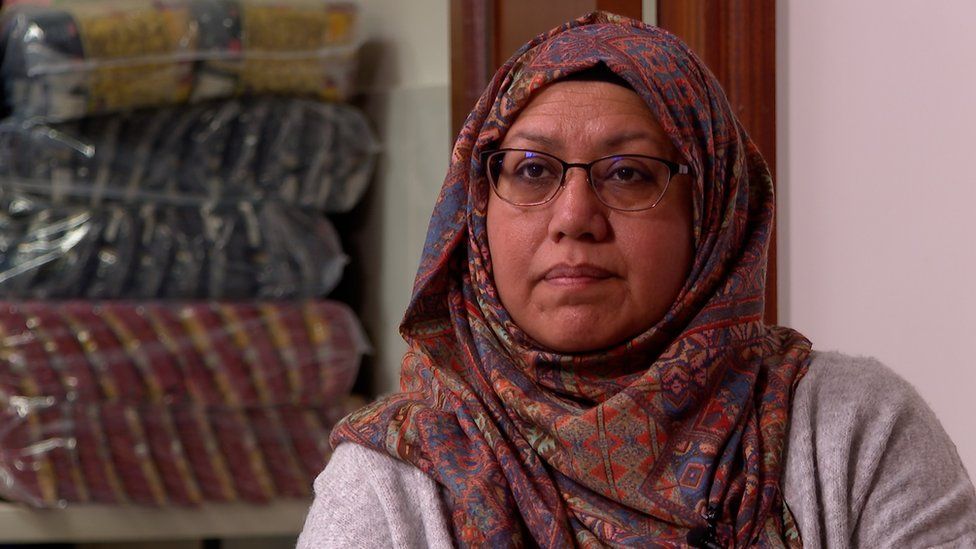
Despite the demand they’re seeing, several charities say they believe the real need is even greater due to a lingering sense of shame within Muslim communities in asking for help.
NZF, which raises most of its money during Ramadan, which starts on 22 March, said British Muslims traditionally donate money to aid people suffering overseas.
More Muslims in the UK are beginning to realise there is growing need among their own communities at home, adds Dr Hanif, and donations increased last year.
But there is still a stigma for many. “There is no shame in asking for help, that’s our message,” he adds.
March 18th 2023
Asylum Hotel Fire
A 400-year-old hotel in West Sussex that was housing Ukrainian refugees has been engulfed by a fire.
The blaze was first reported at 1.08am on Thursday, with ten fire engines, an aerial ladder platform, water carrier and off-road vehicle initially working on the scene in Midhurst.
Originating in the hotel’s roof space, a “significant” fire had spread to the adjoining properties, West Sussex Fire & Rescue service said.
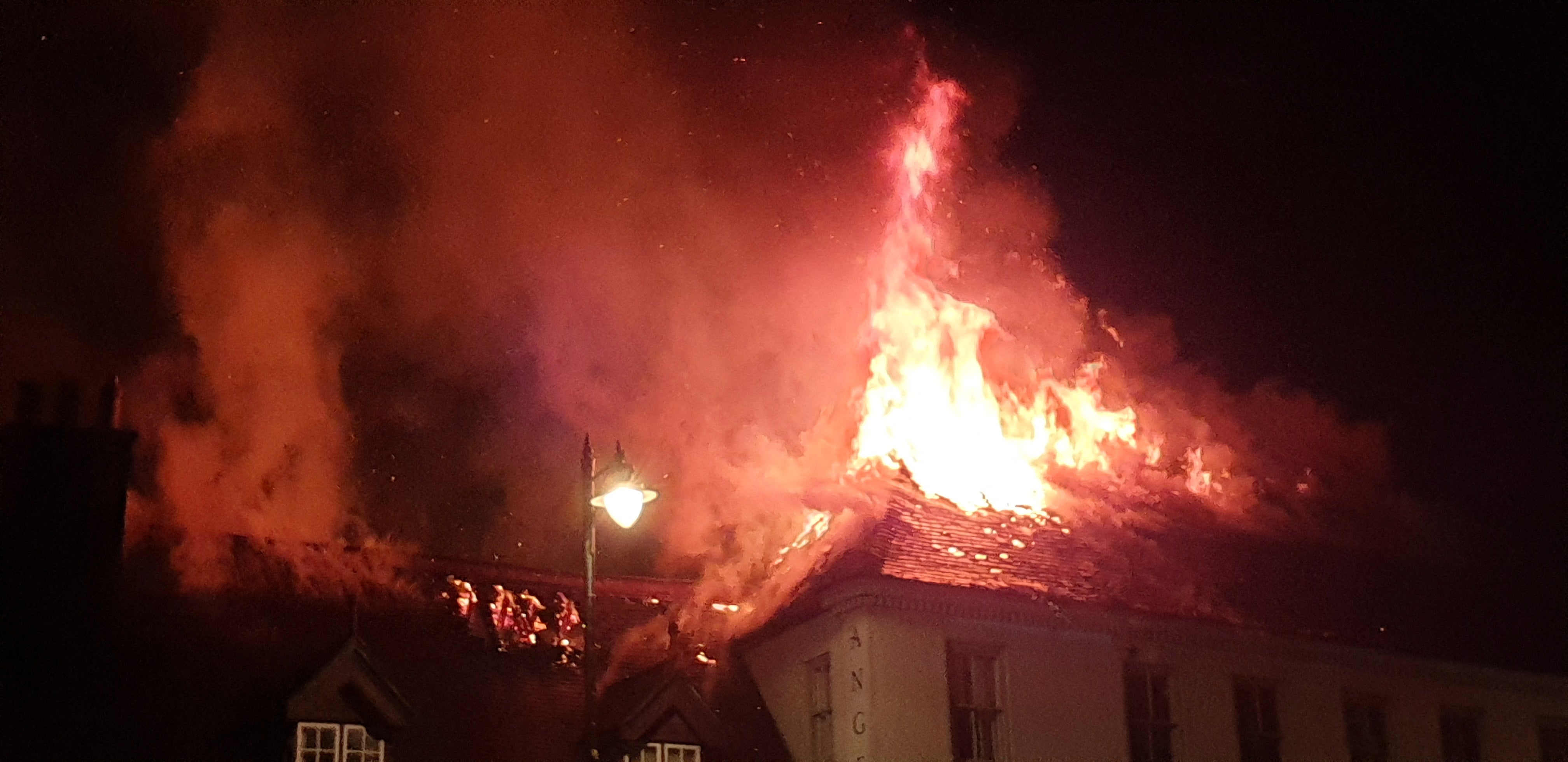
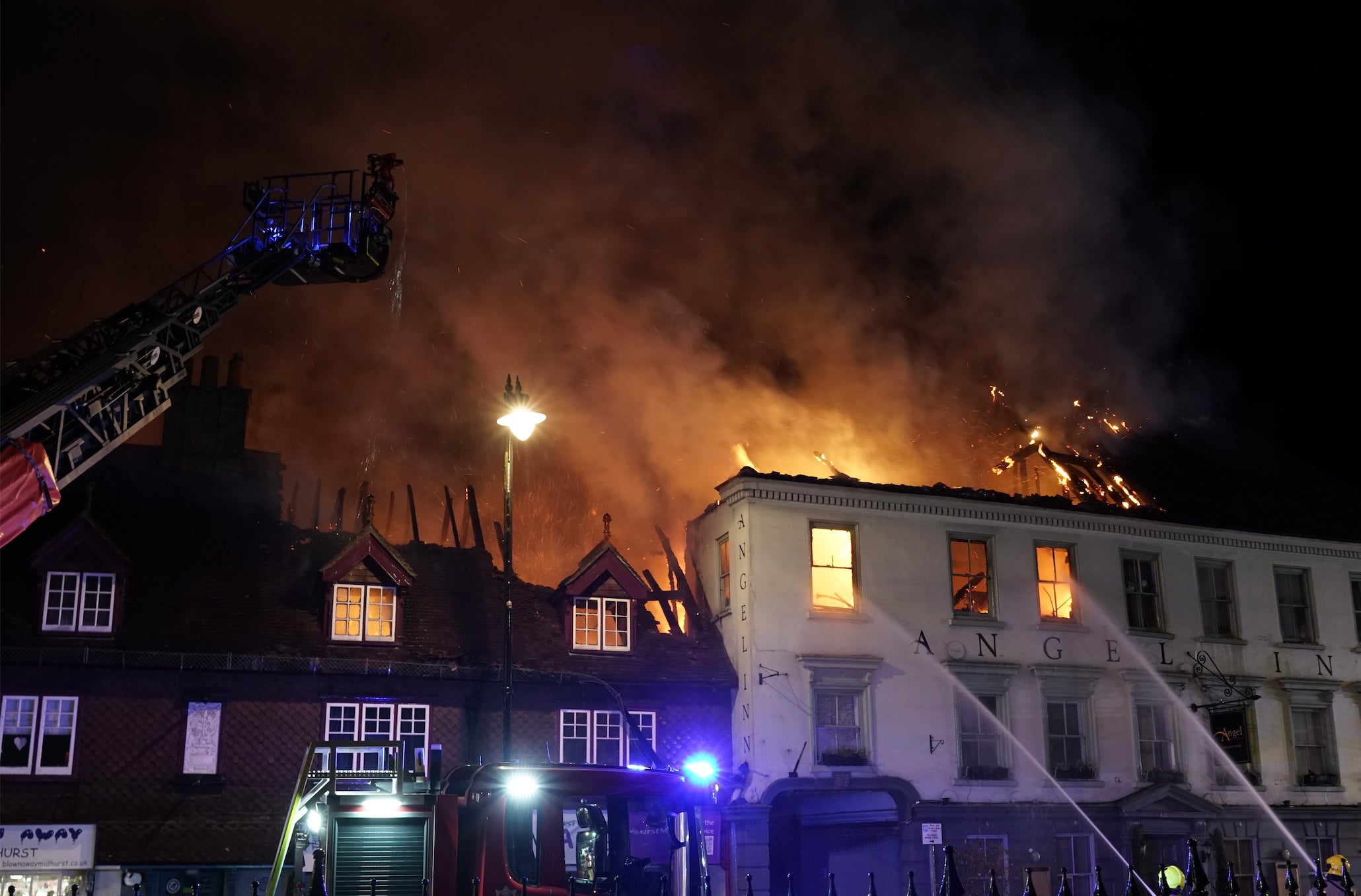
More than 30 people were safely evacuated, with a relief centre set up for those displaced.
As the flames worsened, assistance was later provided by Surrey Fire & Rescue Service, Hampshire & Isle of White Fire & Rescue Service, Sussex Police and South East Coast Ambulance Service, amounting to 15 fire engines.
Met police on ‘last chance’ as Casey report to condemn failure to change
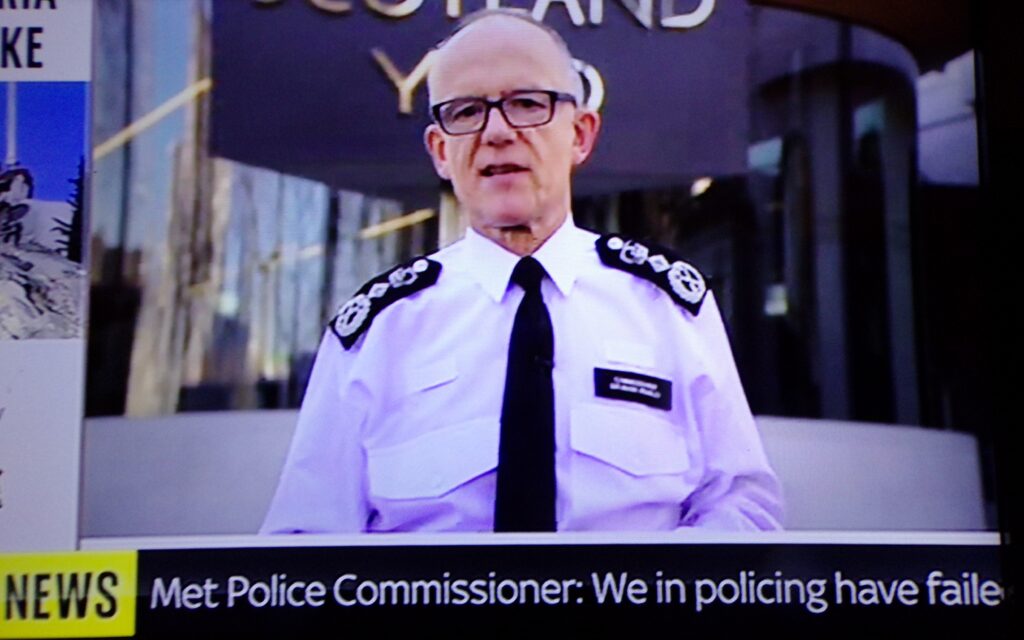
Exclusive: Findings of official review due out on Tuesday described as ‘horrible’ and ‘atrocious’ for force
Vikram Dodd Police and crime correspondentThu 16 Mar 2023
The Metropolitan police is riddled with deep-seated racism, sexism and homophobia and has failed to change despite numerous official reviews urging it to do so, an official report will say.
The report from Louise Casey, due to be published on Tuesday, will excoriate Britain’s biggest police force, the Guardian has been told.
Senior government and policing figures are aware of its contents, with one describing it as “horrible” and another as “atrocious”. One source with knowledge of the findings said the report would make clear that the Met was in the “last-chance saloon”.
The force commissioned the report in 2021 after the murder of Sarah Everard by a serving Met officer, Wayne Couzens. The report will consider whether Met failings result at least in part from institutional misogyny, homophobia and racism.
Lady Casey will criticise the force for failing to tackle its problems despite decades of warnings in previous official reports, and she will illustrate her findings with damning new case studies.
In 1999, a report by Sir William Macpherson on the failings that helped the racist killers of Stephen Lawrence escape justice for so long identified institutional racism as a cause of some of the problems. A decade later, the Met said the label no longer applied. However, Casey will say significant problems persist, and she will raise the question of what should happen to the Met if it cannot reform.
The final draft has been sent to the Met leadership and government, leading to crisis talks in the past few days between Sir Mark Rowley, the Met commissioner since September, and the home secretary, Suella Braverman, Whitehall sources say.
The Met’s biggest recent disasters, such as the cases of Couzens and the serial rapist David Carrick, were not one-offs but symptomatic of how profound and serious its failings were allowed to become, the report will say. It will criticise poor past leadership and say pernicious cultures took hold and grew in the Met.
Couzens and Carrick were judged as fit to carry a gun and served in the same unit, the parliamentary and diplomatic protection command, which Casey will highlight as having unacceptably high levels of problematic behaviours.
Casey’s team has sent so-called Maxwell letters – which allow figures criticised in an official report to respond before publication – to former Met leaders including Cressida Dick.
The 300-page report is expected to criticise Dick’s leadership from 2017 to 2022 as the Met’s problems grew. But it will say the problems were apparent before her commissionership. One supporter of Dick said she had been focused on reducing violent crime during her tenure.
Casey will say austerity – when the Conservative government from 2010 cut police budgets – had a damaging effect on the Met, its neighbourhood policing and its relations with the communities it serves. Some officers and units have been left overworked.
The furious reaction to the Couzens case after he was sentenced to a whole-life term prompted Dick to order the review in October 2021. Dick was ousted as commissioner in February 2022 as the London mayor, Sadiq Khan, was unconvinced she could lead the Met out of crisis.
The Casey report will say while Couzens and Carrick were responsible for their crimes, clues were repeatedly missed about the dangers they posed. Couzens was a serial flasher but the Met bungled chances to identify him as a danger to women despite his crimes being reported to them.
A draft of the Casey report has been sent to Rowley and is said to have been met with shock at its findings and concern at the further damage it may do to public confidence in the Met. Confidence was already low before Carrick’s conviction in January and details of the Met errors that left him free to attack women.
One senior source said Rowley’s turnaround plan had a year to show signs it was working. Another said the commissioner had two years to show progress.
Casey’s first set of findings, released in October 2022, focused on the Met’s disciplinary system, and found that too many complaints from officers and staff about their colleagues were not taken seriously. Rowley has vowed to change that and already promised reforms.
The October report found that officers and staff were being fobbed off when they complained of wrongdoing, and were reluctant to do so because they feared nothing would be done or there would be reprisals
It found that officers suspected of serious criminal offences, including sexual assault and domestic abuse, had been allowed to escape justice, and Rowley accepted that hundreds of racist, women-hating and corrupt officers had been left in the ranks.
Last June, the policing inspectorate placed the Met into special measures over a series of failings.
A spokesperson for the Casey review said: “The review into the culture and standards of the Metropolitan police was commissioned in light of the appalling facts relating to the murderer of Sarah Everard.
“This must be remembered if at all possible as we move towards its publication. We will not be commenting on its contents ahead of publication. We respectfully ask others to do the same.”
Policing faces two more official reports commissioned by the government, including one on the Couzens case, which will be released this year.
The Met faces another damning report on failings that left the serial killer Stephen Port free, and this month the police watchdog will announce whether a Met firearms officer should be referred to prosecutors over the shooting of Chris Kaba last September.
On Thursday night Kaba’s relatives said they were “concerned” by the resignations of two officials from the watchdog investigating the shooting.
“We have concerns that two of the senior people at the IOPC [Independent Office for Police Conduct] who have been overseeing the homicide investigation in this case – Michael Lockwood and Sal Naseem – have resigned during the investigation,” the family said.
“We find this unsettling and are concerned that it does not affect the nature of the IOPC decisions or their timing – we have already waited too long to know if the IOPC is seeking advice on criminal charges from the CPS.”
Lockwood, the director general of the IOPC, stepped down in December as he was the subject of a police investigation into an historical allegation.
The departure of Naseem, the regional director for London and national lead for race discrimination, was announced this month, the organisation said.

March 15th 2023
Climate Change Joke
By R J Cook
The Little Greta episode was, for me ,the highest point in liberal self delusion and hypocrisy. Greta was obviously a mouthpiece and gurning puppet. Still,who can blame her ? She made a fortune, an inspiration and role model to other little middle class girls – and a conscience for the chattering classes.
Little Greta opened up her moralising rantings, squirming about on stage like Ian Anderson of the Jethro Tull band, with the inane pronouncement that ‘Climate change has nothing to do with overpopulation.’
Why lead off with such a palpable lie if her scriptwriters were not trying to hide something ? When I was a child in the 1950s there was international fear of the consequences of China’s ever swelling numbers. The palliative for the moronic unimaginative masses was comfort in knowing that every Chinese person could be accommodated shoulder to shoulder on the Isle of Wight.
The problem is that those Chinese, like the planet’s current 8 billion plus population, are not content with standing shoulder to shoulder. They want to do and have things in a world that offers apparently limitless possibilities. Angry Feminist Nazis tell women world wide they must all be empowered and can be whatever they like. The movement is backed by billionaire agenda setters like octogenarian Jewish financier George Soros, who never mention social class or individual aptitudes.
Five African nations are responsible for current environmentally ruinous unsustainable population growth. White Liberal tyrannical pseudo democracies and other vested interests condemn anyone mentioning this as ‘racist.’ These nations , like Nigeria and Ethiopia, take it for granted that they can export their surplus to the United Kingdom’s benefit Utopia.
Nigeria’s hopes are all in the oil barrel ,so life will get worse. Africa’s civil wars will proliferate. Pandemics will rage and spread west. Covid,man made as part of ‘The Great Replacement’ or not, will get worse and more common. Africa’s cultural , including religion, poverty and health issues are in full westward flow, at largely the lower class taxpayer’s expense and wealthy elite’s invitation – as the Gary Lineaker affair demonstrated. No one of the political media elite wants Russia and China in Africa. They want Africa backward and dependent. They want friendly tyrants keeping the door open to cheap resources and cheap ignorant labour for the greedy western planet eaters.
So we come to Ukraine. The Anglo U.S EU elites want its resources , cheap labour cultural degradation and living space for massive migrant inflows of what the ruling super rich elites call the ‘New Europeans.’ More forests and woodlands will go , the seas will be overfished, the masses living standards will fall faster, crime and disease will proliferate. There won’t even be pretence of free speech. Mass media propaganda is already normalised as truth. ‘Lord Lineaker’ who says he will go on speaking out ,wants Musk to clamp down on trolls who say nasty things about him and his sons. Free speech is only for the elite consensus. That is why this site is watched daily by police and marked unsafe assuming anyone spots its very low google ranking. We are all expected to know our place and toe the elite line into hell and death. R J Cook.
March 14th 2023
Police drop most complaints of officer violence against women, figures show

By Judith Burns, June Kelly and Claire Ellison
BBC News
Complaints about police officers’ treatment of women are highly unlikely to result in action, according to new police data for England and Wales.
The National Police Chiefs’ Council says nine in 10 completed complaints were dropped in a six month period.
It comes as the former wife of a West Yorkshire Police firearms officer says the force failed to fully investigate her allegations of domestic violence.
West Yorkshire Police says it has now suspended an officer.
Alice, not her real name, says the experience has destroyed her trust in the police.
“I think it’s scary, the fact that he’s had little control of himself and then been able to go to work and get a loaded gun out and be walking the streets,” she told BBC News.
During the six months to March 2022, where cases were completed, no further action was taken against police officers and staff accused of violence against women and girls in:
- more than nine in 10 complaints from the public
- and seven in 10 internal reports from police against colleagues.
The National Police Chiefs’ Council (NPCC) found 1,539 officers had been implicated in alleged police-perpetrated violence against women and girls.
The report says the true figures are likely to be far higher because of under-reporting by police staff, and inaccuracies and inconsistencies in data collection across forces.
Among the complaints from the public, 63% were accusations over use of force, 9% overbearing or harassing behaviour, and 6% sexual assault.
The NPCC concludes it is highly unlikely a police officer will face proceedings over an allegation, with only one in 100 sacked.
The report follows the cases of:
- serial rapist and former Metropolitan Police officer David Carrick, jailed in February for violent and degrading sexual offences against a dozen women over two decades
- and former Met officer Wayne Couzens, already serving a whole-life sentence for the murder of Sarah Everard, sentenced to 19 months in March for indecent exposure.
“We need to be harsher in the sanctions that we are imposing upon anyone where there are allegations of this type of behaviour,” said Deputy Chief Constable Maggie Blyth, NPCC co-ordinator for violence against women and girls.
Ms Blyth said next year’s data was likely to show more cases “as we shine the light and turn those stones, but speeding up that dismissal and removal from the service”.
‘Overlooking’ his behaviour
Alice says her former husband claimed she would never be believed against his word as a police officer.
She describes West Yorkshire Police’s response as an “intentional overlooking of his behaviour”.
“I have cited to them extreme controlling and coercive behaviour and no investigation was opened,” she told BBC News.
“The reality is, in my case, that it’s not taken seriously and it feels as though they cover up for one another.
“It’s quite unbelievable that the people that are meant to protect you are the ones that are helping the person who’s abused you, and poses a threat to you.
“It’s just an exhausting and frightening place to be in.”
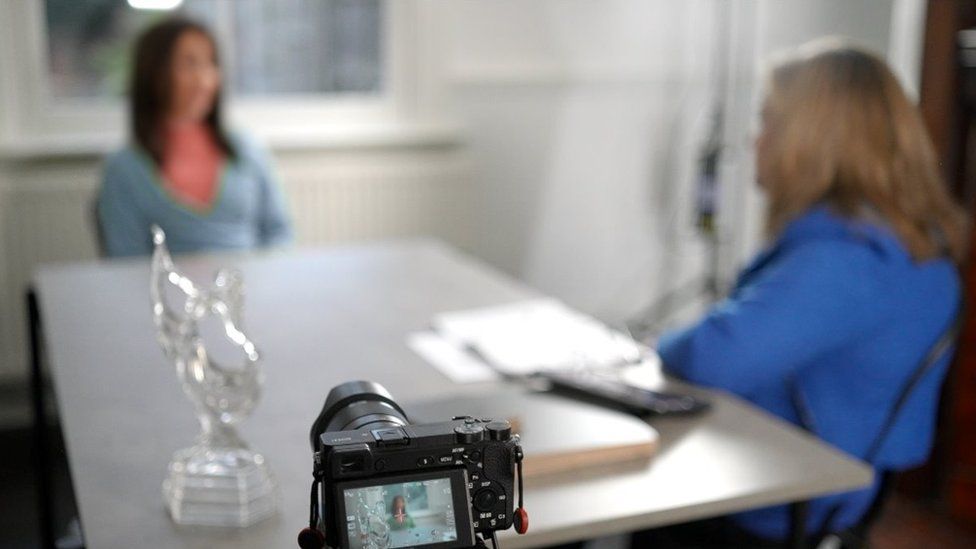
After speaking to Alice, the BBC contacted West Yorkshire Police. An officer has been suspended and the matter referred to the police watchdog, the Independent Office for Police Conduct.
“While we cannot comment further on this specific matter, we encourage anyone who is a victim of domestic abuse to contact us,” said a spokesperson for the force.
“Allegations are taken seriously, including allegations involving West Yorkshire Police officers and staff, and will always be fully investigated.”
- How are complaints against the police handled?
- How many violent attacks and sexual assaults on women are there?
- Violence against women: Top police role announced
The NPCC also looked at violence against women and girls generally during the six months to March 2022.
These figures show 447,431 recorded domestic abuse crimes and, overall, at least 507,827 crimes of violence against women and girls.
Similar to other crimes, only 6% of these resulted in charges, and domestic abuse survivors have told BBC News that support from police too often falls short.
https://flo.uri.sh/visualisation/13044361/embed?auto=1
The BBC spoke to women at a Resolute meeting. All were anonymous for their own safety.
One young woman said she had been covered in bruises on the chest and neck after her abuser tried to strangle her in the street.
A member of the public called the police, but support from officers was “very minimal”, she said.
“They didn’t even take me back home.”
“They have no compassion whatsoever,” said an older woman.
“They make you feel like it’s your fault for going with this person in the first place.”
A shortage of trained officers is a big problem, according to another. The first police officer the woman was allocated admitted that she had not been trained in dealing with domestic violence, but had been trained in firearms. The woman said it was “just horrendous”.
In another case, even contacting the investigating officer was a struggle.
“I found out in October who the officer was. I didn’t get any more contact from her until January. She didn’t respond to any of my messages.”
A spokesperson for South Yorkshire Police said the force was “continuously working” to improve its response to domestic abuse, listening to the views of victims and delivering specialist training to staff in direct contact with victims and perpetrators.
“Often victims live in fear behind closed doors and may find it difficult to come forward, which is why we’re committed to bringing those responsible to justice and supporting those affected,” said the statement.
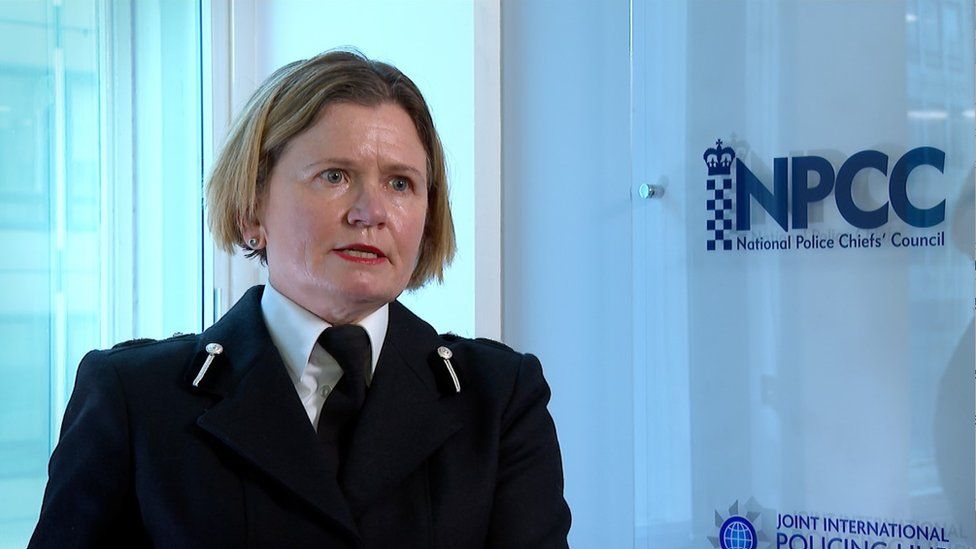
Responding to the overall figures on police investigations, Ms Blyth said forces should focus investigations “consistently on the behaviour of suspects” and improve the treatment of victims.
“We will only rebuild trust when the public and our staff see results and feel the impact of our actions,” she added.
If you or someone you know is experiencing abuse, you can call the freephone, 24-hour National Domestic Abuse Helpline, run by Refuge, on 0808 2000 247. A directory of other women’s support services is also available on the End Violence Against Women website.
Met Police: Nearly 15,000 allegations made against officers and staff – report
- Published
- 30 January
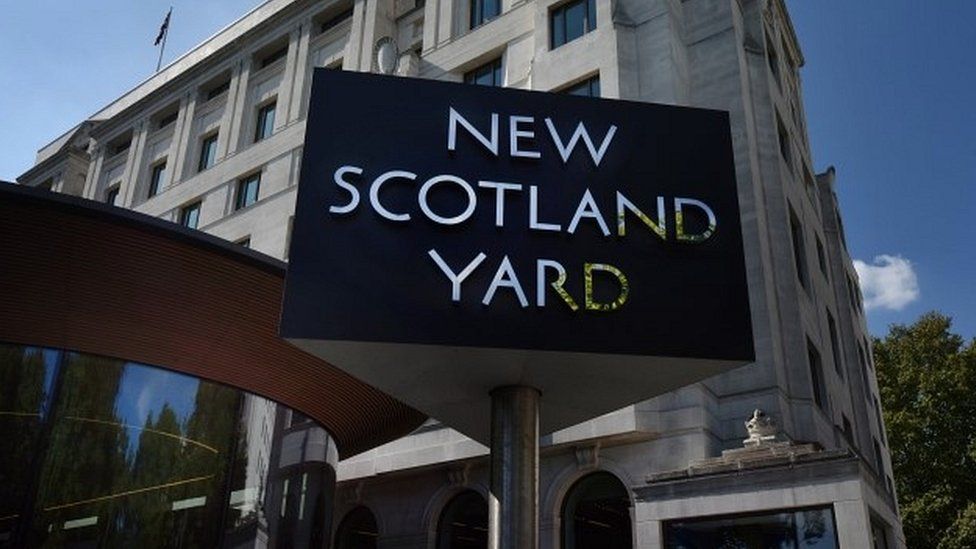
By Jess Warren
BBC News
Nearly 15,000 allegations were made about Met Police officers and staff last year, it has emerged.
They include allegations of racism, harassment, sexism and homophobia as well as sexual assault and excessive use of force.
Six in 10 referred to the Met’s “delivery of duties and service”.
The Met said the “vast majority” of complaints related to low-level conduct however it was “determined to root out those who corrupt” the force.
The data comes as serious questions have been raised over vetting, disciplinary and dismissal procedures within the force.
They were released following a written question to the Mayor of London, Sadiq Khan, by London Assembly member Unmesh Desai.
- Police trust ‘hanging by thread’ over Carrick case
- Mayor proposes £14.2m to rebuild Met Police trust
The 14,673 allegations were made from 10,200 complaints filed between 1 January and 9 December 2022.
Almost 1,000 related to individual officer actions ranging from “overbearing or harassing behaviours” to “unprofessional attitude and disrespect” and “impolite language/tone”.
There were 829 allegations for “use of force”, 398 for “discriminatory actions”, including 286 claims of racial discrimination and 34 allegations regarding “sexual conduct”.
Mr Desai, Labour’s Policing and Crime member, called for action to dispel the “growing distrust” in the Met.
‘Trust must be restored’
“Complaints need to be better handled; what constitutes misconduct and gross-misconduct must be reassessed and changes made regarding suspension and dismissal for the most serious allegations,” he said.
“Trust must be restored.”
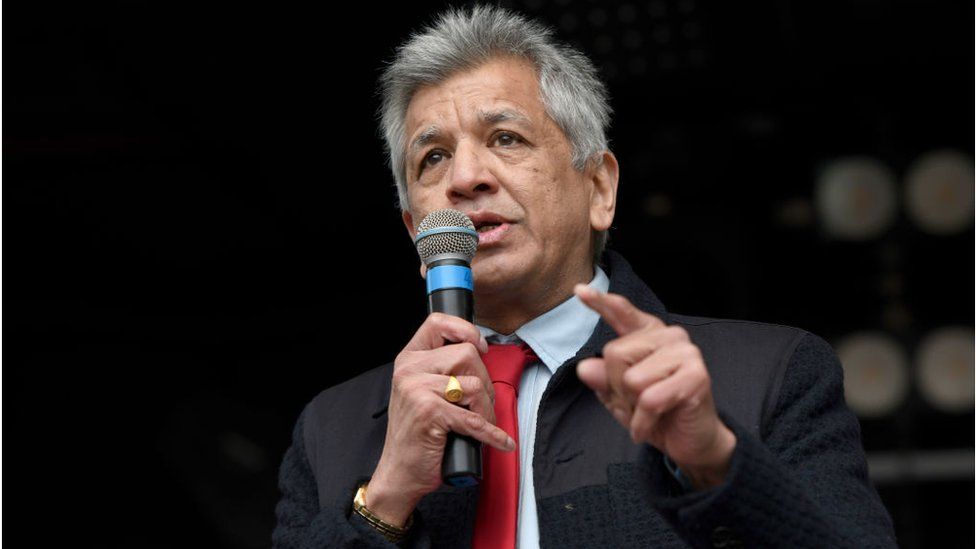
He called on the government to urgently introduce new Police Conduct Regulations.
“It is vital the police leadership have the powers needed to ensure that the system is effective in removing officers who are not fit to serve,” he said.
This month the Met faced revelations about serving and former officers, including PC David Carrick, who pleaded guilty to 49 offences, including 24 counts of rape.
Commissioner Sir Mark Rowley said in response that all 45,000 officers and staff would be rechecked for previously missed offending.
He has also raised concerns about dismissal procedures within the force.
Of the 1,809 Met staff who faced misconduct charges since 2013, 13 were dismissed.
At the London Assembly Police and Crime Committee on 25 January, Sir Mark revealed two to three criminal cases against officers were expected to go to court every week in the coming months.
A spokesperson for the Met said: “The vast majority of complaints received relate to low-level conduct issues which can be resolved to the satisfaction of the complainant without formal misconduct action being taken. However, we are aware some allegations do relate to serious offending.
“We are determined not only to root out those who corrupt the Met, but to do everything we can to ensure people have more confidence to report issues of misconduct and to know that when they come forward, action will be taken.”
In November, the force set up an Anti-Corruption and Abuse Hotline managed by independent charity Crimestoppers, the first of its kind.

Follow BBC London on Facebook, Twitter and Instagram. Send your story ideas to hellobbclondon@bbc.co.uk
Related Topics
- ‘Policing has taken a step back’ with Carrick case
- 16 January
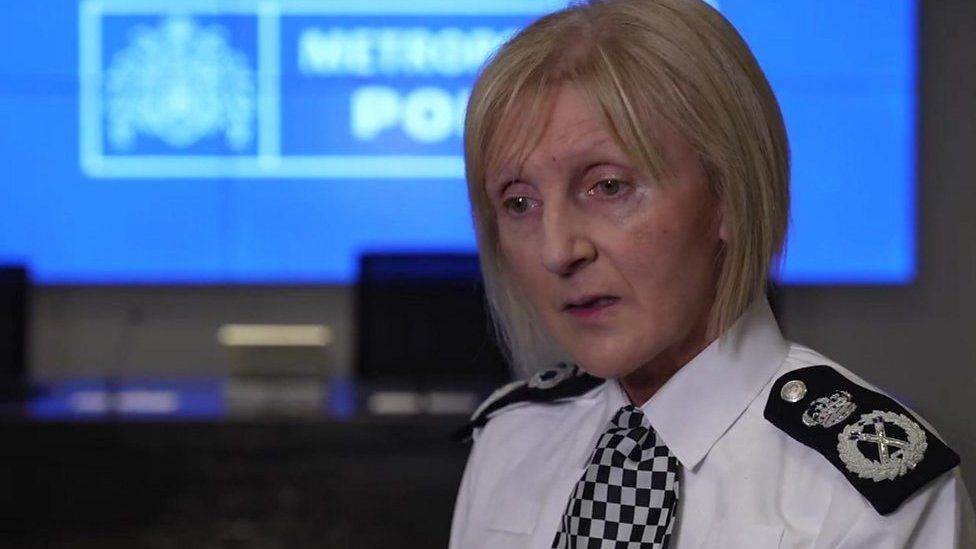
- We failed and let women down – Met Police chief
- 16 January
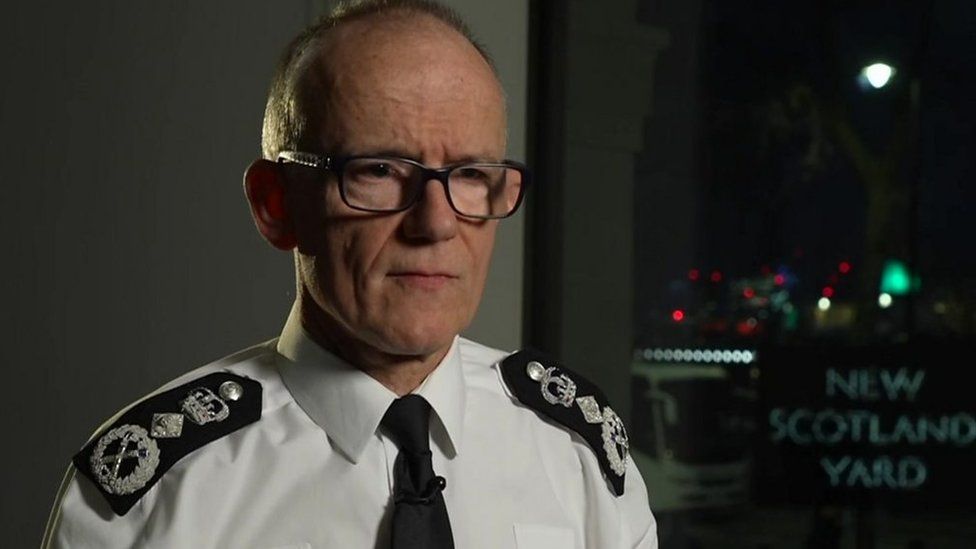
- Police trust ‘hanging by thread’ over Carrick case
- 19 January
March 13th 2023
Left R Always Right – R.J Cook.
Left R Always Right by R J Cook.
It was no surprise that Gary Lineaker has been welcomed back on board the BBC bourgeois bandwagon. He has been exonerated according to the very flexible corporation urgently rewritten code of conduct.
The issue arose from a Lineaker Tweet comparing the government’s proposed measures to recognise the bulk, if not all, cross Channel boat people for the very expensive economic migrants that they are – and to turn them around. He compared government policy to the NAZIS liquidating the Jews. He has pledged to go on speaking out.
Lineaker earns £1.35 million for 3 days a week over 9 months ‘work'(sic ) a year fronting a football show that got 500.000 more viewers last Saturday when he was banned from the airwaves, his overpaid ex footballing cronies supporting him in temporary exile.
Lineaker with his migrant vote hungry Labour Party and media cronies played the card that Lineaker can say what he likes because he is a private contractor – which he is in order to minimise his tax bill and £4.5 million Thames side mansion running costs.
It is the lower class taxpayers who suffer the bulk of a tax and price rising Country. This is along with massive impact on an already collapsing conflict ridden health and education service. The gender ,transgender and Ukraine Wars are wonderful distractions from this terrifying reality. If a BBC employee or contractor said anything like this on tweet, they would lose more than their job.
The reasons for the flood of economic migrants are basically down to the decades political corruption in post Imperial Africa and the Anglo U.S resource grabbing wars in the Middle East and Africa. This elite don’t want Russo- Chinese led economic development in these places. This is another driving force of the NATO proxy war on a Russia which was expected to play the western fake democracy planet eating game. They want a population of religion obsessed morons kept down by tyrants , like Mugabee, put in place to secure cheap crops , resources and labour.
Given this elite culture , ready to risk nuclear war with Russia, the logic of millionaire football pundit Lineaker’s twitter offering, is that the entire African and Middle Eastern population should be allowed in with all of its health, religious and other cultural issues – and the poorer native inhabitants will pay the price in every way imagineable.
Self styled liberals, worship high priests like Lineaker and Southgate, in a country so obsessed with football as the new religion, that girls are now obliged to play it at school as part of the herding and conditioning. These people claim the moral high ground giving the lie to the assertion that Britain is the home of independent media. R J Cook
Lineker to return to air as BBC announces review of guidelines
Summary
- Gary Lineker is to return to BBC screens this weekend after reaching a deal with the corporation
- The BBC will begin an independent review of its social media guidelines, focusing on how it applies to freelancers outside news – like Lineker
- Director General Tim Davie says he acknowledges the current guidance contains “grey areas”
- Lineker takes to Twitter to say he is “immeasurably proud” to work for the BBC and “cannot wait to get back in the MOTD chair”
- Davie says the Match of the Day presenter is a valued part of the BBC and he looks forward to his return
- More from Davie on impartiality and freedom of expression
- Here’s a bit more from what Director-General Tim Davie had to say in his statement about balancing the BBC’s commitments to both impartiality and freedom of expression.
- A reminder – he’s announced an independent review of the social media guidance.
- Article share tools
- Share this post
- Copy this link
- Read more about these links.
- Posted at 10:2010:20
- Starmer: BBC chair’s position increasingly untenable
Gary Lineker has said he will try to keep speaking up for people with “no voice”, after criticism of his tweets on the government’s asylum policy.
The Match of the Day host had said the language setting out the plan was “not dissimilar to that used by Germany in the 30s”.
Home Secretary Suella Braverman said she was disappointed by the remarks.
The BBC said it was having a “frank conversation” with Lineker about the BBC’s need to remain impartial.
On Tuesday, the government outlined its plans to ban people arriving in the UK illegally from ever claiming asylum, in a bid to address a rise in the number of people crossing the Channel in small boats.
Opposition MPs and humanitarian organisations have strongly criticised the proposals to detain and swiftly remove adults regardless of their asylum claim – but the PM and home secretary have defended the plan, saying stopping the crossings is a priority for the British people.
The presenter described it on Twitter as an “immeasurably cruel policy directed at the most vulnerable people in language not dissimilar to that used by Germany in the 30s”.
His remarks were criticised widely by Conservative MPs and ministers, including Ms Braverman and Downing Street.
The furore surrounding Lineker’s latest remarks puts pressure on the BBC, with director general Tim Davie having made impartiality a cornerstone of his leadership.
Responding to some of the criticism on Wednesday, Lineker tweeted: “Great to see the freedom of speech champions out in force this morning demanding silence from those with whom they disagree.”
He followed up shortly after with: “I have never known such love and support in my life than I’m getting this morning (England World Cup goals aside, possibly). I want to thank each and every one of you. It means a lot.
“I’ll continue to try and speak up for those poor souls that have no voice.”
Earlier, Ms Braverman told BBC One’s Breakfast she was “disappointed, obviously” in his comments.
“I think it’s unhelpful to compare our measures, which are lawful, proportionate and – indeed – compassionate, to 1930s Germany.
“I also think that we are on the side of the British people here.”
March 10th 2023
Fair Game by R.J Cook

Image copy right R J Cook Appledene Photographics 2010 Mass immigration is good for middle class self esteem,cheap labour, social control , diversity based divide & rule profit and rising prices.
Fair Game By R.J.Cook
Sports presenters are 10 a penny, yet last year Gary Lineker earned £1.3 million for one day a week for a 9 month football season . His known personal fortune is £29 million.Gary Lineker’s £4m riverside home in one of London’s most expensive boroughs is one of the BBC’s most high-profile presenters, His home is an affluent spot in Richmond near the River Thames He calls it home.
Following comparing the government’s latest efforts to stem the flow of so called asylum seekers who must not be tested, from the Islamic World and Africa , the self styled bourgoise lefties, media folk and others from the comfortable chattering classes have closed ranks to defend him.
There are many reasons to call Britain Nazi , but stemming the migrant flow which impacts on lower class tax payers is not one of them. It was the indifference of wealthy German Jews, during the 1920s and 30s ,that made all Jews a target for the German inter war Nazi Party. Lineaker sounds very similar in his outlook to the UK’s oppressed from the viewpoint of scapegoated white working class masses.
The Lineaker’s mainstream media supporters are too comortable and protected in their media mansions to care or even understand. NATO proxy war on Russia in ‘defence’ of Ukraine’s exceptionally corrupt Donbas abusing misnomered democracy , is a perfect distraction for dumbed down U.K masses to expand their slavish moronic footballing mentality into Ukraine. This menatlity is so grotesque that British State School girls , most of whom hate P.E, are to be forced into playing football . I comment as a former P.E teacher who has supervised girls’hockey.
I am also a former employee of U.K’s H.M Inspetor of Taxes and a tax specialist for a London West End accountant. So I know how the super rich avoid taxes. People like Likeaker and his media colleagues have no right to profer policitcal opinions. Teachers can be fired for preaching politics ,which is what Bucks Tory Council tried to do to me ,following my ‘Nuclear Winter’ BBC broacast in 1986. That is what should be done to Lineaker ,his equally overpaid supporters Ian Wright and Alan Shearer along with any other BBC employee who doesn’t accept that they are not paid to direct or redirect government policy. To accept their right to do that takes ever closer to real Nazism ,War and chaos.
Open door immigration is no sane solution to the chaos of religion obsessed dictatorial world of Afghanistan, Middle East and dictatorial socially stagnant Africa – from where such culturally disparite and disruptive expensive migrants flow. These peoples’ ancient cultural outlooks cannot be accommodated by the nonsense of multi culture – or covering up consequent migrant criminal brhsviour..
R J Cook
Gary Lineker told to step back from presenting Match of the Day

By Rachel Russell & Charley Adams
BBC News
Gary Lineker has been told to step back from presenting Match of the Day until an agreement is reached on his social media use, the BBC has said.
It follows an impartiality row over comments he made criticising the government’s new asylum policy.
The BBC said it considered Lineker’s “recent social media activity to be a breach of our guidelines”.
It added he should “keep well away from taking sides on party political issues or political controversies”.
- Follow live reaction as BBC says Lineker to step back from presenting
- Gary Lineker: Football star who became a Saturday TV fixture
- Why Lineker’s comments present problem for the BBC
- Stopping small boats is priority for people – PM
The BBC asked Lineker to step back after “extensive discussions with Gary and his team in recent days”.
It “decided that he will step back from presenting Match of the Day until we’ve got an agreed and clear position on his use of social media”, the statement said.
It continued: “When it comes to leading our football and sports coverage, Gary is second to none.
“We have never said that Gary should be an opinion free zone, or that he can’t have a view on issues that matter to him, but we have said that he should keep well away from taking sides on party political issues or political controversies.”
Fellow pundit Ian Wright said he will not appear in “solidarity”, tweeting: “Everybody knows what Match of the Day means to me, but I’ve told the BBC I won’t be doing it tomorrow. Solidarity.”
Alan Shearer, who also presents on the show, said he had “informed the BBC that I won’t be appearing on MOTD tomorrow night”.
Lineker has not yet publicly commented but while presenting 5News earlier, former BBC presenter Dan Walker read out a text live on air from the 62-year-old.
Walker said he had messaged Lineker asking: “What is happening. Are you stepping back?”
He said he had received a reply saying: “No, they’ve [the BBC] told me I have to step back.”
On Tuesday, Home Secretary Suella Braverman outlined the government’s plans to ban people arriving in the UK illegally from ever claiming asylum, in a bid to address a rise in the number of people crossing the Channel in small boats.
Lineker reacted to it on Twitter calling it an “immeasurably cruel policy directed at the most vulnerable people in language that is not dissimilar to that used by Germany in the 30s”.
Ms Braverman hit out at Lineker’s tweet, saying it “diminishes the unspeakable tragedy” of the Holocaust.
Speaking on the BBC’s Political Thinking podcast, the home secretary said the Nazi comparison was “lazy and unhelpful” and said her family “feel very keenly the impact of the Holocaust” as her husband is Jewish.
Many opposition MPs and charities also strongly objected to the government’s plans.
Prime Minister Rishi Sunak defended the proposals saying stopping the arrival of small boats is a “priority” for the British people.
Richard Ayre, former controller of editorial policy at the BBC, who also served as a member of Ofcom’s content board, said the corporation had “no choice” but to take action against Lineker after his tweets criticising the government’s asylum policy.
Speaking to BBC Radio 4’s PM programme on Friday afternoon, he said: “I think it was inevitable. He [Lineker] has the letters BBC written across his forehead and yet he’s plunged right into the most controversial story of the day.
“The fact is this was an immediate issue which Tim Davie, the director general, couldn’t sit on over the weekend, he had to solve it this week. He’s clearly tried to solve it and reach an agreement with Gary Lineker, they’ve failed, so this has been the BBC decision. Whether this story moves on depends on what Gary Lineker says himself in the next few hours.
“It’s inevitable now that having in effect not sacked him but removed him temporarily at least, the BBC will now come under a torrent of criticism saying it’s acting under the government’s behest.”
A Labour source told the BBC that the corporation should “rethink their decision”.
It said: “The BBC’s cowardly decision to take Gary Lineker off air is an assault on free speech in the face of political pressure.
“Tory politicians lobbying to get people sacked for disagreeing with government policies should be laughed at, not pandered to. The BBC should rethink their decision.”
Scotland’s First Minister Nicola Sturgeon called the BBC’s decision “indefensible”, as she wrote on Twitter: “As a strong supporter of public service broadcasting, I want to be able to defend the BBC. But the decision to take Gary Lineker off air is indefensible.
“It is undermining free speech in the face of political pressure – and it does always seem to be right-wing pressure it caves to.”
Lineker has hosted Match of the Day since 1999 and is the BBC’s highest paid star, having earned about £1.35m in 2020-21.
He is employed by the BBC on a freelance basis.
The ex-footballer has previously housed asylum seekers and publicly called for better rights and protections for refugees. He has also been critical of successive Conservative governments over issues including Brexit.
His comments have attracted widespread support on social media, with one tweet getting 235,000 likes.
| Will the new bill stop the boats? |
| While the government announced its latest legislation to tackle the crisis of illegal immigration into Britain via small boats, our team has been doing the rounds in the media. Will this finally be the moment that Britain takes control of its borders again? Is it ‘ra ra Rishi’ and ‘sock it to them Suella,’ or ‘oh no not again?’ The Home Secretary Suella Braverman, we know, is serious about securing the nation’s coastline and we do not doubt her commitment to border control. And it seems she has the Prime Minister’s support. The real question is whether the open border brigade and the bloated industry of NGOs, lawyers and celebrity luvvies can undermine the legal process and once again weaponise the Refugee Convention or ECHR. As our supporters well know, we’ve been here before. So why do we remain cautiously optimistic about this new bill? For the following reasons: It places a statutory requirement on the Home Secretary to detain illegal arrivals until they can be removed to their home country or another country where they can claim asylum It introduces longer time-limits for detention and fast tracks processing for illegal immigrants Those arriving in small boats or by any other illegal means will be barred from claiming asylum But there are potential obstacles that could still lead to the European Court of Human Rights holding up removals. Professor Richard Ekins explained in the Daily Telegraph on 9 March how the Bill “still permits substantive legal challenges, including human rights litigation, to continue outside the UK. If these claims eventually succeed, [our] courts might well order the Home Secretary to return the person to the UK.” The good news is that the government has time and there will be opportunities to plug the gaps as the bill progresses through parliament. Read Prof Ekins’s article here. Once on the statute book as an Act, the Opposition and House of Lords will do their utmost to block its passage. Will it work? Time will tell but this Bill is definitely a necessary step. And if it doesn’t work because of the ECHR, then it is time to pull out of the ECHR. Some might argue that this should have happened anyway. The Home Secretary herself has said Britain has been taken for a ride for too long. Enough is enough. And if the government fail yet again to solve this growing crisis, they will get their come-uppance at the ballot box. |
| What’s The News On Modern Slavery Abuse Among Asylum Seekers? In recent years, the amount of modern slavery claims being made by asylum seekers has risen substantially. In 2022, claims reached a high of 17,000 of which just a quarter were for sole UK nationals. Earlier this year, we published exclusive data linking the significant increase in modern slavery claims to the Channel crisis. This data had such an impact, that just a few weeks later the Immigration Minister, Robert Jenrick MP, promised to begin publishing this information regularly in the wake of our research. The first batch of that data came out in last week’s quarterly statistics release, and has now been followed up with a round-up of the data. Read our full blog here on this issue. |
| MIGRATION WATCH UK IN THE NEWS |
Mail Online: If Rishi Sunak and Sulla Braverman hold their nerve, this could finally be the turning point we need, writes Migration Watch boss ALP MEHMET This Bill, then, is a genuine chance for the Government at last to begin to put an end to the illegal-migration crisis — an issue that has been stoked for so long by the Left, the luvvies, the liberals and the ‘open borders’ fanatics. Telegraph: MPs and peers urged not to ‘neuter’ Illegal Migration Bill (please scroll down to 2.49pm) Alp Mehmet, chairman of the Migration Watch UK campaign group, urged MPs and peers not to “neuter” the Government’s new Illegal Migration Bill as he said it has “many of the right ingredients to solve the Channel crisis”. He said: “It is vital that it is not neutered as it makes its way through Parliament. Enshrining in statute a requirement to detain and remove illegal arrivals is a vital first step. “Furthermore, establishing the precedent that illegal entrants will be unable to claim asylum or other forms of refuge will serve as a powerful deterrent. “It is equally important, of course, to plug the huge gaps created by the Human Rights and Modern Slavery Acts. These are all essential elements if the tide of illegal boat arrivals is to be stemmed.” Talk TV: Our reaction to the government’s plan to ban asylum for illegal Channel migrants ‘If the government doesn’t get a grip, the numbers will go up, and likely to be anything up to 90-100,000 this year, and if they go up at that sort of rate, the numbers dying will also go up. And that’s what those who are dead set against all this should think about.’ Radio 5 Live: Will the government’s new asylum ban plan work? ‘When you are saying half a million people net coming here, over 1.3 million visas for long-term stay were issued at the same time last year, you have to take into account what that means for population growth, what that means for additional demands on services, on schools, and the rest of it.’ GB News: Will the government’s new asylum law stop the illegal crossings? ‘It’s the government who didn’t think of this, as one of the consequences of their inaction and and inability to actually control the boats.’ iNews: Why are people leaving Albania? How many UK asylum seekers are Albanian and if the country is safe Migration Watch chairman Alp Mehmet said at the time that Albanians “and their traffickers have identified a huge loophole in our legislation and are exploiting it to the hilt”. GB News: Will the government get its new asylum ban law through parliament? ‘If we are serious about stopping the boats, then something along these lines is absolutely essential.’ BBC: Will the government’s new law stop the boats? ‘Ultimately this is about addressing the demand for those traffickers. If you reduce the amount of people who are going to make these journeys all the way from the Middle East or Africa, or even various parts of Europe, then the smuggling gangs will have less customers.’ Al Jazeera: Those crossing the Channel illegally are coming from a safe country ‘If they are entering the UK having travelled directly from France or Belgium or the Netherlands or maybe other places, they are not fleeing a conflict zone, they are not coming from an unsafe place. They’ve passed through quite a few countries where they could have easily claimed asylum.’ GB News: Those crossing the Channel must be detained, assessed and removed ‘The returns agreement are the nub on which the entire policy lands, and if that fails, if there aren’t places where we can send all these illegal immigrants that the government is planning to detain, then it will all be for naught.’ The Sun: ‘APPALLING RACKET’ Criminal gangs using TikTok to sell £7k speedboat Channel crossings to desperate migrants ‘The actions of these people smugglers just show what the government is up against. ‘By travelling in bigger and sturdier boats, the worry is that they could arrive in the UK beyond the usual routes, making it even harder to detect.’ This story was also picked up by the Express here. BBC Scotland: Will the government’s new plan stop the boats? ‘It works in the long term by reducing the amount of people who try to make that journey.’ GB News: The Labour party doesn’t have a plan to stop the boats ‘The Labour Party seems to say “let’s tackle the gangs, and get the backlog down”, and that miraculously is going to stop people from coming over. It won’t, I mean it’s a nonsense frankly.’ |
| MAKE YOUR VOICE HEARD |
| Thank you to those who have written to their MP over mass immigration and the Channel crisis. It really has helped to get the government moving on border control. This new bill is a sign that leaders know the public will not tolerate more betrayals. If you haven’t done so already, please do write to your MP today. |
| We wouldn’t be able to continue this work without the help of our supporters. If you would like to donate, please click the button below. |
| Will the new bill stop the boats? |
| While the government announced its latest legislation to tackle the crisis of illegal immigration into Britain via small boats, our team has been doing the rounds in the media. Will this finally be the moment that Britain takes control of its borders again? Is it ‘ra ra Rishi’ and ‘sock it to them Suella,’ or ‘oh no not again?’ The Home Secretary Suella Braverman, we know, is serious about securing the nation’s coastline and we do not doubt her commitment to border control. And it seems she has the Prime Minister’s support. The real question is whether the open border brigade and the bloated industry of NGOs, lawyers and celebrity luvvies can undermine the legal process and once again weaponise the Refugee Convention or ECHR. As our supporters well know, we’ve been here before. So why do we remain cautiously optimistic about this new bill? For the following reasons: It places a statutory requirement on the Home Secretary to detain illegal arrivals until they can be removed to their home country or another country where they can claim asylum It introduces longer time-limits for detention and fast tracks processing for illegal immigrants Those arriving in small boats or by any other illegal means will be barred from claiming asylum But there are potential obstacles that could still lead to the European Court of Human Rights holding up removals. Professor Richard Ekins explained in the Daily Telegraph on 9 March how the Bill “still permits substantive legal challenges, including human rights litigation, to continue outside the UK. If these claims eventually succeed, [our] courts might well order the Home Secretary to return the person to the UK.” The good news is that the government has time and there will be opportunities to plug the gaps as the bill progresses through parliament. Read Prof Ekins’s article here. Once on the statute book as an Act, the Opposition and House of Lords will do their utmost to block its passage. Will it work? Time will tell but this Bill is definitely a necessary step. And if it doesn’t work because of the ECHR, then it is time to pull out of the ECHR. Some might argue that this should have happened anyway. The Home Secretary herself has said Britain has been taken for a ride for too long. Enough is enough. And if the government fail yet again to solve this growing crisis, they will get their come-uppance at the ballot box. |
| What’s The News On Modern Slavery Abuse Among Asylum Seekers? In recent years, the amount of modern slavery claims being made by asylum seekers has risen substantially. In 2022, claims reached a high of 17,000 of which just a quarter were for sole UK nationals. Earlier this year, we published exclusive data linking the significant increase in modern slavery claims to the Channel crisis. This data had such an impact, that just a few weeks later the Immigration Minister, Robert Jenrick MP, promised to begin publishing this information regularly in the wake of our research. The first batch of that data came out in last week’s quarterly statistics release, and has now been followed up with a round-up of the data. Read our full blog here on this issue. |
| MIGRATION WATCH UK IN THE NEWS |
Mail Online: If Rishi Sunak and Sulla Braverman hold their nerve, this could finally be the turning point we need, writes Migration Watch boss ALP MEHMET This Bill, then, is a genuine chance for the Government at last to begin to put an end to the illegal-migration crisis — an issue that has been stoked for so long by the Left, the luvvies, the liberals and the ‘open borders’ fanatics. Telegraph: MPs and peers urged not to ‘neuter’ Illegal Migration Bill (please scroll down to 2.49pm) Alp Mehmet, chairman of the Migration Watch UK campaign group, urged MPs and peers not to “neuter” the Government’s new Illegal Migration Bill as he said it has “many of the right ingredients to solve the Channel crisis”. He said: “It is vital that it is not neutered as it makes its way through Parliament. Enshrining in statute a requirement to detain and remove illegal arrivals is a vital first step. “Furthermore, establishing the precedent that illegal entrants will be unable to claim asylum or other forms of refuge will serve as a powerful deterrent. “It is equally important, of course, to plug the huge gaps created by the Human Rights and Modern Slavery Acts. These are all essential elements if the tide of illegal boat arrivals is to be stemmed.” Talk TV: Our reaction to the government’s plan to ban asylum for illegal Channel migrants ‘If the government doesn’t get a grip, the numbers will go up, and likely to be anything up to 90-100,000 this year, and if they go up at that sort of rate, the numbers dying will also go up. And that’s what those who are dead set against all this should think about.’ Radio 5 Live: Will the government’s new asylum ban plan work? ‘When you are saying half a million people net coming here, over 1.3 million visas for long-term stay were issued at the same time last year, you have to take into account what that means for population growth, what that means for additional demands on services, on schools, and the rest of it.’ GB News: Will the government’s new asylum law stop the illegal crossings? ‘It’s the government who didn’t think of this, as one of the consequences of their inaction and and inability to actually control the boats.’ iNews: Why are people leaving Albania? How many UK asylum seekers are Albanian and if the country is safe Migration Watch chairman Alp Mehmet said at the time that Albanians “and their traffickers have identified a huge loophole in our legislation and are exploiting it to the hilt”. GB News: Will the government get its new asylum ban law through parliament? ‘If we are serious about stopping the boats, then something along these lines is absolutely essential.’ BBC: Will the government’s new law stop the boats? ‘Ultimately this is about addressing the demand for those traffickers. If you reduce the amount of people who are going to make these journeys all the way from the Middle East or Africa, or even various parts of Europe, then the smuggling gangs will have less customers.’ Al Jazeera: Those crossing the Channel illegally are coming from a safe country ‘If they are entering the UK having travelled directly from France or Belgium or the Netherlands or maybe other places, they are not fleeing a conflict zone, they are not coming from an unsafe place. They’ve passed through quite a few countries where they could have easily claimed asylum.’ GB News: Those crossing the Channel must be detained, assessed and removed ‘The returns agreement are the nub on which the entire policy lands, and if that fails, if there aren’t places where we can send all these illegal immigrants that the government is planning to detain, then it will all be for naught.’ The Sun: ‘APPALLING RACKET’ Criminal gangs using TikTok to sell £7k speedboat Channel crossings to desperate migrants ‘The actions of these people smugglers just show what the government is up against. ‘By travelling in bigger and sturdier boats, the worry is that they could arrive in the UK beyond the usual routes, making it even harder to detect.’ This story was also picked up by the Express here. BBC Scotland: Will the government’s new plan stop the boats? ‘It works in the long term by reducing the amount of people who try to make that journey.’ GB News: The Labour party doesn’t have a plan to stop the boats ‘The Labour Party seems to say “let’s tackle the gangs, and get the backlog down”, and that miraculously is going to stop people from coming over. It won’t, I mean it’s a nonsense frankly.’ |
| MAKE YOUR VOICE HEARD |
| Thank you to those who have written to their MP over mass immigration and the Channel crisis. It really has helped to get the government moving on border control. This new bill is a sign that leaders know the public will not tolerate more betrayals. If you haven’t done so already, please do write to your MP today. |
| We wouldn’t be able to continue this work without the help of our supporters. If you would like to donate, please click the button below. |
March 9th 2023
Gary Lineker says he does not fear BBC suspension over asylum policy tweet
By Charley Adams
BBC News
Gary Lineker has said he does not fear BBC suspension in an impartiality row over a tweet criticising the government’s asylum policy.
Asked by reporters outside his home whether he stood by his tweet, the Match of the Day host said: “Course”.
Lineker had compared the language the government used to set out asylum plans to “that used by Germany in the 30s”.
The culture secretary said the presenter’s tweets were “disappointing and inappropriate”.
Lucy Frazer said it was “important for the BBC to retain impartiality if it is to retain the trust of the public who pay the licence fee”.
The BBC said on Wednesday it was having a “frank conversation” with Lineker about the BBC’s guidelines on remaining impartial.
Lineker was asked by a group of reporters outside his London home on Thursday whether he feared “getting suspended” and he answered: “No.”
The corporation’s former editorial policy controller Richard Ayre said the presenter had a choice to make over his role at the BBC.
He said Lineker must consider whether to stay or to leave and “become a social media influencer”.
On Tuesday, the government outlined its plans to ban people arriving in the UK illegally from ever claiming asylum, in a bid to address a rise in the number of people crossing the Channel in small boats.
Opposition MPs and charities have strongly objected to the proposals, but the PM and home secretary have defended the plan, saying stopping the crossings is a priority for the British people.
Responding to some of the criticism on Wednesday, Lineker tweeted: “I’ll continue to try and speak up for those poor souls that have no choice.”
Lineker, 62, who has presented Match of the Day since 1999 also works for LaLiga TV.
Responding to a question in the Commons Ms Frazer said: “As somebody whose grandmother escaped Nazi Germany in the 1930s I think it’s really disappointing and inappropriate to compare government policy on immigration events to events in Germany in the 1930s.
“The BBC is operationally independent and I’m pleased the BBC will be speaking to Gary Lineker to remind him of his responsibilities in relation to social media.”
Former culture secretary Sir John Whittingdale said the BBC’s requirement to be politically impartial should cover “all those who are presenters on the BBC” and urged ministers to ensure the mid-term review of the BBC’s charter would “cover enforcement of this rule on freelancers as well as full-time employees”.
Mr Ayre, a former member of the broadcasting regulator Ofcom’s content board, said it was “unacceptable” to have someone who works for the BBC “comparing Suella Braverman to the third Reich”.
March 8th 2023
| We want tightly controlled borders and much less immigration. The elites want the opposite |
| Another week, another story of a preventable attack from a vicious killer who should not have been allowed into the country. Just six months after he dodged deportation because of last-minute human rights claims (supported by Opposition politicians and virtue-signalling luvvies) Ernesto Elliott murdered a 35-year-old man with a knife in a violent, bloody attack. Meanwhile, the Prime Minister is going to have yet another go at putting in place the right legislation (where have we heard that before?) in an effort to shore up our wide open borders. Fact is, it isn’t only inadequate laws and resources or the obsolescent and unfit for purpose ECHR and Refugee Convention that are to blame for the Channel crisis. At the root of the problem is a failure to foresee the consequences of weak and ineffectual action and a total incomprehension of what drives illegal immigration. This all has to change if the problem of illegality and a porous border is to be solved. All the while, murderers like Langaween Abdulrahimzai and Ernesto Elliott are left to run amok among law abiding citizens, as our streets, green spaces and fragile services buckle under the punishing pressure of a population explosion driven entirely by mass migration (See our research on this here). The simple fact is the majority of us want tight borders and much lower immigration levels while the elites deride such notions, treating them with contempt. |
| Deportation Of Murderers Plummets In Midst Of Flurry Of Human Rights Challenges Collapsing enforcement, border chaos and plummeting removals of those who shouldn’t be here all threaten the safety of men, women and children in the UK. In the midst of huge abuse of human rights law, it seems our government and responsible authorities are incapable of removing high-harm individuals. According to the latest official data removals of the highest harm immigration offenders and foreign criminals have fallen from 2,200 to fewer than 1,000 in the past decade. Read our full blog here. |
| MIGRATION WATCH UK IN THE NEWS |
Talk TV: What should we do with Albanian asylum seekers? ‘Who from Albania should qualify for asylum for goodness sake?’ Telegraph: Britain’s immigration system is in a panicky state of collapse According to Migration Watch, in 2021 the UK’s asylum grant rate at the initial decision stage was almost three times that of France. (The UK accepted 72 per cent compared with France’s 25 per cent.) The UK grant rate is now a “permissive outlier” compared to most of Europe. We are, for example, much more generous than the cuddly EU (37 per cent acceptance for initial applications; less than half of what the UK takes) although, as everyone outside Whitehall has noticed, our public services cannot cope. Express: Government calls time on asylum ‘gravy train’ with crackdown on £40m migrant lawyers ‘Those who force their way into Britain, having paid colossal sums to crooks to get them here, can challenge in the courts any decision to deny them asylum or to remove them. ‘Their lawyer, who doubtless urges them down the legal path, is rewarded, while the asylum seeker is accommodated and maintained throughout. ‘And the entire cost is borne by the taxpayer. Is it any wonder that the hard-pressed public are angry?’ |
| MAKE YOUR VOICE HEARD |
| Regrettably, the delayed legislation that is soon to be placed before parliament is not going to have much impact on the numbers crossing the Channel in small boats, and even less on ballooning legal immigration. However, the introduction of this legislation does also suggest that the political class are only too aware of the looming general election and how the court of public opinion will judge them. They have good reason to be worried.. We have long come to expect spin and deception from ruling elites. For over twenty years, Migration Watch has sought to pick through the mountain of immigration data and obfuscation of the facts. We have repeatedly called out government, parliamentary and official failings with patient and sustained campaigning. We have shone a light on the facts and we will continue to do this with your help. Write to your MP today and join us in holding the elites to account. |
| We wouldn’t be able to continue this work without the help of our supporters. If you would like to donate, please click the button below. Our supporters are all as concerned about the future of our country as we are. Some have been kind enough to remember us in their will. If you wish to consider leaving a bequest to Migration Watch UK, or wish to discuss anything else, do please get in touch. Our email is: admin@migrationwatchuk.org |
The Everyday People Spreading Political Propaganda Online for Fun and/or Profit
Feb 27, 20239:00 AM

The following is adapted from Manufacturing Consensus: Understanding Propaganda in the Era of Automation and Anonymity, by Samuel Woolley, just published by Yale University Press. Copyright © 2023 Yale University Press. Reprinted by permission of Yale University Press.
If you met D.W., a small business owner living in a city in the United Kingdom, you wouldn’t think he masterminded sophisticated computational propaganda campaigns out of his small apartment’s living room. But he runs hordes of bot and sockpuppet accounts across several social media platforms, making him what I call an “automated political influencer.” He’s just one of many regular folks who hold down a range of normal-seeming day jobs while running fairly complex influence campaigns on their own time.
Most of the automated political influencers I’ve met do their work without any direction or support from a political campaign or government. They do it simply because they want to—because they believe in the causes, politics, and viewpoints they are spreading, and they want to give them a wider currency. Of course, there are some individuals that receive some government support for this type of work; for example, citizens in Venezuela who spread pro-government Twitter propaganda receive small payments or vouchers from the state. But this is not the case for the automated influencers working across the world to achieve their own offbeat political goals.
Advertisement
The people I am concerned with represent a phenomenon fairly singular to the present day: For the first time, technology allows everyday people to run propaganda operations at scale without much coding knowledge or financial outlay. Easily available consumer-level technologies—the internet, various automation tools like “If This, Then That” (IFTTT), and increasingly approachable coding languages like Python (which my interviewees regularly mentioned as their go-to language for bot creation)—now allow propaganda to be created and spread by the mom next door, your dad’s fishing buddy, or that nice clerk at the hardware store. These individual propagandists range in age, from teenagers to retirees. The only prerequisites are that they have access to a computer, an interest in politics, and a rudimentary education (they are most often self-taught) in social media marketing.
D.W. told me that he used both social media bots, sockpuppet accounts, and other forms of bots for a variety of purposes. He viewed his use of online automation as a form of political dissent, as activism. He first started “playing around” with bots when he became unemployed. In the U.K., if you are unemployed, you can receive a job seeker’s allowance, but you must be actively applying for jobs. D.W. wrote a piece of code to automate job applications for him so that he could get his stipend. According to him, the terms and conditions of the government website did not prohibit automating the process, and to him this was a form of protest—an exercise that “expose[d] the horrible bureaucracy that people get caught up in for being poor.” Later, he began building social media bots to spread messages of support for Jeremy Corbin and the U.K. Labour Party. D.W. experimented with different personalities for these political bots: some used humor, some were sincere, others were sarcastic or passive. His goal, he said, was to figure out which one got people to actually engage. He was after behavioral change.
Advertisement
D.W. does most of what he does for political reasons, because he is individuallyinvested in politics. Other individual automated political influencers work for money. These influencers are not being paid in the same way as the villagers in Venezuela—getting cents on the dollar from the government for tweets. Many of the automated political influencers I spoke to in this category saw their bot-building as a freelance business. Many offered their services via websites like Fiverr, an Israeli-based online marketplace where people bid rock-bottom prices for online services; this subset of influencers sold or rented social media bots for small amounts of money.
Other freelance bot builders used social media bots to bring in ad revenue by driving attention to their own social media profiles or websites. Still others had large, sophisticated operations, renting out entire social media botnets to anyone with money. They are generally mercenary in their approach, working for groups with a range of political leanings—as long as they pay. A teammate of mine at Oxford spoke to the proprietor of one such operation in Poland, who said he maintained over 40,000 unique online identities that he rented out for “guerilla marketing” purposes to various political and commercial entities. His accounts—cyborg accounts that used both automation and human oversight—could be launched to talk up particular products or companies in a way that seemed organic. As he openly admitted during the interview, he had also rented his accounts out for political purposes during national and European Union–wide electoral campaigns.
Advertisement
Most of these individual digital propagandists’ bot accounts take advantage of online anonymity (although some—especially those seeking ad revenue—did automate social media profiles that used their real names). They all depend to some degree on bots, sockpuppets, or other automated features of the web, including trending and recommendation algorithms. And definitionally, they all engaged in at least some inherently political work. The influencers I sought out and spoke to are not those who use bots simply to sell regular commercial products (though some do that too): the people I am talking about here are all using digital tools to sell political ideas.
There has been a recent shift in how automated political influencers (and even organic, nonautomated political influencers) operate. Political campaigns and other elite actor groups have taken notice of influencers who are interested in politics—both celebrity and small-scale. Members of my research team and I documented our research in Wired into the rise of the latter group—what we called the partisan nanoinfluencer in politics.
These nanoinfluencers, who generally have a following of 5,000 or fewer, are now being recruited and paid by political campaigns and other groups to spread particular types of content during elections. According to the digital political marketers we have spoken to, the logic is that these regular people have more intimate, local connections with their followers, and because of this their messages hit harder. (This is the same principle I’ve seen used for WhatsApp propaganda campaigns: that we are more likely to believe and act on information we hear from a trusted source with whom we feel a personal connection.) According to our own experience and that of other researchers, it’s likely that some of these influencers—both celebrity influencers and “regular” nanoinfluencers—use social bots to achieve their goals.
In many ways, the use of paid influencers is a logical step for propagandists working online. Human-run accounts are, after all, more difficult for platforms to justifiably delete than bots or sockpuppets. It can be hard, put another way, for entities like Meta, Twitter, and Alphabet to judge such activity as coordinated inauthentic behavior, which would be grounds for suspension or deletion.

Manufacturing Consensus: Understanding Propaganda in the Era of Automation and Anonymity
By Samuel Woolley
Asylum plan ‘very concerning’ and would break international law – UN refugee agency
- Published
- 2 hours ago

By Christy Cooney
BBC News
The government’s proposed asylum law is “very concerning” and would block even those with a compelling claim, the United Nations refugee agency has said.
The UNHCR’s representative to the UK, Vicky Tennant, told the BBC the measure would break international law and was not needed to stop Channel crossings.
Prime Minister Rishi Sunak has said he is “up for the fight” to bring in the law and overcome any legal challenges.
Labour has said the plans risk “making the chaos worse”.
On Tuesday, the government outlined a new law which would effectively ban anyone who arrives via an illegal route from claiming asylum in the UK.
Anyone found to have entered the country illegally will also be blocked from returning or claiming British citizenship in future.
The measure is part of attempts to address an increase in the number of people arriving in the UK via Channel crossings each year, which rose from around 300 in 2018 to more than 45,000 in 2022.
Asked for her reaction to the plans on the BBC’s Newsnight, Ms Tennant said: “We’re very concerned. This is effectively closing off access to asylum in the UK for people arriving irregularly.
“We believe it’s a clear breach of the Refugee Convention, and remember even people with very compelling claims will simply not have the opportunity to put these forward.”
The Refugee Convention, first agreed in 1951, is a multilateral treaty that sets out who qualifies as a refugee and the obligations of signatory states to protect them.
Ms Tennant said that the UK has a “longstanding humanitarian tradition” and that issues with migration could be addressed with proper controls and a better-administered system.
“Get the asylum system working,” she said. “Get fair, efficient, faster asylum processing happening.
“If people aren’t entitled to asylum send them back to their own countries and if they are then allow them to integrate and move that process on much more quickly.”
- Sunak says he is up for the fight on migrant boats
- Plan for Channel migrants ban unworkable – charity
- How is the UK stopping Channel crossings?
Also speaking to Newsnight, Conservative MP Richard Graham said the government’s policy should be judged on whether it is implemented with “determination, compassion, and proportion”.
Read More https://www.bbc.co.uk/news/uk-politics-64884435
March 7th 2023
Power Blackout Survival Tips From Around the World
Kim HarrisbergAxelle RescourioTala RamadanContext
Barry Malone: “At times like this, we have to stick together. And what sort of solidarity is better than global solidarity? For this piece, Context tapped correspondents in Johannesburg, Beirut, Mutare, Lagos, New Delhi and London to put together a series of tips on how to survive without electricity. As blackouts and power shedding become more common around the world, maybe this is one for your bookmarks.”
Surviving the Cost of Living: Sophia and Chris [LISTEN]
BM: “I absolutely love the idea for this podcast series from the BBC. They get people from different generations around a table to discuss surviving the crisis. Can young people today learn from those who managed to scrape through previous crises in the 80s and 90s? Give the episode with Sophia and Chris a listen.”
From our partners
Zambia’s Economic Storm Eases but Poor Still Feel the Pain
Zanji SinkalaContext
BM: “At times like this, you often hear middle class people moaning that the price of coffee has gone up or that they can’t go out to restaurants anymore. But nobody is suffering more than people who were already suffering. This piece talks to some of the most disadvantaged people in Zambia about how their lives have changed since the crisis began.”

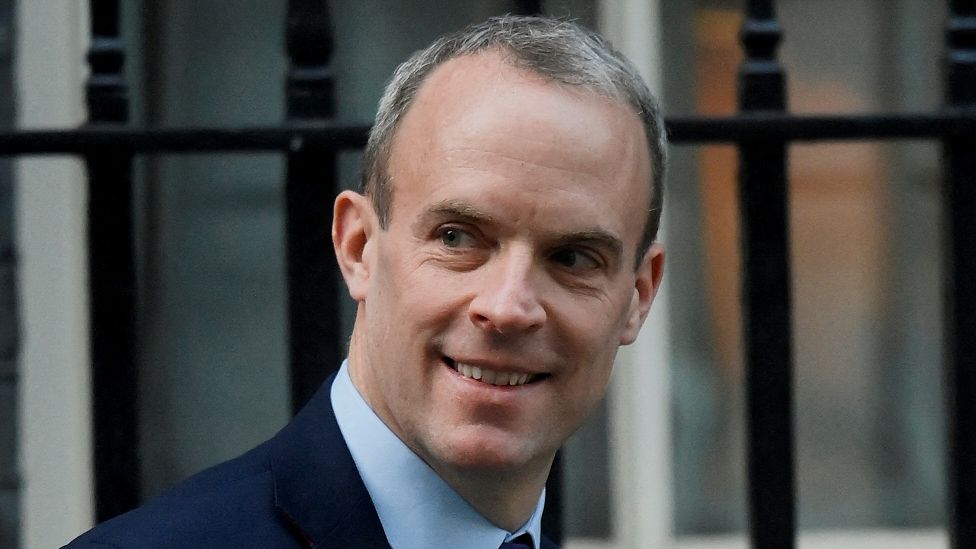
 BBCCopyright: BBCChild sexual exploitationWhen it came to new laws on child sex exploitation, there was some agreement between the two.Under new government plans, people who work with children in England
BBCCopyright: BBCChild sexual exploitationWhen it came to new laws on child sex exploitation, there was some agreement between the two.Under new government plans, people who work with children in England 
Be the first to comment on "Death After Life & Police State Britain – 1"